








Albertsons Cos. may not be the obvious choice for our 2018 West Retailer of the Year honor, as the Boise, Idaho-based grocer has been going through the painstaking integration process with Safeway for the past three and a half years, which has been “a distraction,” according to Chairman Robert G. “Bob” Miller.
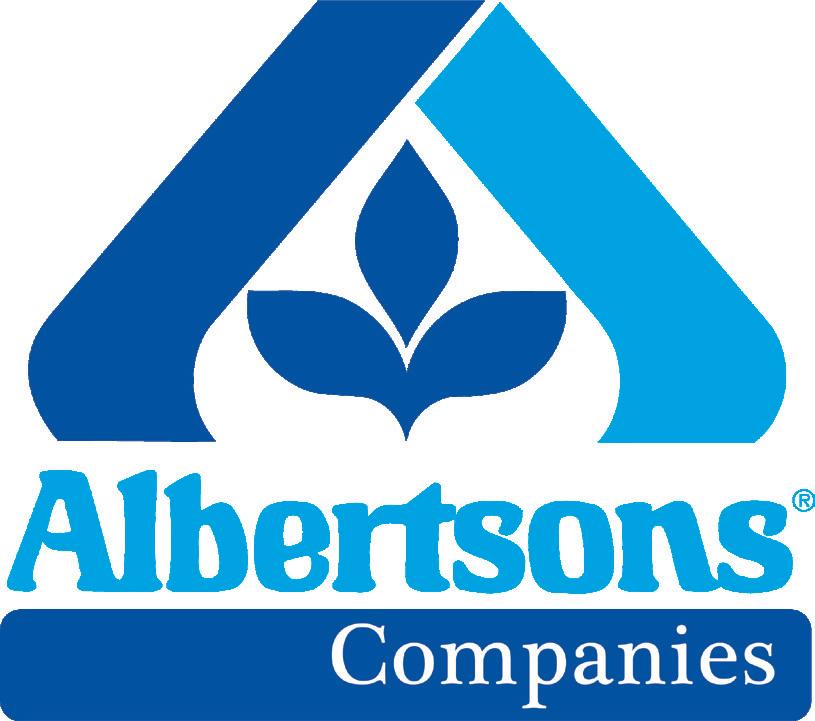
But that process was completed in September 2018, the same month that President and COO Jim Donald became president and CEO, succeeding Miller in the CEO role. Donald said the completion of the integration “will allow our operators to relentlessly focus on running great stores.”
As of September, those stores totaled 2,291 in 35 states and the District of Columbia under 20 banners, including Albertsons, Safeway, Vons, JewelOsco, Shaw’s, Acme, Tom Thumb, Randalls, United Supermarkets, Pavilions, Star Market, Haggen and Carrs. It also owns meal kit company Plated.
Miller tells The Shelby Report that the company is healthy, and it’s going to continue to grow.
“We have generations that have shopped with these brands. We want to continue to invest in them, make them better and take care of customers— and we have the opportunity to do that.
“I couldn’t be more excited about what’s going to happen going forward,” adds Miller, who has overseen the company’s growth since 2006, from a low of about 200 stores to today’s nearly 2,300.
His fellow Albertsons executives believe that Miller has a lot to do with the company’s success today as well as its trajectory. See what they have to say about his simple but effective management style and why we have added him to our Food Industry Hall of Fame.
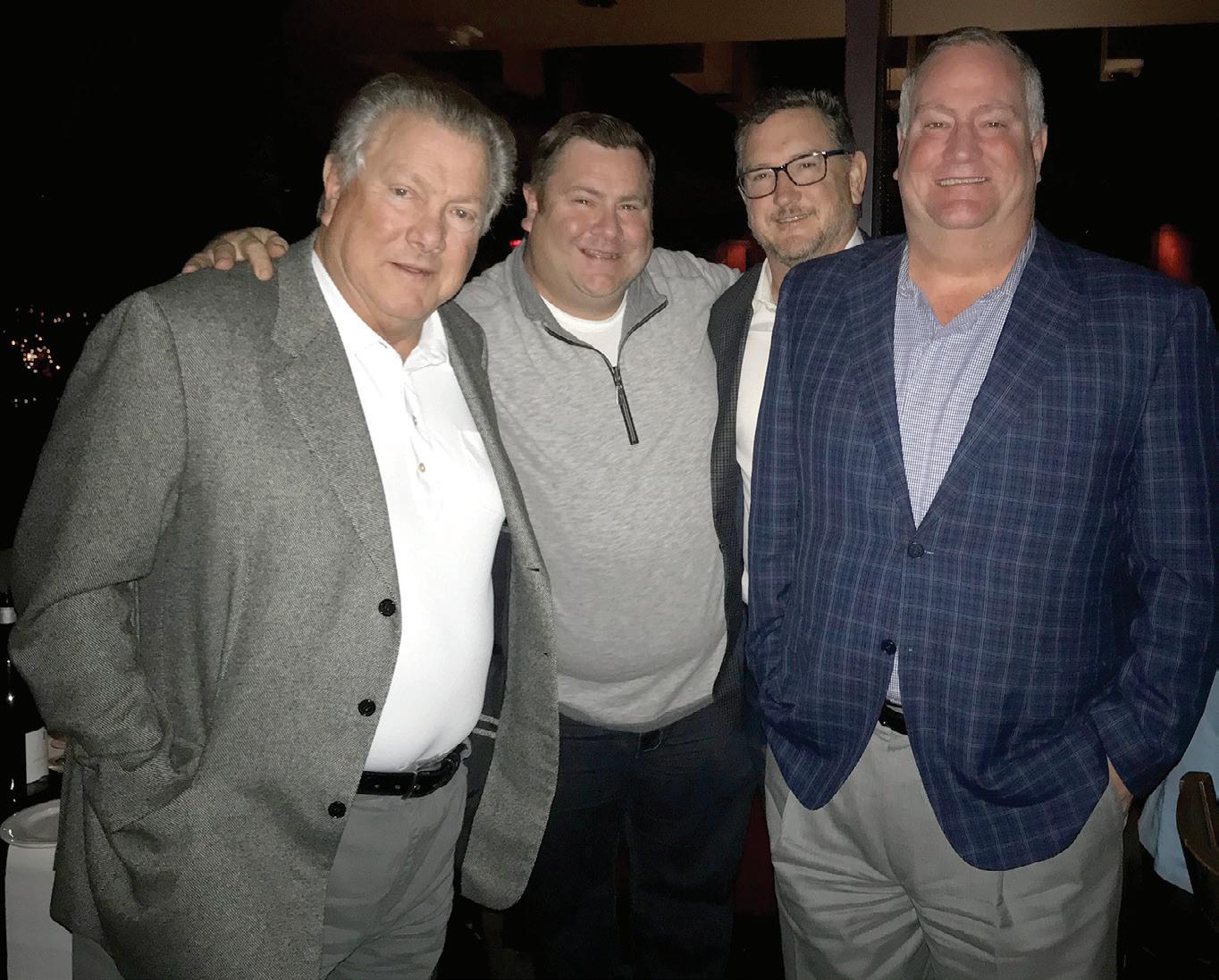
Albertsons Cos. Chairman Bob Miller has four pillars he lives by:
1. Work hard.
2. Tell the truth—that’s how your reputation is built.
3. Treat people right—as you want to be treated.
4. Believe in others—they will help you be successful. “And passion ties it all together,” he says. That’s how Miller lives, and it’s something he shared with Boise State University students in the spring of
2018, when he received his honorary doctorate of humane letters during graduation ceremonies. Neither he nor his wife Sharon finished college, but all three of their sons did, each earning a master’s degree. All three have successful business careers today.
The Miller family continues to endow scholarships at Boise State, something Miller began in 2012 when he was the recipient of the Horatio Alger Award.
The late Jack Brown of Stater Bros. also was a recipient of the Horatio Alger Award. The two were friends and sometimes competitors. But Brown’s philosophy—do the right thing for the right reason—certainly resonated with Miller and is reflected in his pillars.
Miller started his career in 1961 as a bottle sorter at an Albertsons store in Southern California in order to have a little spending money and be able to continue to play sports, too. Although he did attend college for a time, he didn’t finish because he kept being promoted, he says.
By 1979, Miller was in the management training program at Albertsons and, by 1988, he was named an EVP of the company. When he didn’t see a path to the top executive spot in his near future, he left Albertsons in 1991 to become CEO of Portland, Oregon-based Fred Meyer. He served in that role until
1999, when Kroger purchased Fred Meyer. He was COO of Kroger from May-December 1999, when he became CEO of Rite Aid, where he stayed until June 2003. He then served as non-executive chairman of Wild Oats Markets from December 2004 until May 2006.
What he has done upon his return to Albertsons, later in 2006, is nothing short of amazing. At that time, he was tapped by Cerberus Capital Management to lead Albertsons LLC, the holding company for the 655 underperforming Albertsons stores Cerberus purchased (Supervalu purchased more than 1,100 “premier” store locations). Miller had been involved in the opening of many of the stores that were parceled out to the buyers.
Eventually, Albertsons LLC’s store count was whittled down to less than 200.
In 2013, Supervalu was ready to sell 877 stores back to Albertsons.
With the 2015 purchase of Safeway, Albertsons operated 2,230 stores.
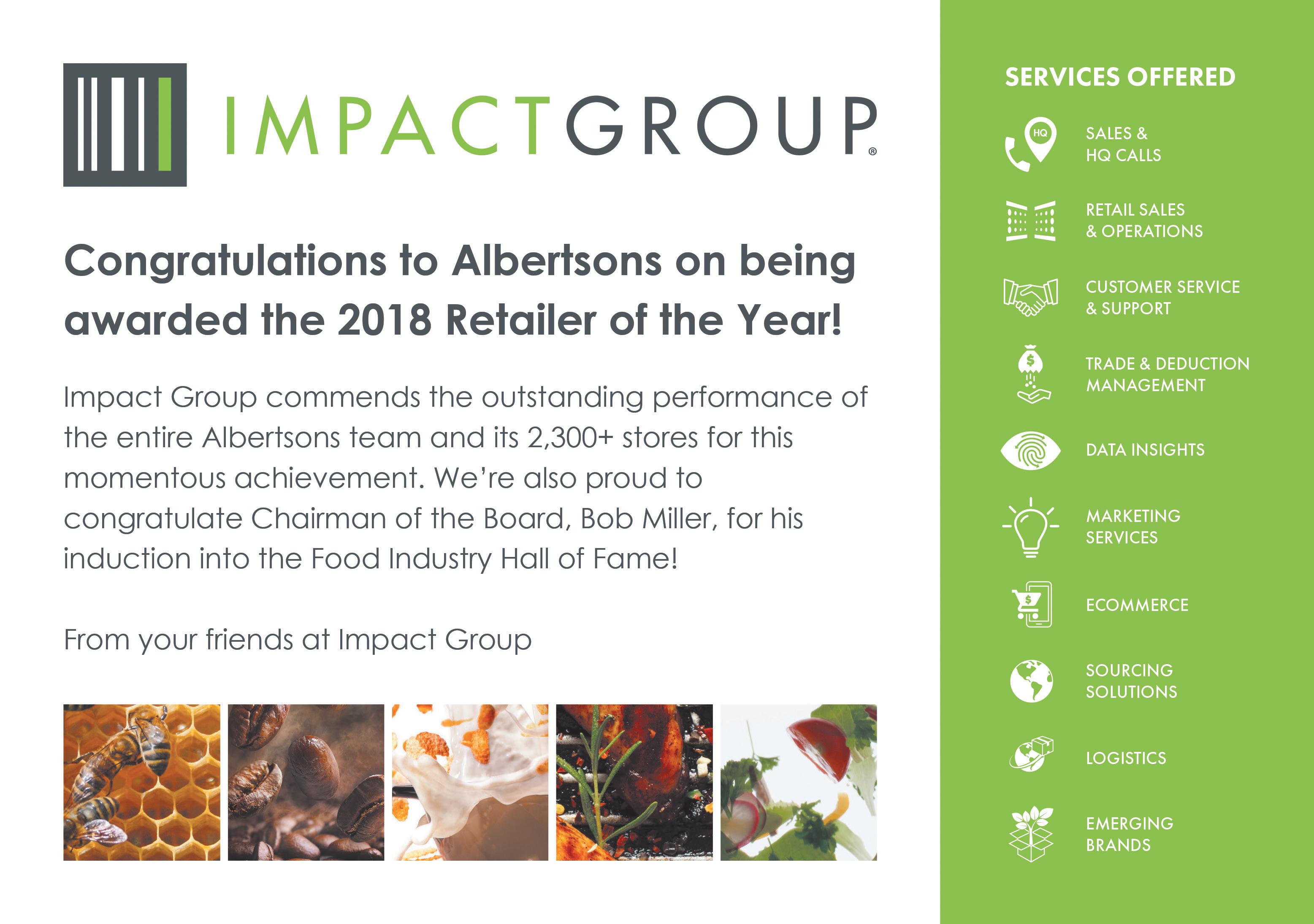
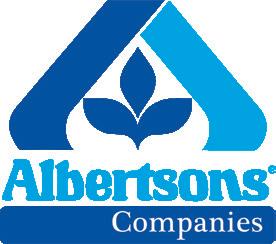
Today, Albertsons Cos. operates nearly 2,300 stores. And 57 years after he started sorting bottles in the back room of a grocery store, Miller continues to have passion for the business, for customers, for team members, for his community, for his family. His colleagues at Albertsons describe him as being a great leader, listener, innovator and human being. For these reasons and more, we are proud to induct Robert G. Miller to our Food Industry Hall of Fame.
Following are excerpts from an interview with Bob Miller that was conducted at Albertsons headquarters in Boise by The Shelby Report’s VP-West Bob Reeves.

Bob Reeves: Tell me about your early life.
Bob Miller: I was born in Mississippi, where my mom grew up. My father was overseas in the service when I was born.
I had polio when I was 4—in an iron lung for 10, 12 months, something like that. I had to go online to see it, but an iron lung is just a machine that pushes on your chest that makes you breathe. When I came out of the hospital, my right leg was very weak, so I had to use a brace. I always loved sports, so I kept breaking my brace out in the streets playing football or soccer, whatever. My mom kept getting mad at me because she had to buy a new brace all the time. Finally, the doctor told me to just throw it away, I didn’t need it.
When I was about 6 or 7, I had a big

Jim Donald was named president and CEO of Albertsons Cos. on Sept. 12, 2018, after serving as president and COO since March 2018. Bob Miller, who had been CEO and chairman, retains his role as chairman.


Donald has had a 47-year career in retail, starting with Publix Super Markets before joining Albertsons in 1976. He was serving as VP of operations in Arizona when he was recruited in 1991 by Sam Walton to lead the development of the company’s grocery business and superstore concept (eventually known as Supercenters). By 1994, he had joined Safeway as SVP of its 130-store Eastern region; in 1996 he was named CEO of Pathmark Stores in New Jersey and served in that role until 2002. He joined Starbucks in 2002 as president of the North American division and then as president and CEO from 2005-08. He became president of Haggen Food & Pharmacy, the ailing Washington state-based grocer, in 2009; it was sold to Comvest Group by 2011. He served as CEO of Extended Stay America from 2012-15.

Donald and Bob Miller actually both left Albertsons around the same time in 1991; Donald to join Walmart, Miller to become CEO of Fred Meyer. Gary G. Michael, who had been named CEO of Albertsons that year—succeeding Warren McCain—still recalls that time, and still reminds the two executives of it from time to time, using “a few choice words,” Donald says.
Donald and Miller first met at a store in Fort Myers, Florida, where Donald was stocking two-liter soft drinks. Miller was the corporate rep overseeing inventory, and he walked by Donald and said, “Hey, boy, how ya doin’?” and kept walking. Donald didn’t know who he was, so he just looked over his shoulder and said “OK.”
Donald learned who he was later that day, and they developed a bond over the years. Even after they went their separate ways from Albertsons, they stayed in touch—a call or two every month
since the time Donald was about 20 years old.
Miller served on the board at Pathmark when Donald was chairman and CEO there.
During his first board meeting at Pathmark, Donald had some issues to tackle that made him late to the board meeting.
“Bob is the first person I see and he says, ‘Hey, boy, how ya doin’?’”
This past January, Donald was hanging out in Seattle, retired, when he sees on caller ID that he’s getting a call from Miller.
“I picked up the phone and Bob says, ‘Hey, boy, how ya doin’?’ And then, ‘Are you bored?’ Then I knew I was in trouble.”
It was the call asking him to come back to Albertsons. By March 1, he was president and COO.
He’s already visited about 400 stores and about 20 percent of the manufacturing and distribution facilities Albertsons Cos. operates.
“I’ve ridden trucks and done the midnight shift several times,” Donald said. “When you have a wide, expansive territory, for you not to see what’s out there in all those areas of operation will prove to be the downfall of any leader. No one should think that from Boise, Idaho, in the corner office he or she can determine what’s going on in his or her company.”
He’s used lessons learned from Miller throughout his career.
“When I look into my life at all the mentors I’ve had, Bob obviously is at the front of the list. He always preached surround yourself with people a lot smarter than you, pay them well and get out of the way. That’s what he did, and that’s what I’ve tried to do.
“I’m never the smartest person in the room or the sharpest knife in the drawer nor do I want to be, but I’ve always surrounded myself with people who can do things I can’t do,” Donald added. “They don’t have the same skill set as I have, and it just makes for a good team.”
As for Miller now settling into the chairman role, Donald says he’s told him, “You’re not necessarily retired; you’re still the chairman. I’ve got lots of work for you to do.”



surgery on my right foot and try to reconstruct it because a couple of muscles were dead. That was 1950, and I have got to tell you the doctors did a hell of a job, because my body held up for about 55 more years before it started falling apart and I started getting all this metal.
My parents got divorced when I was 6 or so. My mother was a very, very smart gal. She was in Dallas helping to design fighter aircraft for Chance Vought and then Douglas hired her away to help design the DC-8, so we moved to Long Beach where the Douglas plant was. That’s how I ended up in California. Since my parents were divorced, I would go back to my grandfather’s farm every summer and work on the farm. I did that for about 10 years.
My grandfather put me on the corner downtown to sell truckloads of watermelons while he went to the bar, so that was my first retail job.
Did you have siblings?
I had two younger brothers, and I’d come home from school and have to babysit most of the time.
You played sports in school?
Yes. I played football in high school (he was captain of the team) and then one year in college. I found out I was too small and too slow.
But sports is what got me into the grocery business. Because I played every sport—basketball, baseball and football—I needed a job at night after practice. So I got a job sorting bottles.
The wooden crates, the bottles…
Yeah. One size—12 ounces—that was the only pop you could buy.
Shane Sampson, EVP and chief marketing and merchandising officer, has more than 35 years of grocery industry experience, most of them with Albertsons.

Having grown up in a family that worked in the grocery business, Sampson began his career at Albertsons as a courtesy clerk in the 1980s. He worked up through the ranks to eventually become president of both the Florida and Intermountain divisions. He left Albertsons in 2002 for Sam’s Club and stayed there until 2006, when Albertsons was sold off to entities including Supervalu, CVS and an investor group. He was VP of marketing and merchandising for Albertsons LLC’s Southern Division that was formed at the time.
He again left Albertsons to become SVP of sales and operations for Ahold’s Giant of Landover banner in the East. He returned to Albertsons in 2013 as president of its Shaw’s and Star Market banner stores in New England. In 2014, he moved to Chicago to become president of the Jewel-Osco division. In 2015, he moved to Boise to take on his current role.
Bob Miller was a regional EVP when Sampson first met him; Sampson says he was “running up and down the aisles in a store as a grocery manager” at the time. Sampson had become a store manager by the time Miller left Albertsons to go to Fred Meyer as CEO. Miller was the one who asked Sampson to come back in 2006.
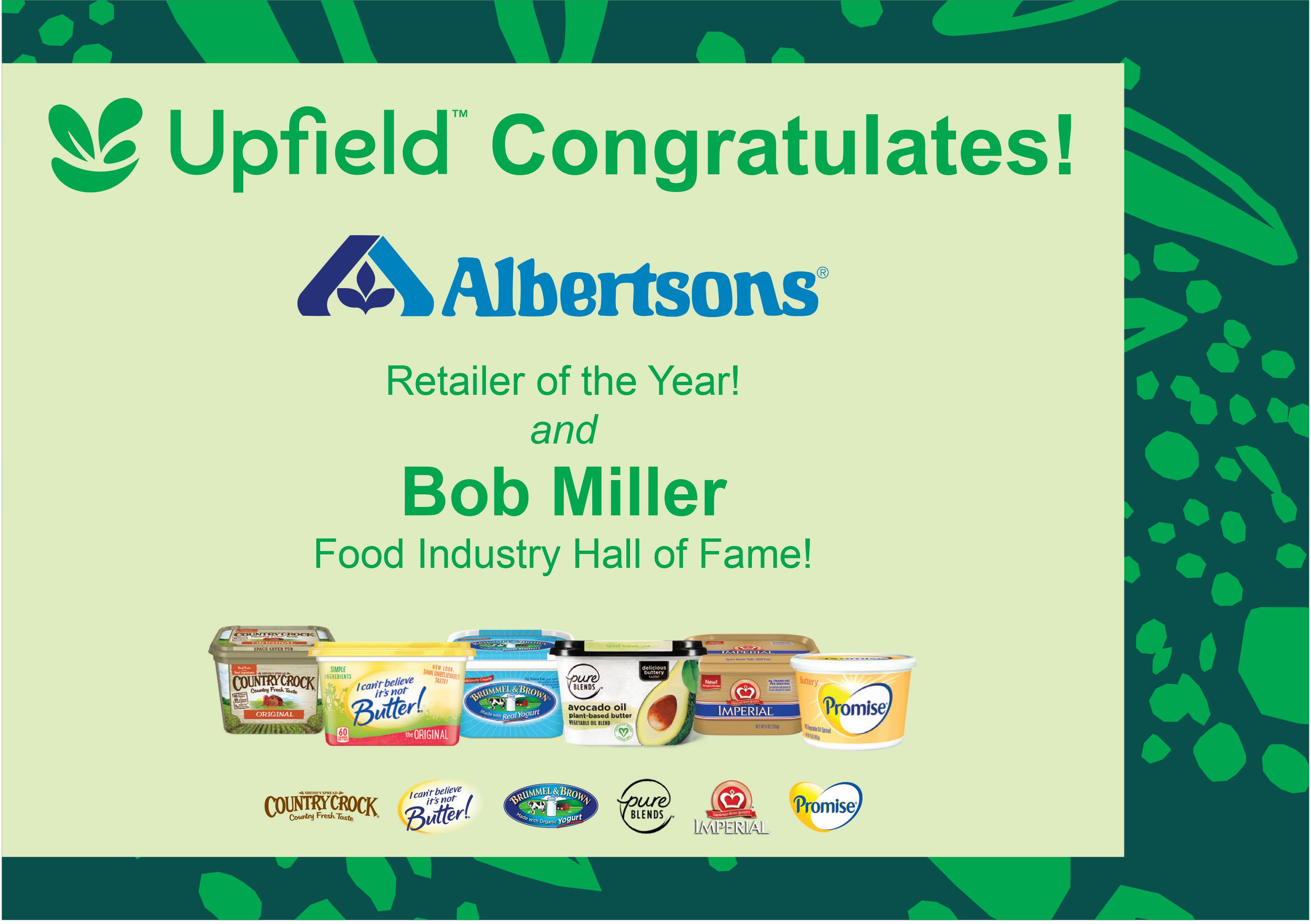
Sampson has worked closely with Miller for a number of years—and today has an office next door to his. He says that Miller’s “work ethic is second to none. Bob’s a very, very hard worker; has been his entire life. It’s because he loves what he does.”
And he continues to keep his eye on shoppers.
“He never loses sight of his relationship with the customer,” according to Sampson. “He always thinks about the customer at every single level. He wants to give customers what they want at a price they’re willing to pay, with lots of tender loving care.”
Store visits are important to Miller, and “when Bob’s in a store, he’s talking to the people,” Sampson says. “He’ll talk to the store manager for a while, but then he’ll go talk to all the department heads and then he’s up front talking to the cashiers and courtesy clerks.”
Outside the business, Miller values Albertsons’ vendor partners, Sampson says. Miller continues to attend the vendor-sponsored golf tournament, the Boise Open, which had its 29th event in September.

“Even at this time in his career, he’s going out and entertaining our sponsors, raising money for charity at a worthwhile event. He’s a tireless worker,” Sampson says.
Inside Albertsons offices is “a really open, collaborative work environment, and he’s the one that fosters that,” Sampson says of Miller. “There’s no ‘mahogany row’; every door is open. I think that breeds a lot of teamwork. It’s been great to be around that kind of team and that kind of team leader.”
Sampson says that Miller continues to lead the Albertsons team to think innovatively. He encourages company executives to develop next-generation type stores, such as the Albertsons on Broadway in Boise (see page 74) and the new Market Street Idaho stores, fashioned after the Market Street stores its United division in Texas operates. He also encourages innovation in areas such as Albertsons own-brand products, prepared foods programs, e-commerce and meal kits (shown in the acquisition of Plated).
“Not everybody’s doing those things and not everybody’s doing those things at this time in his career,” Sampson says. “He’s very much an innovator.”

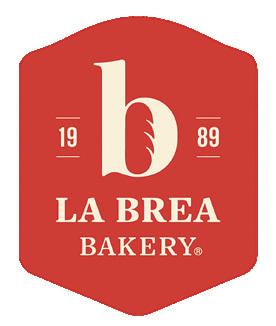
That was the bottom job in the store.
You got married young, correct?
Yes. My wife and I met in high school and we got married right after she got out of high school, a year or so after. That’s 50-something years later and we are still married. She’s still the boss.
How soon after you got married did you start having a family?
Two years after, we had our first son. She worked for two years outside the house and that was it. Since then she’s just spent money, so I had to make money (chuckling).
So that interrupted any plans you might have had for college?

I kept getting offers for better jobs at Albertsons and I had to weigh the two. Finally, they offered me what they called department manager—to run the deli—and the money was unbelievable in those days. I think 80 bucks a week or something, but it was a lot of money. I had a car that was falling apart, and that was just too much temptation. I was always thinking about going back (to college) but I kept getting promoted, having babies, and had to keep working.
So you learned at a very young age a really good work ethic, probably from both your grandfather and your mom? It’s always interesting to me to find out what makes someone as successful as you have been. There’s a lot of people with good work ethics that don’t get to where you are, so I’m curious, if you can put into words, what it was that made you as successful as you are. Well, one of the things that helped me succeed was working hard. Working hard is not necessarily spending your life working, but when you are there, you are really trying to

to Albertsons Companies for being recognized as the Shelby Report of the West’s 2018 Retailer of the Year and congratulations to Bob Miller for your induction into the Food Industry Hall of Fame.
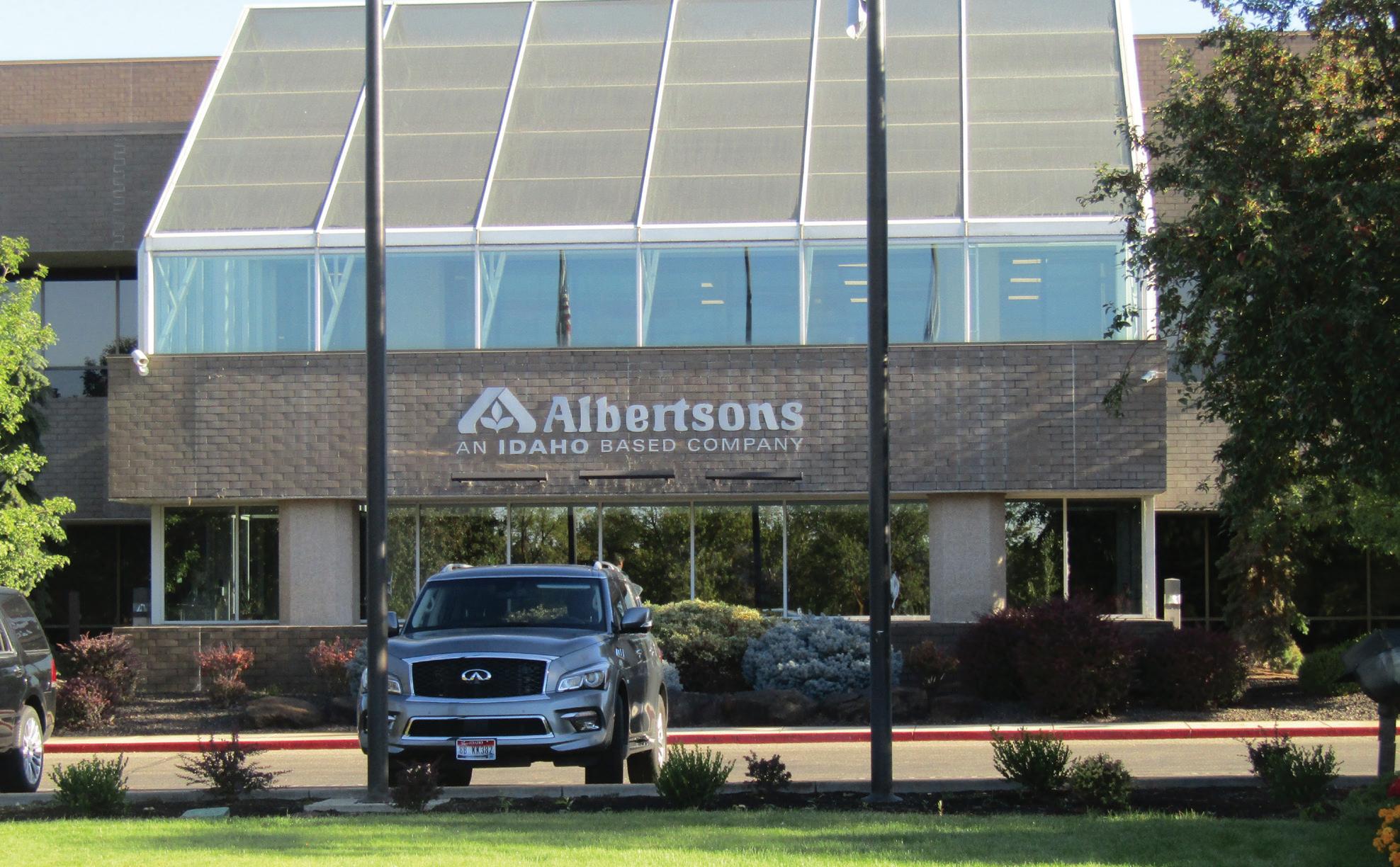

I was a grocery manager in an Albertsons store in Colorado Springs, Colorado, when I first met Bob Miller back in the early ’80s. At that time, Bob was president of the Denver division. Once, during a store visit from Bob, he asked me what my career goals were, and I proudly told him that I wanted to one day become a division president. Bob was very encouraging and told me that anything is possible in our company and promptly gave me advice that I will never forget. He told me that to be successful I needed to work hard and always be nice to people. He also said that regardless of the outcome, you need to be honest and tell the truth and always do the right thing. Amazing how this advice is timeless and just as important today as it was nearly 40 years ago.

I am proud to say, under Bob’s leadership, I achieved my goal of becoming a division president for this great company. And I am proud to have passed his advice on to so many individuals that I have seen advance in their careers. Thanks, Bob, for all you have done.
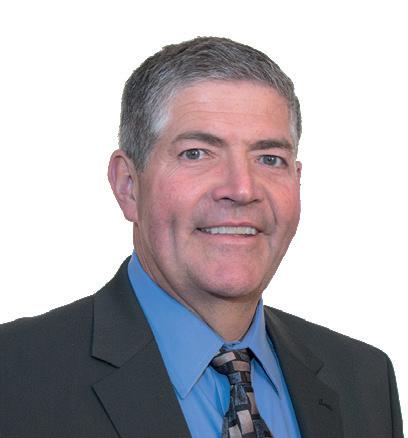
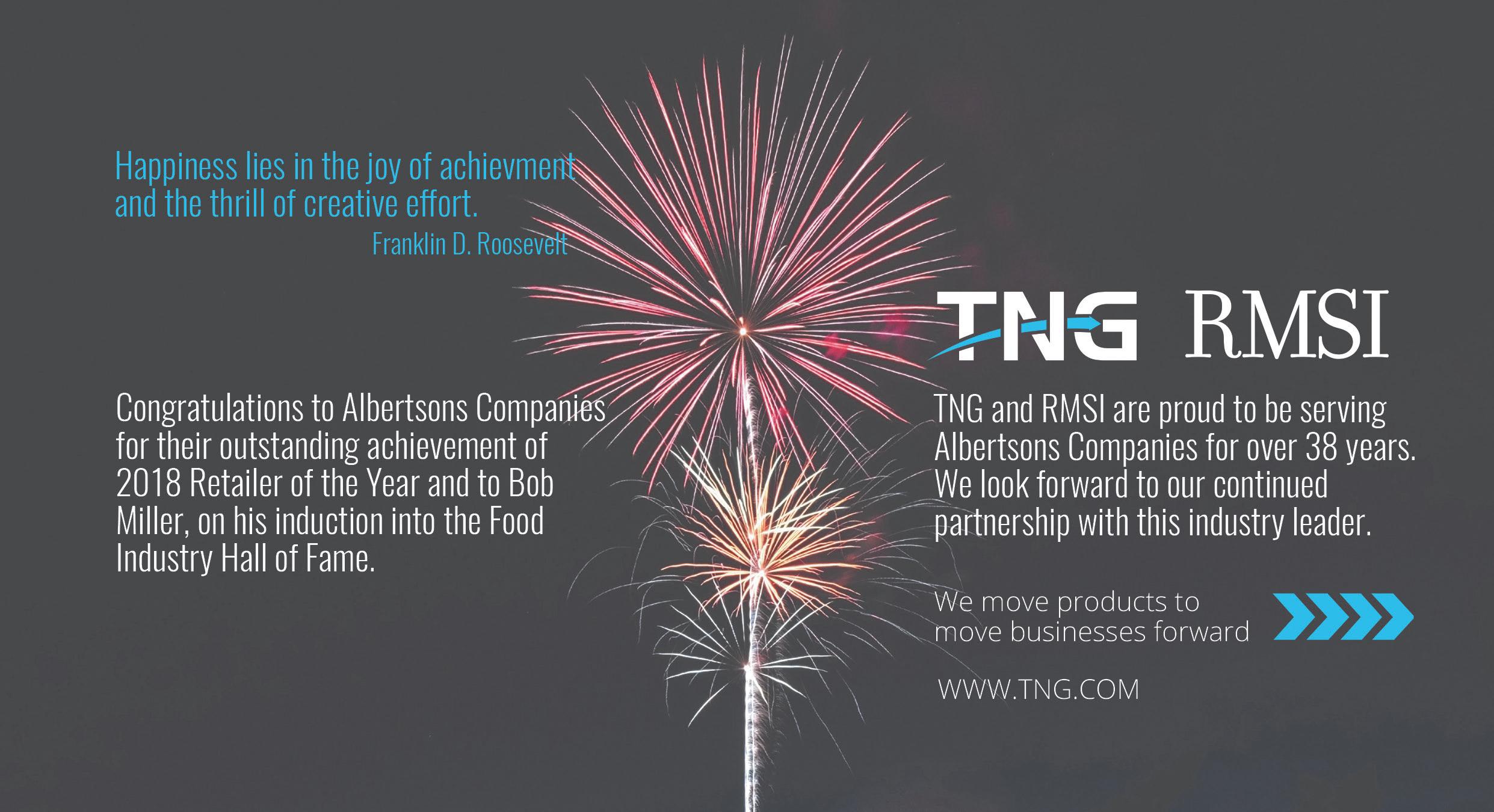


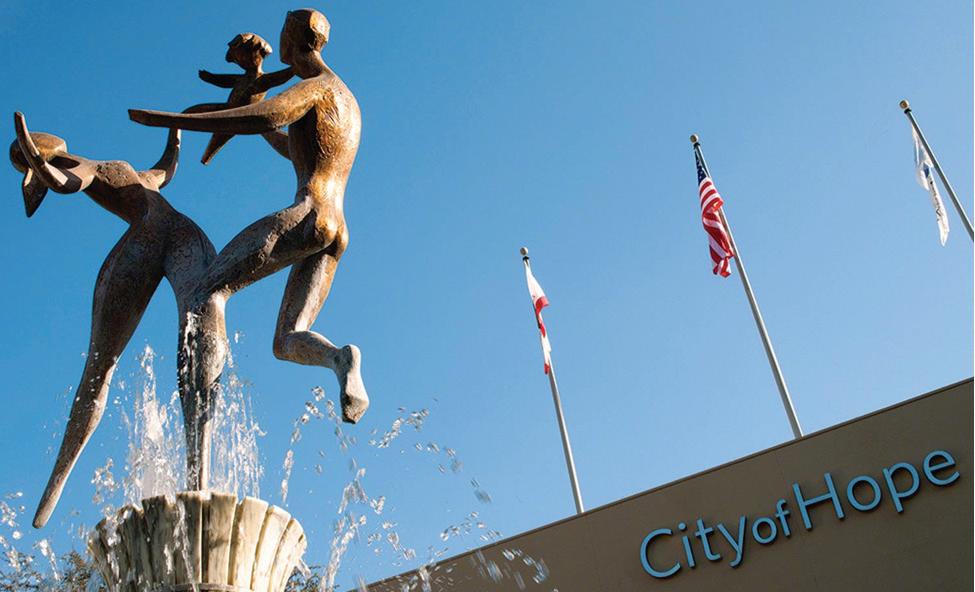
Robert Gordon serves as EVP and general counsel for Albertsons Cos., handling legal matters for the company. He closely works with Bob Miller and the board of directors.


Gordon joined Albertsons when his former company, Safeway, was purchased by Albertsons in early 2015. Gordon had been with Safeway for about 15 years. Before that, he worked for a law firm in San Francisco.


Gordon says what impresses him most about Miller is that not only does he have deep understanding of store operations and store execution, but he also has “a very sophisticated understanding of finance and financial engineering and other broad-picture items you might not expect from a true merchant.
“We have a lot of people on our board that are very sophisticated in high finance, and Bob can hang right with them and dish out the insights.”
He’s also unique among CEOs in that “he believes in accomplishment through humility and integrity, not through intellectual dominance or anything else,” Gordon says. “He cares about the success of other people so much more than others I have come across in the business world. And the people whose success he cares about are not just his immediate lieutenants, but everyone in the stores and everyone in the whole company. It certainly was obvious to me shortly after meeting him that that’s how he leads, and that’s inspirational.”
get something done. You are working hard at what you have to do.

In my case, I wanted to be the best at what I did, so if I had the soap aisle, I wanted it looking better than anything else in the store. When I was working in the grocery store, you had aisle captains. So, I remember my first captain’s job was the soap and dog food. I had to order that, stock it, reset it, actually price it…mark everything up 16 percent with a grease pencil.
So it’s working hard, but also treating people right. At one time I had nine CEOs in the Fortune 500 that had worked for me. That’s pretty good. The best thing about that was I could call all nine and they’d answer the phone for me. That’s really, I think, the best part of that story.
You attribute that to what? Well, treating people right. You get a payback over life. I still have lots of people I know who know me who don’t have
Bob is such a great influence on everyone he meets. He has a special ability to keep things simple: Work hard, take care of our people and have fun selling! Bob trusts his team and allows them to do their jobs. He encourages risk-taking and “playing offense.” “Do something; if that does not work, do something else.” He has amazing insight and is a great coach!




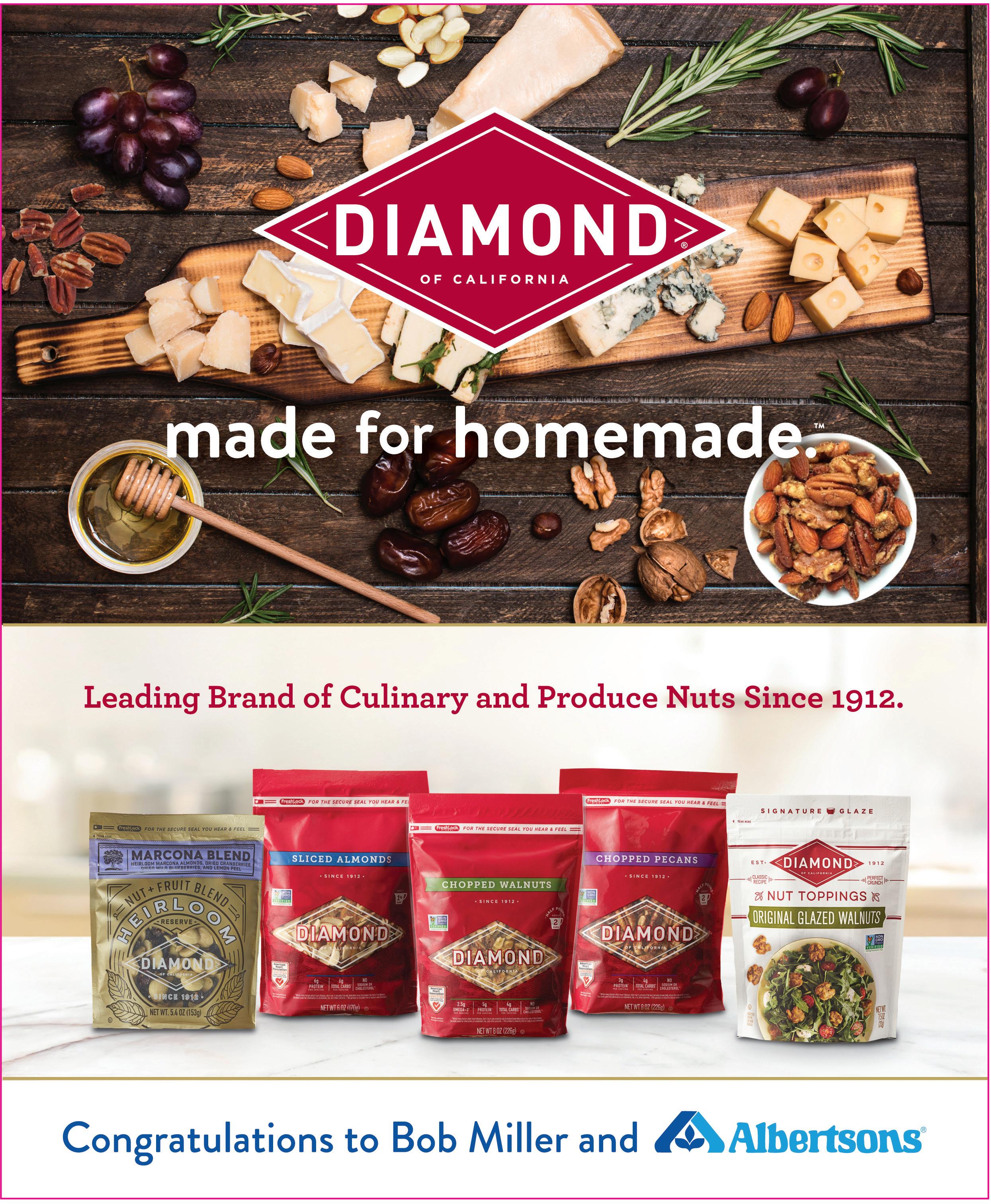
too many bad things to say about me. Even people I’ve let go. You have to do that with dignity and you have to treat them fairly. It’s not that they went into the job trying to fail, but sometimes people just can’t be successful for a lot of different reasons.
The fact that you’ve been married 50-plus years is something. How did you balance your career and family?
My wife was terrific. She’s a great mother, a great lady. When I got promoted to senior VP at Albertsons, I was here in Boise, and I would travel every week. I would usually leave on Monday—I had the Southern division—and come back Thursday night, 48 weeks a year or something like that. Sharon ran our family, so I was very lucky. She raised three boys who all received master’s degrees in college. They are all good
businessmen, and they are doing great.
Can you pinpoint a couple of things that your mentors did for you that you remember and you utilized yourself?
Well, certainly John Carley, who ended up being the president of Albertsons. He was a district manager in Southern Cal when I was a store director. Then he ended up in Boise. I ended up, over many moons, running the Denver division for Albertsons, and we really bonded. He would call me about once a week and we’d talk about life and business. He’d talk about what he thought it would take to be successful about anything, the people in our division, what are we doing about x, y and z. It was a great relationship that went on for many years.
Another mentor was Warren McCain, who was the
Albertsons CEO (from 1976-91) who really put the company on the map. He had run Denver for a while, which was a poorly performing division because of King Soopers, and then I was running Denver. He had a fondness for Denver, and we were able to make big progress there and get that thing turned around and doing much better. So, he would come down and visit and was really excited about what we were doing there. Warren always took me under his arm, traveled with me, talked to me about what I needed to do.

Warren also sometimes hit the automatic button on the door and sat me down and yelled at me. (When I came back to Boise as a senior VP, I was right down the hall from Warren and Joe [Albertson] and Carley.)
I heard about that—the door that closed automatically.
When that door closed you knew you were going to get something. We had some interesting times. We had some big arguments.
Because of philosophical differences?
Not necessarily that, but he wanted results. We had superstores coming to Baton Rouge and Lafayette where we were the No. 1 share and did big
Bob Miller has a way of building real relationships with people from the very first time they meet. I remember the day Bob walked into the room wearing a Texas Tech shirt and told me he wanted to buy our company. That small, but certainly intentional, gesture put everyone on the same level and was the beginning of a great relationship.
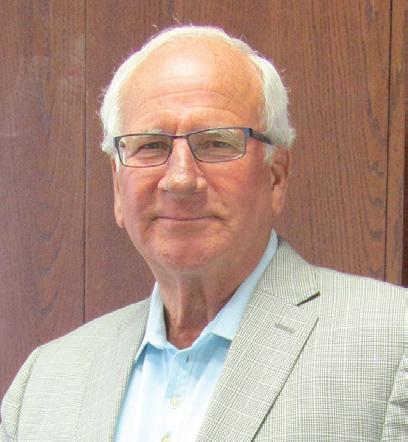
His relationship-based approach to business and leadership creates instant credibility and trust from everyone he works with.
Bob has the rare ability to create meaningful relationships with the most influential people in our country, and yet he can walk into a grocery store in rural Texas and immediately build that same rapport with a meat cutter back in the market.
I believe I can speak for everyone who has worked with Bob Miller for any length of time when I say that he is always available to support you and, in turn, you would do anything in your power to make Bob successful. Bob is definitely a man of his word and does everything he says he’s going to do. In my 50 years in business, I have never been around a leader who could create as much value as Bob does by being dynamic and down to earth at the same time.

Justin Ewing, EVP of corporate development and real estate, joined Albertsons in 2006 after Cerberus Capital Management, where Ewing was employed, bought 655 Albertsons stores.

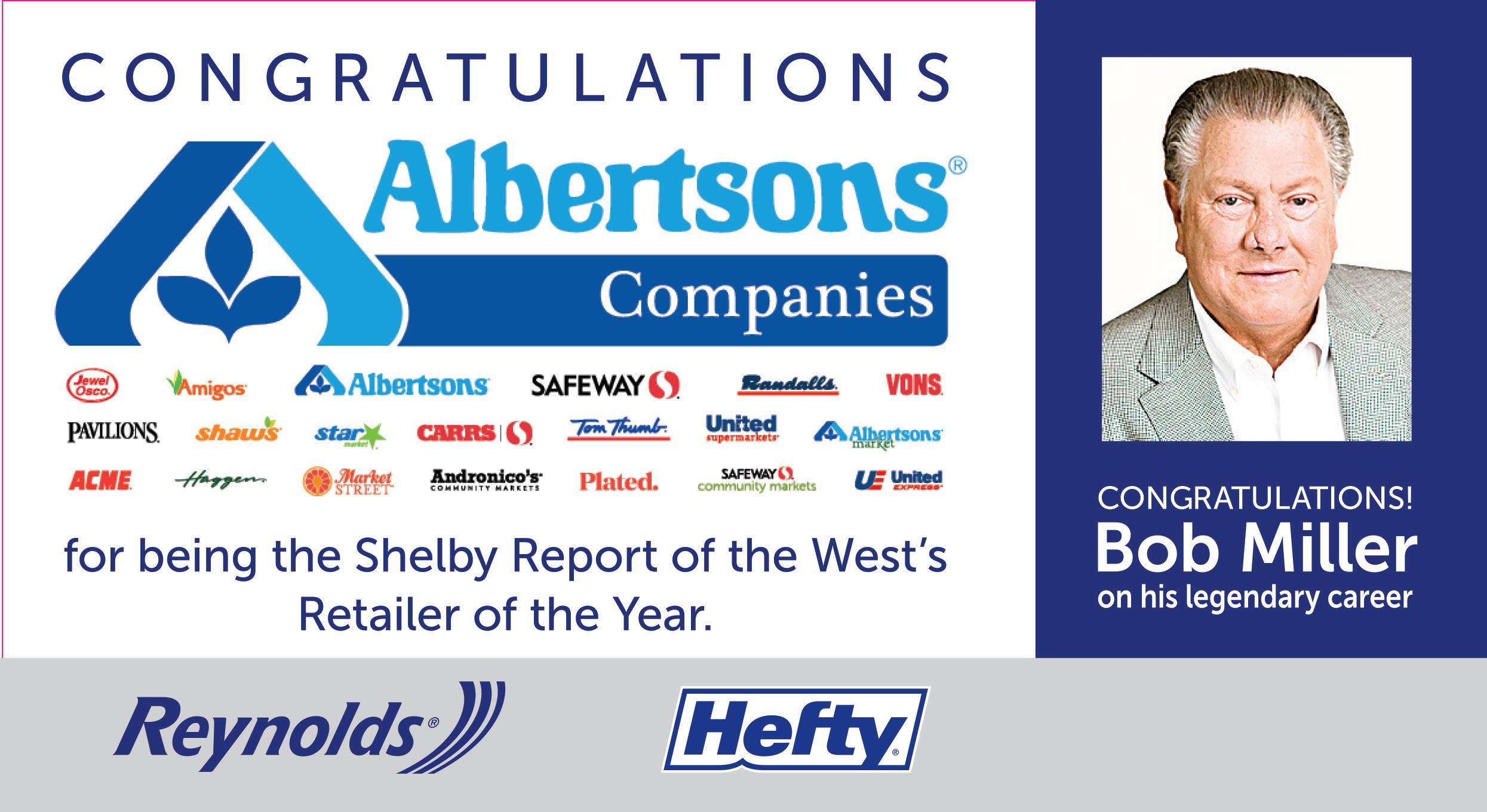

Ewing, who is British, is married to an American; that’s how he got to New York and the job at Cerberus.
Justin EwingAt Albertsons, he took a job in corporate development and began to learn about real estate.
Bob Miller, he says simply, is a good leader.
“If you want to see what the culture of this firm is, it’s in the corner office,” Ewing says. “You know what you’re trying to achieve because he’s always straightforward and basic and easy to understand. He’s very supportive, but you always know exactly what he wants.”
A good CEO, Ewing adds, “is such a fundamental benefit to a company, and I think that’s clearly what (Cerberus) did when they hired Bob. It was a classic example of somebody who just transformed the company or made the company what it is. Yet you see so many examples of executives where that’s not the case because it’s really tough to do that. The industry is littered with people who have had massive salaries and great credentials and just failed to lead the company. So finding that person who is genuinely a fantastic leader is key.”
And Miller manages to make it look easy, Ewing says.
“It’s very, very difficult to lead and to do it effortlessly, but Bob is equally at home telling you that your counter is stacked incorrectly as he is doing a multi-billion-dollar merger. That range—boy, is it stunning.
“There’s a charm there that’s difficult to mimic,” he adds. “I really can’t think of a single person I’ve met who didn’t like Bob. Like and respect.”
business. They opened these 80,000-s.f. stores in the mid-’80s and our profits went down to 20 percent of what we had. He would come in and yell at me and ask what I was doing. I said, “I’m not letting them take my business.” And we’d get into a big debate about why you need to spend so much to do that. (The competitor) ended up closing their stores after three years.
So you were able to hang in there.
Well, I almost got fired. I tell you it was interesting. When I got promoted to EVP, I had no idea it was coming. It was right after Warren and I had a big argument about something. I thought, well, I’m never getting promoted.
Did you like the high/low concept or were you more inclined to think that you needed to be low price?
In Texas and Florida when I was running it, we were the lowest priced operator there, and we had these big stores. The only big stores in the company were Texas and Florida, and they were 55,000 s.f. or so. This was in the mid-’80s. We also had lots of non-foods in them.
I really got aggressive on price when I was overseeing that division because we wanted to run traffic. The non-foods made up a lot of the profits, so we were very successful down there. A big share of the company’s profit came from those two divisions.


What about your pricing structure today?
We are priced different by banner, but our goal is to run a store that has the best quality produce—we only buy good sizes, the best produce. Even if we are running an ad, we don’t buy lower grade, which is different than a lot of our competitors.
We only sell choice meat or better. We always try to have the best quality.
In the grocery aisles, we try to have lots of variety—ethnic, organics, specialty—which all cost money.
We want to have service meat and a fish case in every store. We want to have a cake case where we actually have a decorator in the store that does all the work and has the ability to fix specialty cakes for customers.
Congratulations Bob Miller on your outstanding career! From your friends at
So, we do a lot of things in our store. We want to be clean, well-stocked, have good service, which is always a challenge in today’s world. But we want to run a high-quality store. We want to give people a reason to shop with us instead of Walmart, and we think we do that. So we are never going to be the lowest priced because we push hard to run good stores.
Let me grab on to that one comment about service and how difficult it is in these days.
It’s hard to hire good people… and then they leave. We have 285,000 employees approximately. Almost 50,000 of them have been with us over 20 years. So, we have a real core of people, but then you have a lot of people, especially toward the front end and the service, like service deli, that turn over a lot for whatever reason. They don’t like the job, they only want to work for a short time, they weren’t friendly to our customers, we had to move them on. So that’s the real
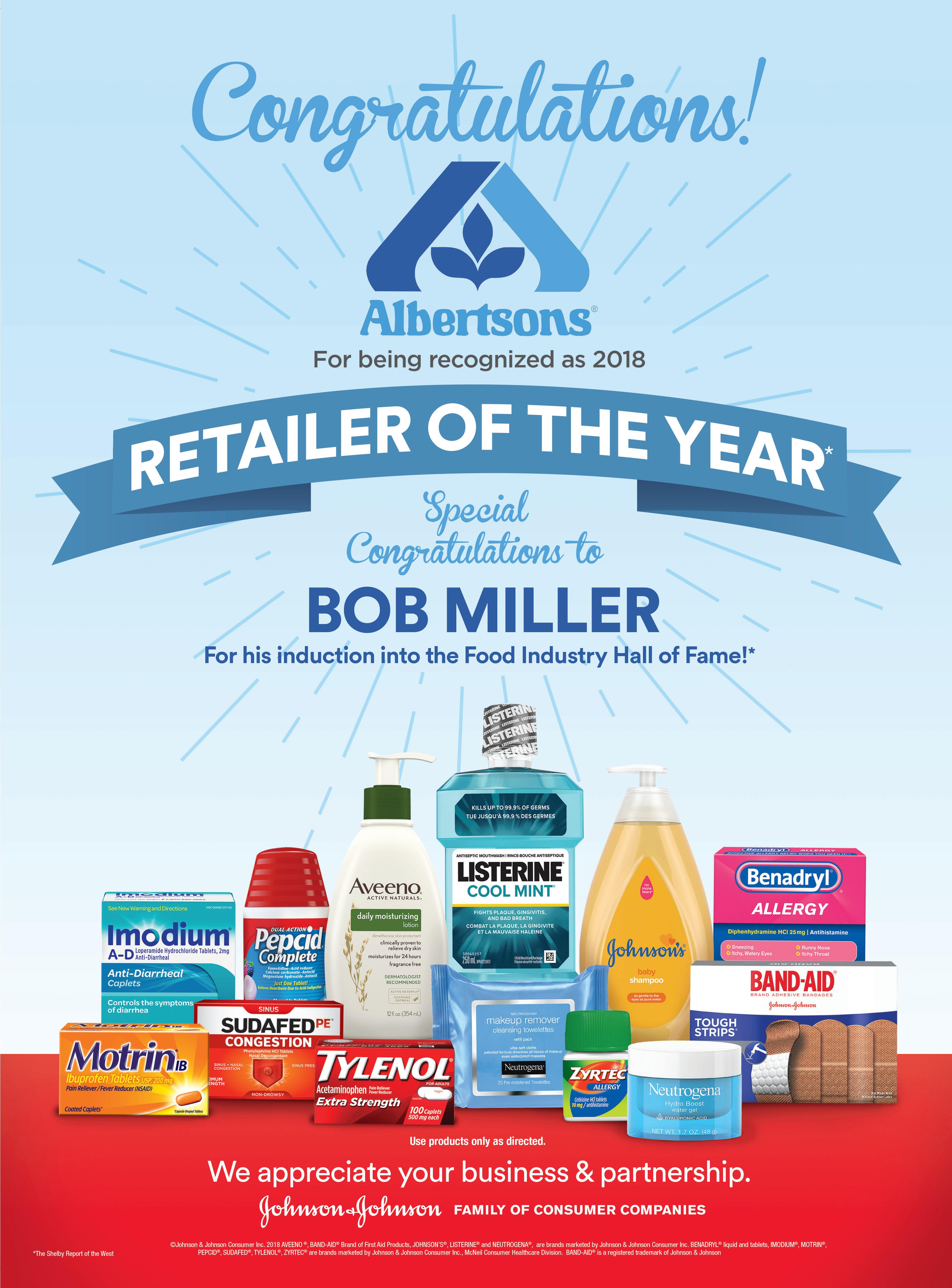
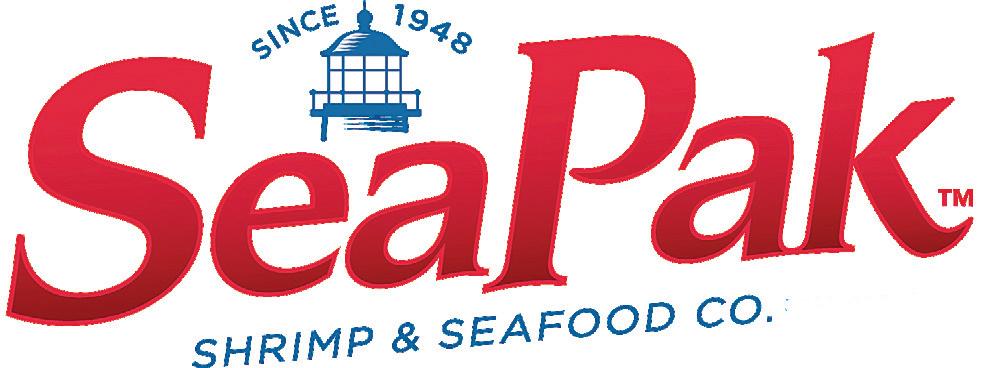
challenge. Hiring the right people today and keeping the right people.
How do you address that problem?
Number one, we have to have better hiring practices, which we are working on. Not just hire a warm body. But that’s a challenge for everybody, I think.
And then we have to train them. We have to make sure we don’t just hire a courtesy clerk and say, “go bag groceries.” We’ve got to train people better and hopefully we can slow down some of that turnover. That would be a big plus for us and, I think, for everybody in the industry.
This continues to be one of those rare industries where you can actually get a good paying job with little education as long as you are willing to work
hard.
And treat people right.
Wages are 50 percent of our costs with benefits. Now, when we have to pay $240 million more this year in wages than we paid a year ago, that’s not easy to say that helps you, but it probably does over the long term.
What did you learn during your years away from Albertsons (Fred Meyer, Rite Aid, etc.) that you brought back to Albertsons? In other words, was there anything that you changed at Albertsons as a result of the things that you learned elsewhere?
I would say that certainly as I had other jobs I picked up things that I’ve used in my career.
I ran Rite Aid for a while, and it was 100 percent centralized. Everything that was done in a store was dictated by the corporate office. I saw that system,
which I didn’t like very much. In a drugstore environment you probably stuck to that because it’s got limited SKUs and it’s all automated replenish.
At Fred Meyer, I learned about variety; if you had everything that a customer wants in your store, they are going to be more likely to shop with you for everything. And that goes with the grocery store. I tell our guys when I go to a store—and I go to a lot of stores—if you don’t have fresh chicken livers, then you are going to lose a customer. Now that means you might have to throw three or four packs away a week, but when they buy that chicken liver, they will probably buy a whole basket of other things. So I learned that having variety and being in stock on things people wanted was one of the big keys in the grocery business.
I also learned that you could spend a lot of money on IT and systems. I learned that at Fred Meyer in my first CEO job.
Tell me about Albertsons’ growth over the last few years.



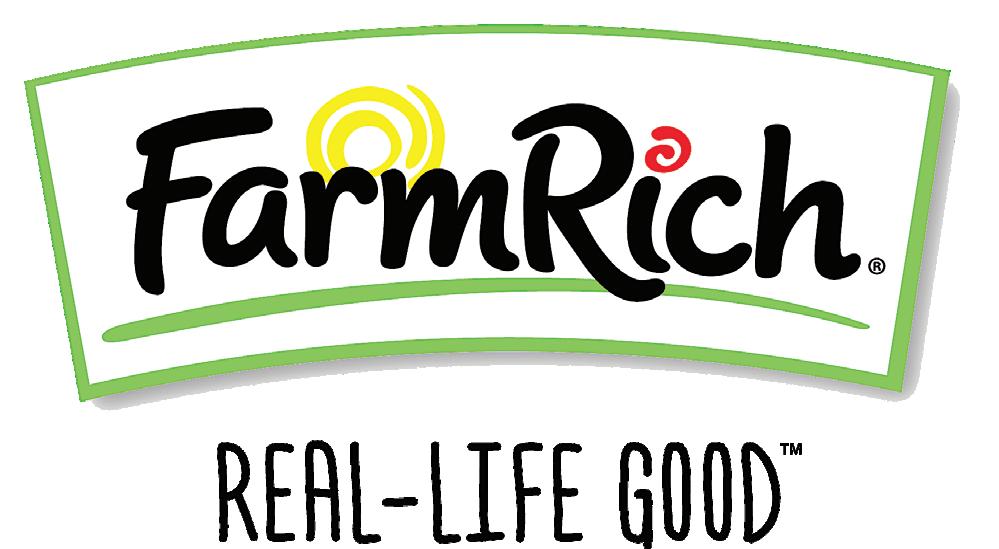
Five and a half years ago (2013), we were a very small company. We had 190 stores; we were doing a little short of $4 billion a year; we’d paid off all our debt; and we were making a little bit of money. Texas and Phoenix were our two areas, and we had a little office in Boise here. It was the easiest job I ever had; we had two division presidents that ran their businesses.
KARL SCHROEDER
Seattle Division President
When I think about Bob, a few very desirable traits come to mind.
Bob sets a terrific example of building success by keeping things very simple, executing very effectively and, most importantly, comfortably communicating with the team at all levels. A lot of people I have met over the years say they are going to do those three things, but they are inconsistent over time. Bob hits the bullseye every day.
I am also impressed with the network of incredibly loyal industry executives Bob has mentored over the years—great leaders in their own right that point to Bob as their teacher and the person that they try to exemplify in their role as they now lead their teams. I think this is because Bob has that skill that comfortably connects with people by making them feel extra special and critical to the cause.
I have worked with many leaders that have tried to build a history of success in our industry, or worked very hard to be respected, or simply be liked by their team. Bob is a great example of that special executive that consistently does all three.
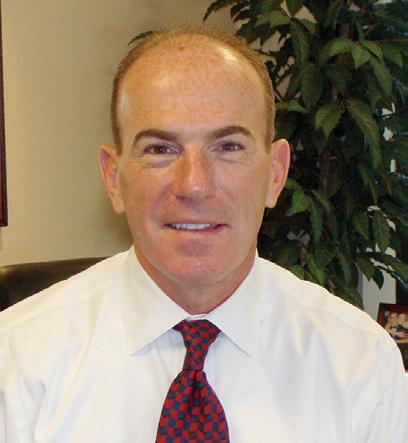

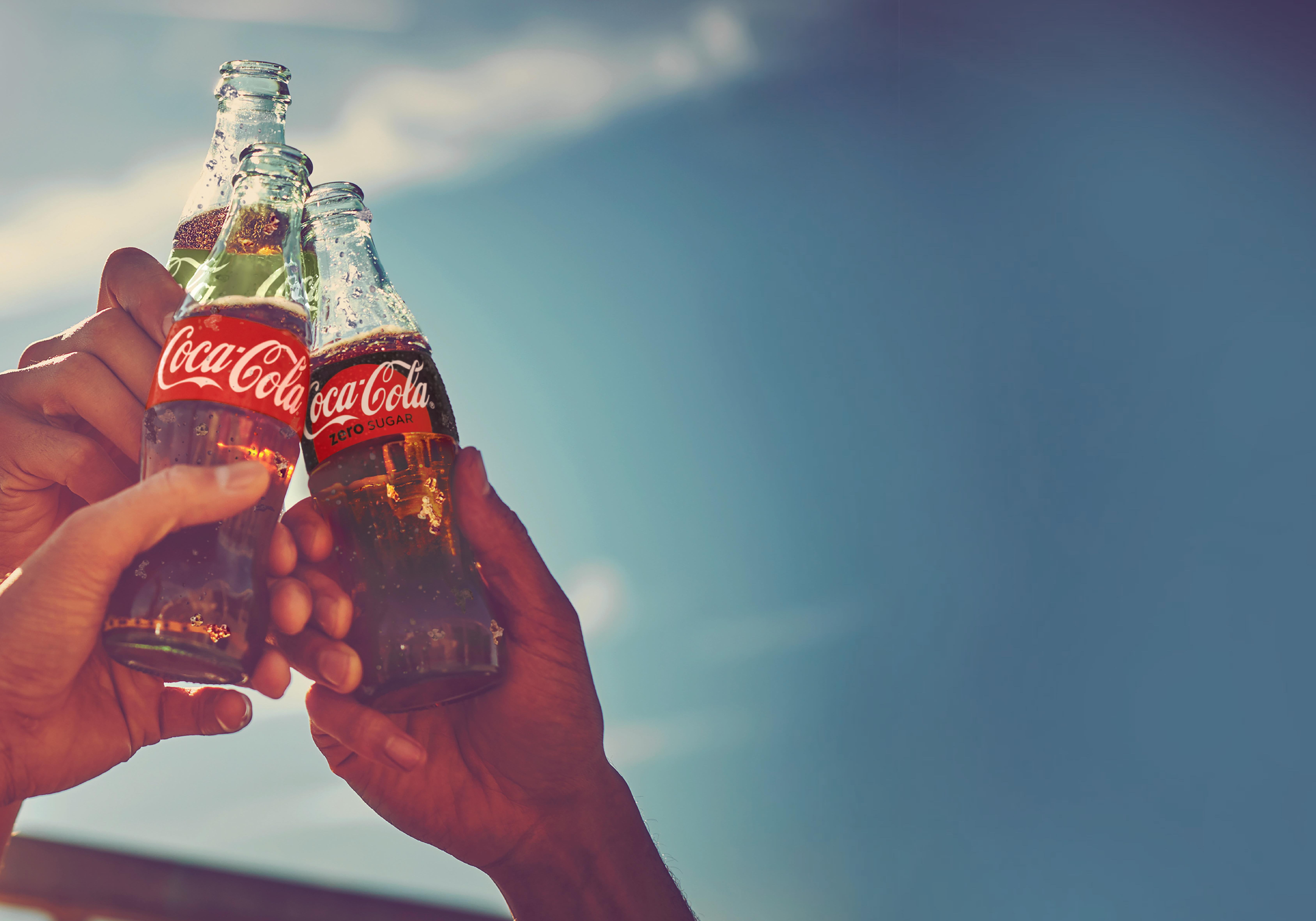 ©2018 The Coca-Cola©2018Company. The Coca-Cola Company.
©2018 The Coca-Cola©2018Company. The Coca-Cola Company.
2018 Retailer of the Year
2018 Retailer of the Year
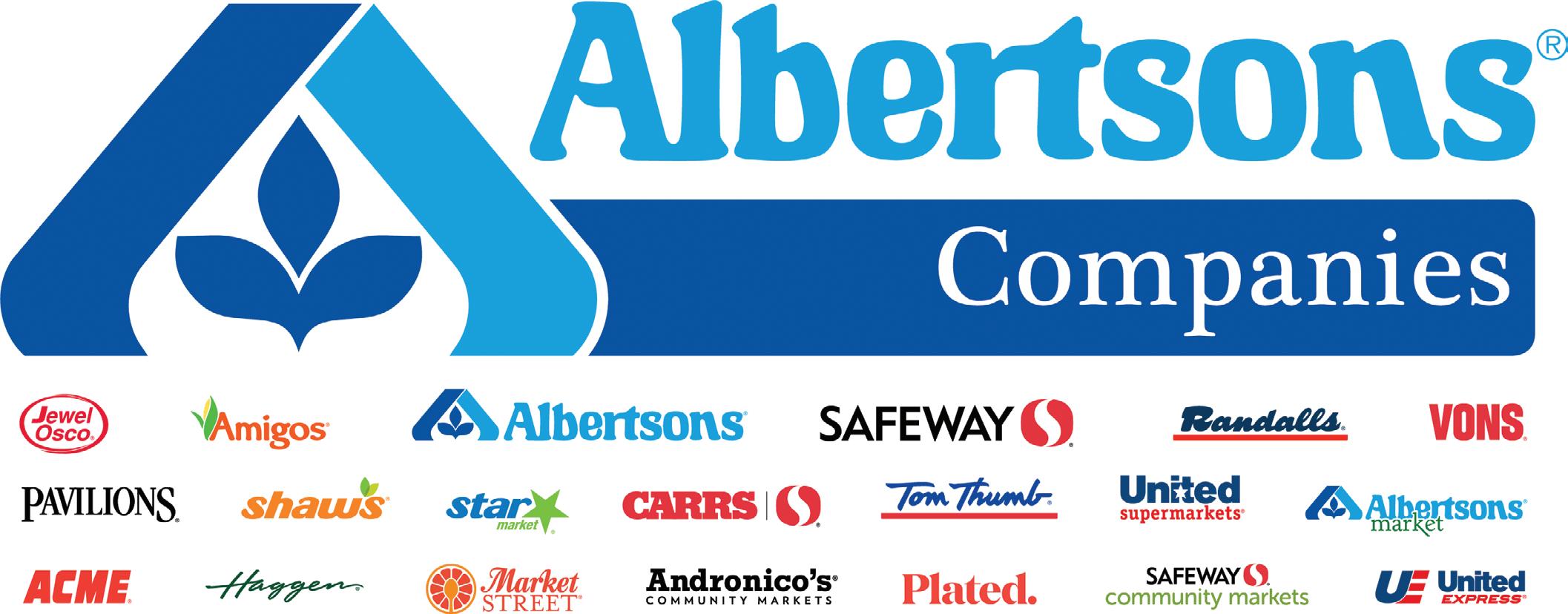

BOB MILLER
BOB MILLER
Chairman of the Board
Chairman of the Board
Inducted into the Food Industry Hall of Fame
Inducted into the Food Industry Hall of Fame
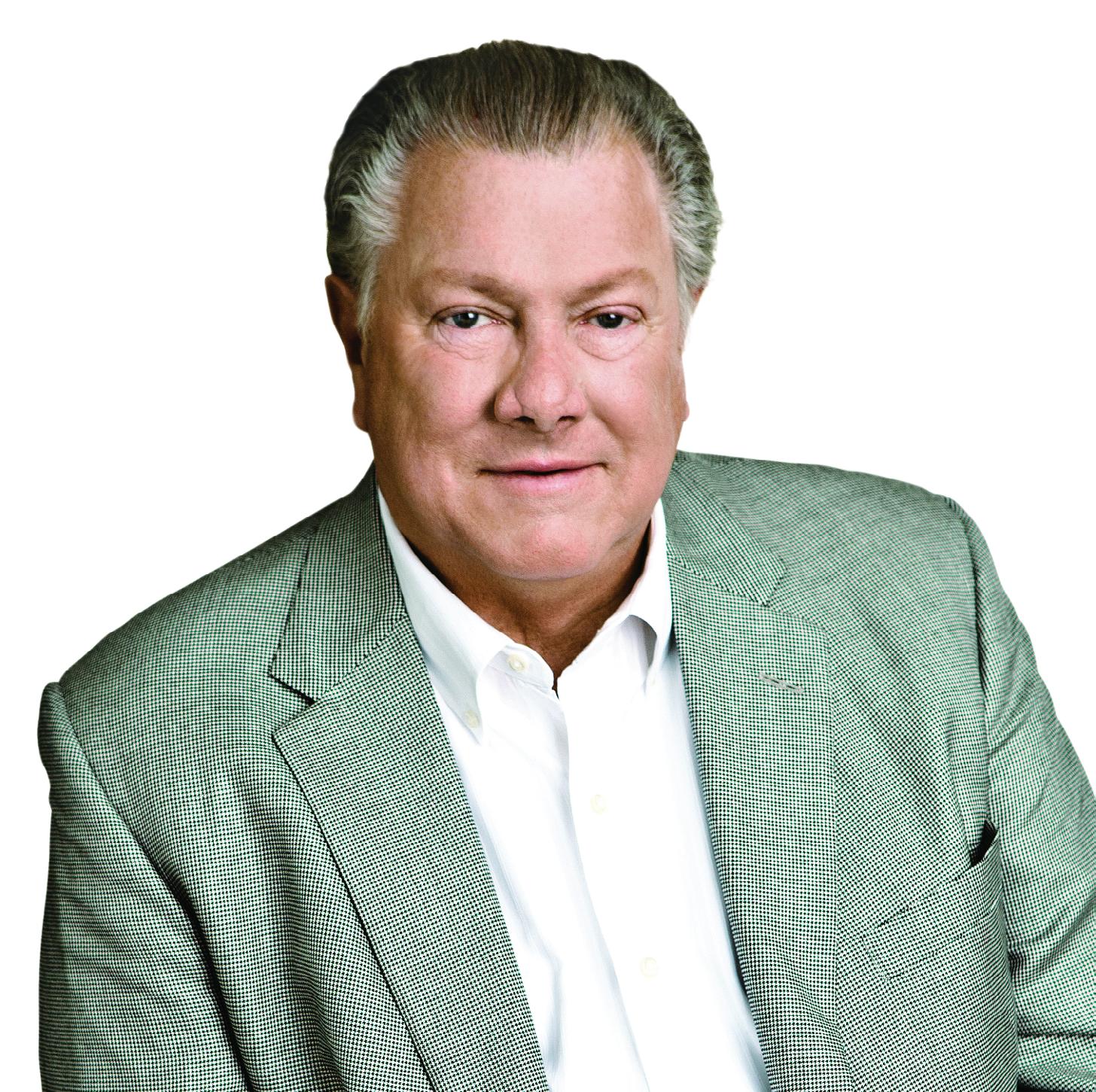


Mike Withers, EVP of retail operations, has been with Albertsons 42 years, starting his career in 1976. He has the distinction of having worked in the company’s 16th and State Street store in Boise—the original store. He started as a courtesy clerk.

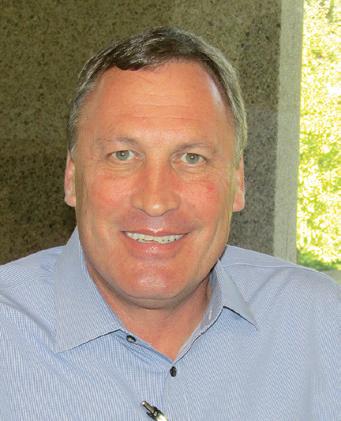
He moved up the ranks to store director, then relocated to Florida to be a store director and then a district manager. He next moved to Spokane, Washington, as a district manager. His next assignment—running his own division for the first time—was in the Big Sky division, with responsibility for store operations in Montana and North Dakota. During that time, Albertsons bought the Buttrey’s stores. He later ran the Florida and Portland divisions. In 2006, he was named VP of marketing and merchandising for the Florida and Southern divisions, then president of the Southern and Jewel-Osco divisions. He was named EVP of retail operations in April 2017.
Though he knew of Bob Miller earlier, 2006 was when Withers began working directly with him. Withers had actually left the company after the Supervalu acquisition of 1,100 Albertsons stores, and Bob Butler (Albertsons COO at the time) called and asked if he had any interest in coming back.
After talking to John Sheehan, who was running the Florida division at the time, “I was excited about what they were doing and what they were talking about in the business model; it sounded like something I wanted to do,” Withers says, adding that he had washed his hands of the industry, throwing out everything he had that was related to retail grocery. He had started a new career in real estate.
“But it was the model, or what John articulated to me that this is what we’re focused on, this is what we’re doing, here’s where we’re going…I had worked in the Florida market two times, I knew the market fairly well, I also knew the stores they bought and the challenges they faced—the new company did—and was very upfront about it. He told me, ‘I don’t know what’s going to happen, but we think we have a good shot at this. Two years from now, maybe we’ll be here, maybe we won’t, but we’re going to go out swinging.’”
Withers went down to Florida to visit with Sheehan, and “it was all that he said it was. I guess if there was anything that was energizing, it was all the naysayers, especially in the beginning. We were the has-beens, the retreads. That was probably a catalyst for the energy of all of us in the six divisions to succeed.”
Miller made it clear to everyone, Withers says: “Our destiny was in our hands. Bob knew where he wanted us to go: We’re going to run good stores, we’re going to treat people right, we’re going to compete fiercely. But he wasn’t telling you how to do it. We were decentralized, and the strategies we took and the opportunities we would see were different by market. He trusted us to go down the right path.”
That might mean making an investment in pricing in a certain market to keep market share, for instance.
Miller mixes accountability and autonomy well, Withers says.
“That’s Bob’s way. There’s certainly a level of accountability but also a high level of autonomy and high expectations. He will stay out of your way, but he’s never too far from you, either.”
Miller is known to call his executive team members periodically just to say, “Hey, what’s happening? Tell me what’s going on.”
He may have seen news about a new competitor or offer some operational advice, but he also may just be calling to check in to see how you’re doing, Withers says, adding that he considers Miller “a people person.”
Withers credits Miller’s leadership as the key to Albertsons coming back to a place of growth and success.

“There’s no way we would have made it without Bob’s leadership; the odds were stacked against us,” he says. “You see where we’ve come today, but you still hear the naysayers. I heard about it when we came together with the old company, the naysayers saying that’s not going to work, it’ll never work. With Safeway it’s not going to work, it’ll never work, well guess what? It’s working. Our future’s bright, it’s been a great run for all of us. There’s no way in hell we’d be here were it not for Bob’s leadership, his vision and his commitment to not going from ditch to ditch, not changing course. We’ve stayed pretty true to what brought us to the dance and what’s going to take us home.”
We grew—bought up a lot of companies—but we’ve tried to keep that culture where the executives have their door open and people are free to walk in.
There were times at Albertsons when the executive section was sealed off and you couldn’t get in unless you had a pass. We don’t want that; we want an open culture where people can say things, do what they need to do to run their business; they are charged with keeping the people they report to involved. We always have certain meetings that you have to go to—you can’t get rid of those damn things—but I want them to run their business and communicate. That, to me, is the way to run a big company.
I was at Kroger for a year, and that was not the way they were running in those days. The executive floor was the executive floor.
Do you want to share with me a little bit about the acquisition of Safeway? I know how it all worked out, but what I’m saying is that must have been very complicated.
It was. The nice thing about it is this month we will finish our major integration with Safeway. Three and a half years. We are converting our last stores to the Safeway system in the next week or so, if you can imagine that. That’s been very costly, lots of unimaginable hours to do that. It’s been a distraction.
That’s one reason I think it’s the right time for me to step aside (as CEO) and get somebody else in here because we’re positioned now to do things we couldn’t do the last three and a half years.
We are all going to be on the same system; we won’t be closing and consolidating warehouses. It was really unbelievable how well our people have done. Think about changing over a store: You close that night, you change every piece of electronic equipment, telephones, everything—you retag the whole store and you open the next morning by 9 o’clock. And think about doing that 900 times.
And the cost—think about it. Throwing away all the equipment or selling it for nothing or whatever and getting all new equipment in every store. It’s been an unbelievable amount of work and that’s behind us. It’s a good time for me to get out of the way.
Plus, we didn’t merge with Rite Aid, so we’re just going to grow our own company.
And our company’s doing great. We are going to spend about $1.4 billion in capital this year and generate $400,000$500,000 of free cash flow, and we have significant liquidity—including nothing drawn on our $4 billion revolver—so all of this stuff about “overleveraged” (is inaccurate). We own $9 billion worth of real estate, so this company is in really great shape going forward. The wind’s going to be at the back of this company because of all the stuff we had to do to integrate Safeway and Albertsons together that’s done. I couldn’t be more excited about what’s going to happen going forward.
Probably help morale a little bit, too.
Oh, I think so. People have worked so darned hard it’s hard to believe. A team of 50 to 75 people have been working every night helping convert these stores for three and a half
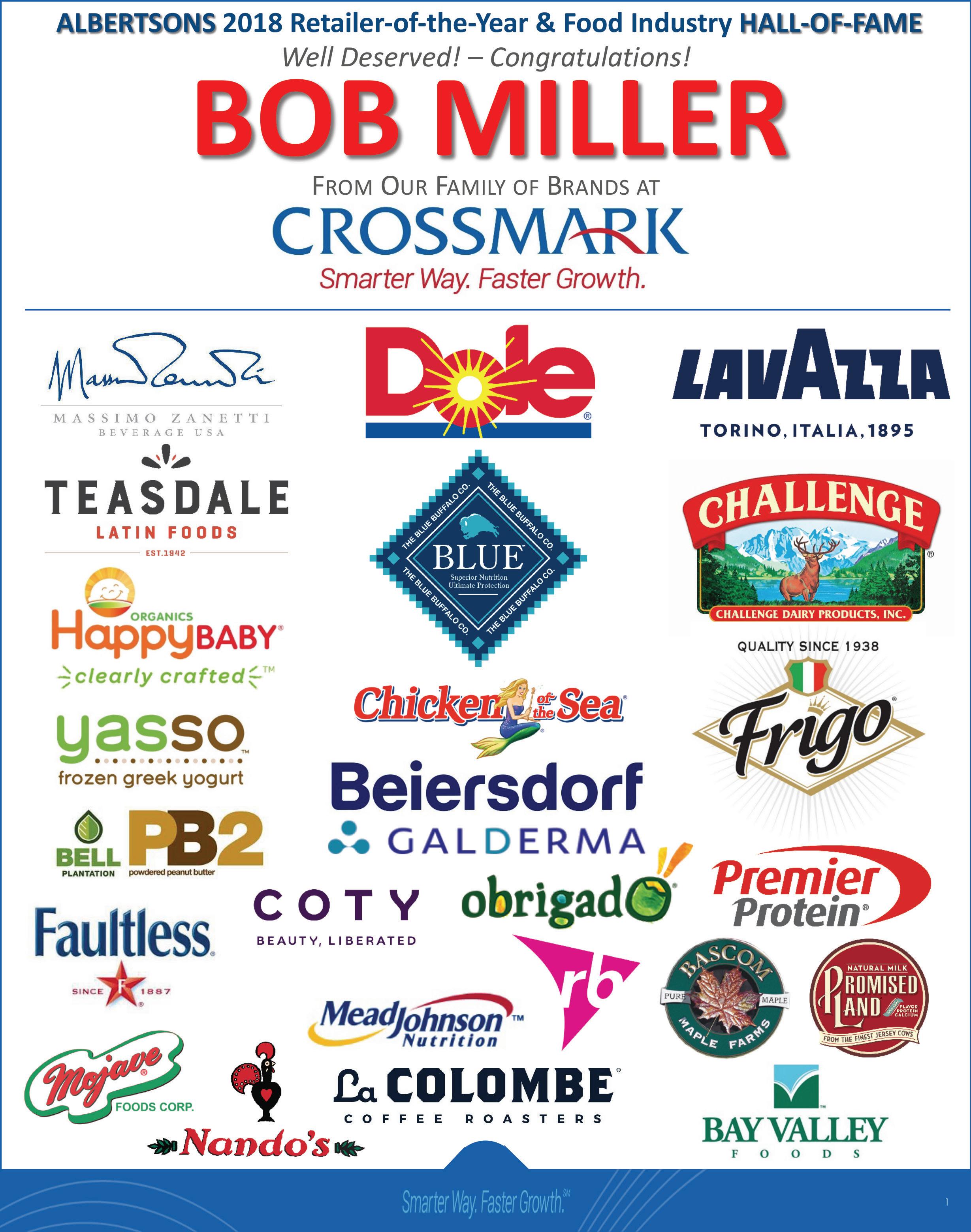
Susan Morris has been with the Albertsons organization for 33 years, starting as a clerk in the Denver division when she was in high school. In January 2018 she was named EVP and chief operations officer, overseeing the company’s supply chain, manufacturing and operations functions. She took on some of the duties of Wayne Denningham, who retired after more than 40 years with Albertsons. He had served as president and chief operating officer.
Morris briefly met Miller when she was in her early 20s. He was in a regional role with Albertsons, and though she was in “a much lower role at that time,” she already had learned of his reputation as someone who was well respected.
Morris went over to Supervalu with that company’s purchase of some Albertsons stores in 2006; she and her husband both were offered jobs. She was VP of customer satisfaction at that time.
But she decided to return to Albertsons LLC, as it was known at the time, in 2010. Part of the reason she decided to make the move back to Albertsons—even though LLC only had about 200 stores then—was that Supervalu was starting to centralize operations. The opposite was happening at Albertsons under the leadership of Bob Miller, Bob Butler and Denningham.
Denningham had been her store director in her early days as a clerk, and Butler had promoted her on more than one occasion.
“I had this opportunity to come over to this tiny little company, this Albertsons LLC—the non-core assets that ‘weren’t going to make it,’” she says.
Though she had to go backward from an SVP of sales and marketing role to a grocery sales manager role to get back to Albertsons, she knew it was the right thing to do, based in part on the company culture.
“Some of that starts back with Joe Albertson—he created our company—but probably no one has been more true to that culture than Bob Miller,” Morris says.
Sales are the first priority—there’s no company without them— but that’s closely followed by customers, employees and stores. “He works really hard to make sure we take care of people and do the right thing for people,” she says.
The first week Morris was at Albertsons LLC, she was able to finally spend some time with Miller at a dinner they both attended. Though she had met him, she didn’t really know him. All she knew was that people who had worked closely “just bubbled over when they talked about Bob. He’s not exactly a cuddly teddy bear kind of guy; he’s not exactly the guy that uses a thousand words to get his points across. He says very few things, but what he says he means it, and he’s a really good person. So getting to meet the legend and spend some time with him, instantly I was like, I get it. I get why people feel the way they feel about him. He’s not flowery, he’s not going to throw a bunch of extra time and energy at fluffy conversations—he’s just going to tell you what he thinks and he’s going to take care of business. He also does an amazing job of taking care of people.”
As a man of few words, Miller has a gift for listening and a heart for helping people, Morris says. She knows personally of situations where Miller has been “extremely generous to people that have nothing to do with furthering his career or our company; he’s just a good man who likes to take good care of people.”
Though Morris took a lower role when she rejoined Albertsons in 2010, by 2013, she was named Intermountain division president after a three-year stint in the company’s Southwest division, and subsequently was asked to lead the Denver division in 2015. Morris was named EVP-East Operations in April 2016 and was moved to lead West Region Operations in March 2017.

The year 2013 was big for Albertsons, when it bought back 877 stores from Supervalu.
“Bob was maybe more excited than all of us to become an Idahobased company once again and come back to the roots that really made us who we are today,” Morris says.
“Our culture may have started with Joe, but Bob’s the one’s that kept that alive all these years.”

Albertsons purchased the meal kit service company Plated in September 2017.

The New York City-based company, which operates as a wholly owned subsidiary of Albertsons, was purchased by Albertsons as a means for the grocer to keep up with its shoppers’ evolving lifestyles and food preferences.
“Today’s consumer is looking for a variety of personalized shopping alternatives, and this transaction is the latest example of Albertsons Cos. meeting our customers wherever and however they like to shop,” said Bob Miller, then chairman and CEO of Albertsons Cos. “With Plated, we’ve found a partner who shares our commitment to delicious, affordable food; superior technology and innovation; and world class customer service. Plated knows its customers better than anyone, and together we will accelerate our ability to serve them. We are excited to offer our customers more online options and fresh, quality ingredients along with distinctive recipes at their doorstep or through traditional shopping trips.”
Plated benefits from Albertsons Cos.’
resources and national reach, with more than 2,300 stores to scale its business and improve its customer experience with new offerings. Albertsons Cos. will enable Plated to expand beyond its existing subscription model by offering Plated meal kits at many store locations, across its digital channels and through a variety of distribution options “to make it easy to create delicious meals at home by providing the flexibility, convenience and access to high-quality, fresh ingredients coupled with chef-designed recipes that customers are looking for.”
Plated’s marketing and acquisition efforts also will benefit by gaining exposure to Albertsons Cos.’ 35 million customers per week.
In April 2018, the companies embarked on the next phase of their plan, debuting six meal kits in Albertsons stores that represented some of Plated customers’ favorites:
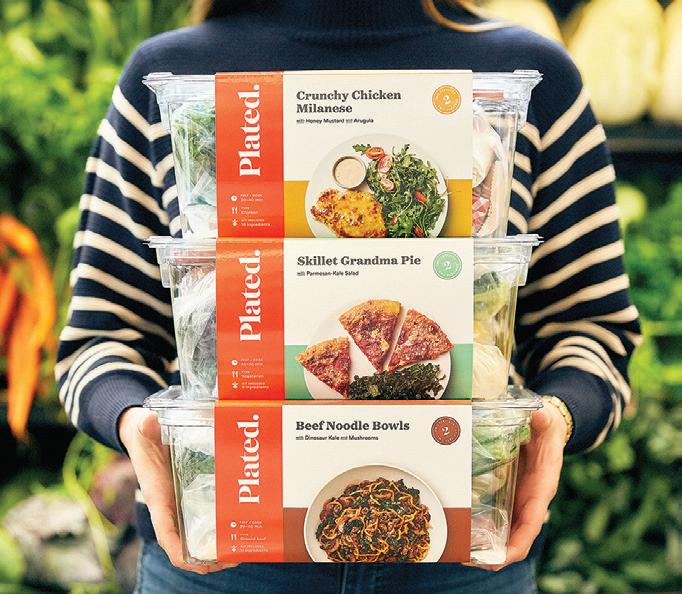
• Crunchy Chicken Milanese with Honey Mustard and Arugula;
• Roasted Chicken au Jus with Orzo and Peas;
• Beef Noodle Bowls with Dinosaur Kale
and Mushrooms;
• Steak Frites with Creamy Shallot Sauce and Sautéed Spinach;
• Skillet Grandma Pie with ParmesanKale Salad; and
• Pine Nut–Crusted Salmon with Creamy Tomato Farro and Roasted Green Beans. By the end of 2018, Albertsons Cos. plans to stock Plated meal kits at select Albertsons, Safeway, Vons, Jewel-Osco, Shaw’s, Acme, Tom Thumb, Randalls, United Supermarkets, Pavilions, Star Market and Haggen locations. The pilot started in 20 Safeway stores in Northern California and 20 Jewel-Osco stores in the Chicago area.
“We are excited to have Plated meal kits in our stores. Plated’s culinary expertise allows us to offer customers premiumquality, chef-designed recipes for amazing meals they can prepare at home,” said Pat Brown, group VP of merchandising and strategic initiatives for Albertsons Cos. “Plated is not just a meal kit, it’s a culinary experience. That’s what sets us apart. Our customers learn new techniques and can experiment with delicious and culturally diverse recipes.”
years. It’s been an unimaginable job that they’ve done, and we couldn’t be prouder of them.
You’ve been in a remodeling a new store campaign for how long now?
We’d been remodeling our stores right along. But after we bought Safeway, we went in a lot of stores and did things that you wouldn’t call a remodel but upgrades. Number one, their “Lifestyle” stores were extremely dark, so we put lights in all of them. They’re much brighter stores now; we get lots of good customer comments.
We tried to put a service meat and fish case in so that we had a butcher to take care of customers. Like I said, we put cake cases in most of the Safeways and added a decorator. We upgraded the quality of the produce and the meat, and we did a lot of work so that we could cut fruit and vegetables in-store. We had to have the rooms in the back that we could do that in.
So, the first thing we did was spent a lot of money upgrading the Safeway stores, while we continued to remodel our stores. Then, after the first year, I would say, we started a major remodel
In January 2018, Albertsons’ Own Brands label, O Organics, became a $1 billion brand.
The grocer’s fourth billion-dollar brand, O Organics features more than 1,000 products for customers to choose from, all of which are USDA certified organic and carry the USDA certified organic seal.
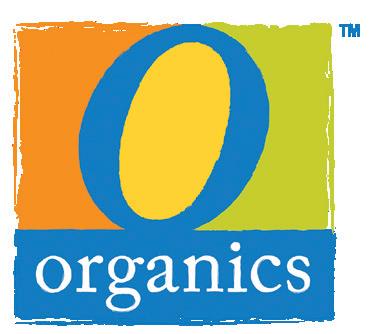
“Everyone should have the opportunity to go organic—whether you are selectively choosing a few organic products or you have fully embraced eating organics,” said Geoff White, president of Albertsons Cos.’ Own Brands. “That’s why we offer such a wide assortment of O Organics products, from fresh fruits and vegetables to wholesome dairy and meats, cereals, snacks and more. We are honored that customers love our O Organics and have made it not only the top-selling organic brand in our stores, but also a $1 billion brand.”
O Organics are available exclusively at Albertsons Cos. stores. In the most recent year, O Organics added about 200 new products and grew sales more than 15 percent. In 2018, the company expects to introduce 500 or more new products under the O Organics line, from produce, dairy and meats, to deli, snacks and baby items.
“We are passionate about offering great-tasting and high-quality products to the neighborhoods we serve,” White said. “Introducing new and certified organic products for every eating occasion is a great example of how we are constantly delivering and staying ahead of consumer trends.”
The brand was launched in 2005 to make organic products available to more people at a value price. Albertsons Cos. manufactures a number of O Organics products, including yogurt, salsa, ice cream, milk, pasta sauce and sandwich bread.
Albertsons’ other billion-dollar brands are Signature Select, Signature Café and Lucerne. The company’s Own Brands are created and tested at the company’s California innovation hub, the Culinary Kitchen and Technical Center.



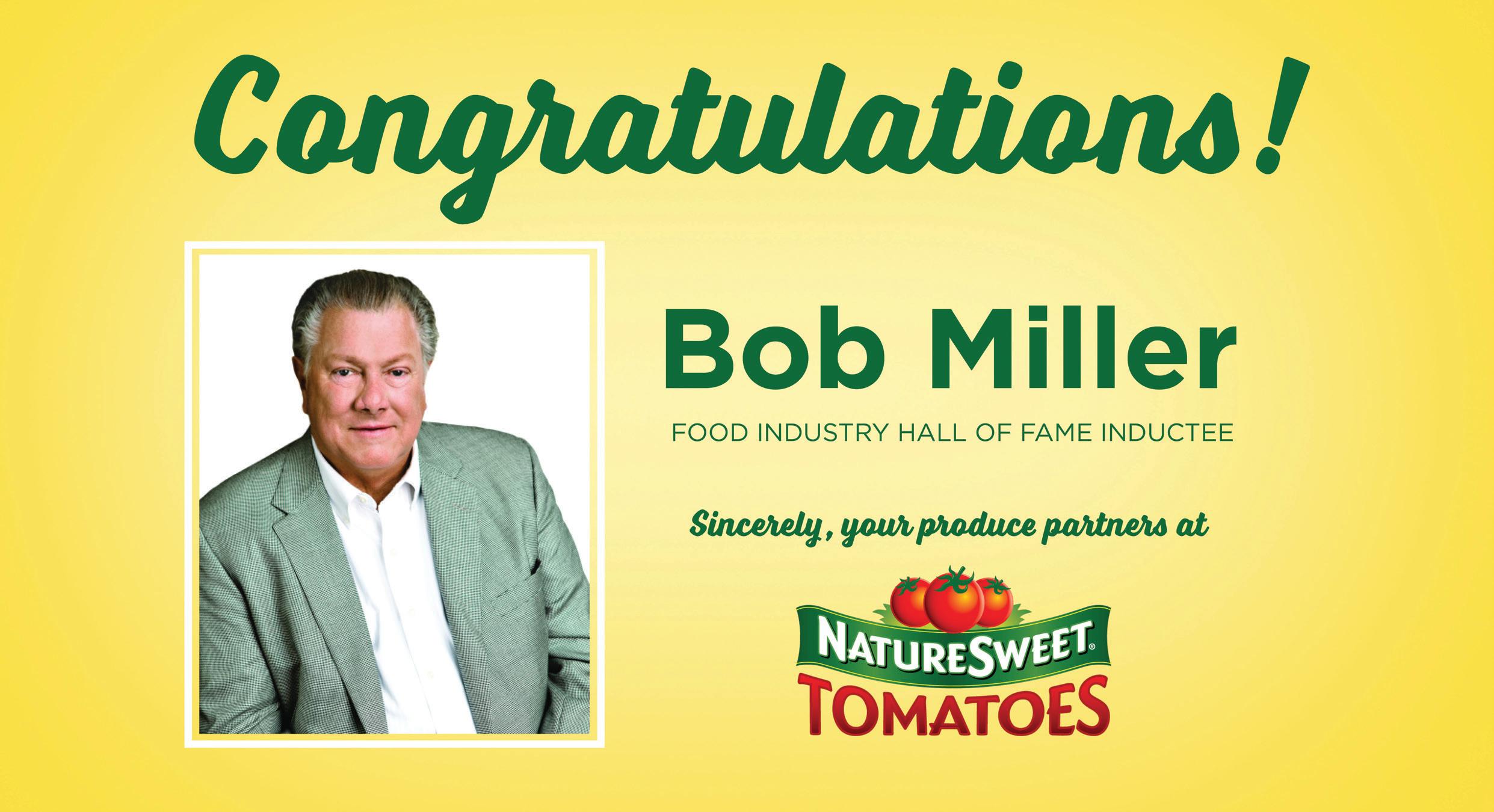
campaign where we are trying to remodel 10 percent of our stores every year. We’ve been doing that for three years, pretty close to that number. And we still continue to do upgrades in the stores that aren’t a remodel, so we’ve spent well over $4 billion in our first three years since the Safeway acquisition in capital.
So, our company’s in pretty good shape, and we are excited about continuing to spend remodel money, but also do some interesting things. Like if you go into our remodeled Pavilions stores in Southern California, you’ll see a store for the future.
And you should go in our store right here that we just opened (Albertsons on Broadway in Boise); it’s the store we’d like to build in a lot of places.

I was just in there this morning.
They have lots of service, lots of foodservice, high quality.
The Market Street banner that was acquired along with United Supermarkets—what made you want to take that to other markets outside of Texas (Market Street Idaho)?

Because it’s so successful. Big volume. The fresh mix in those stores is probably 10 percent better than a
conventional store. Our fresh mix is over 40 percent of our business in the company; in those stores, it’s much higher than that. We make money, we have high quality, we have lots of foodservice, and that’s really a knockoff of what we’ve done here (in Albertsons on Broadway). This is a Market Street, really. This one we put a lot more grocery. I don’t know if you noticed the grocery variety down the aisles, but there’s a lot of variety that’s there. Stuff that people can’t get.
So Market Street has a place. We’re going to try to build what we’ll call a flagship store in most of our divisions. I think it’s an opportunity for the division presidents to see some things that work that they may want to do in other stores. So, we are excited about that concept.
You are entering in a new chapter here, as chairman of the board. What does that look like?
Well, it’s a week old, so I don’t know.
But here’s what I feel really good about. Number one, we have a terrific CEO (Jim Donald). I’ve known him since 1977, met him in Florida. I was the head of merchandising for our Florida division. He was an assistant manager in a store. I went to that store to cover the inventory, so I was there from 4 to midnight
and this kid was running around the store every minute. I said, “This is a guy I have got to watch and help.” So I helped him move along in his career and he was always successful. He helped me in Florida, and then when I was in Boise, I promoted him to run the Arizona division—we called them vice presidents then. Jim and I go back a long way.
He asked me to be on the board of Pathmark when he was chairman and CEO there, and I got him on the Rite Aid board about the time I was leaving that board. I’ve known Jim and Laura for 30-plus years. I talk to him all the time. He’s a quality guy, a good friend. And about eight months ago I asked him if he was bored because he hadn’t been working for a while. He said, “No, I’m having fun.” I said, “Well, that’s too bad, you’re coming back to work.”
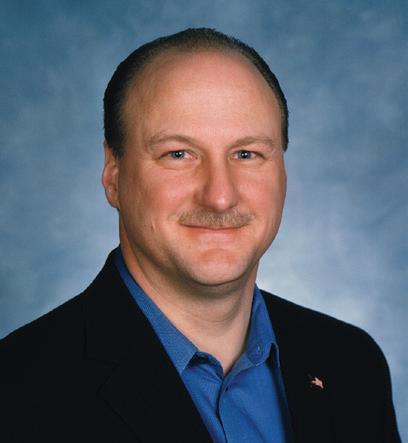
And I’m tickled that he’s here and he’s willing to take the CEO job and take it to the next level because we are ready to do that with all the things we’ve gotten done the last three and a half years.
Not only are we proud of where we are, we’re proud of our banners. Today, we have seven banners that are over 100 years old. Our oldest banner, Shaw’s, goes back to the Civil War, and that’s important because we think they are great brands, but also when I go into stores—and I go into a lot of stores—I speak to customers and they say, “Yeah, my mom and my grandmother shopped here.” So, we have generations that have shopped with these brands, and we want to continue to try to invest in them, make them better and take care of customers and we have the opportunity to do that. Plus, when you think about the history of those brands, we have locations today we couldn’t even think about. They are one of a kind—first in Maine, no new competitors coming—we have to take care of those companies and those locations and customers. I’m excited about the opportunities we have.
SHANE DORCHEUS EVP Operations, Southern California and Southwest Divisions President Bob’s is a simple formula and he
I remember being at a golf event when a well-known vendor walked up to me and told me he heard Bob Miller was going to be there. I confirmed that was the case. He then asked me if he could meet him. I said no problem and introduced Bob to him, as Bob was standing right next to me. As the introduction took place, the vendor expressed he felt like he was meeting a legend. Bob concluded the greeting with, “I am a can stacker.” It was both cool and funny!

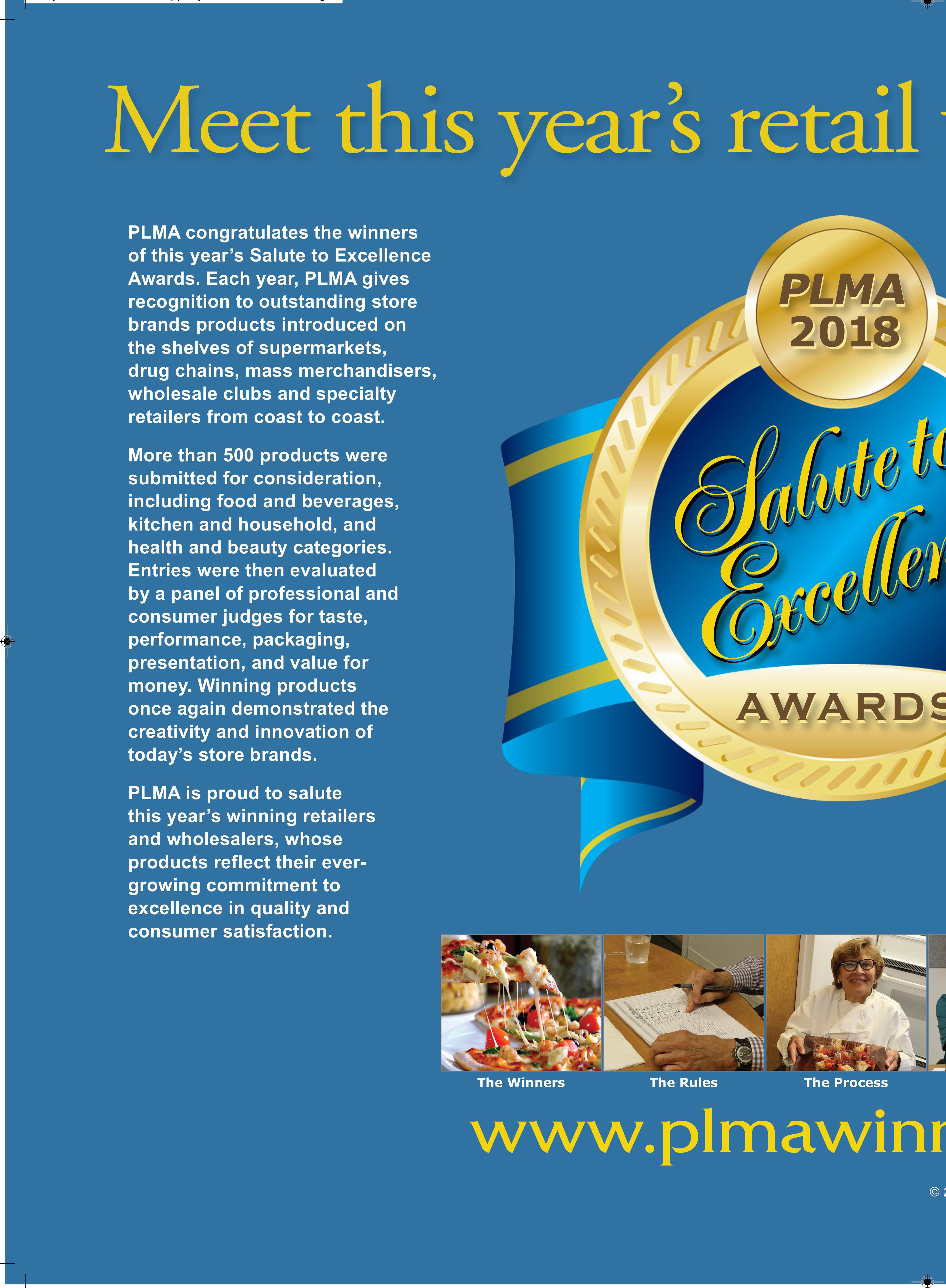
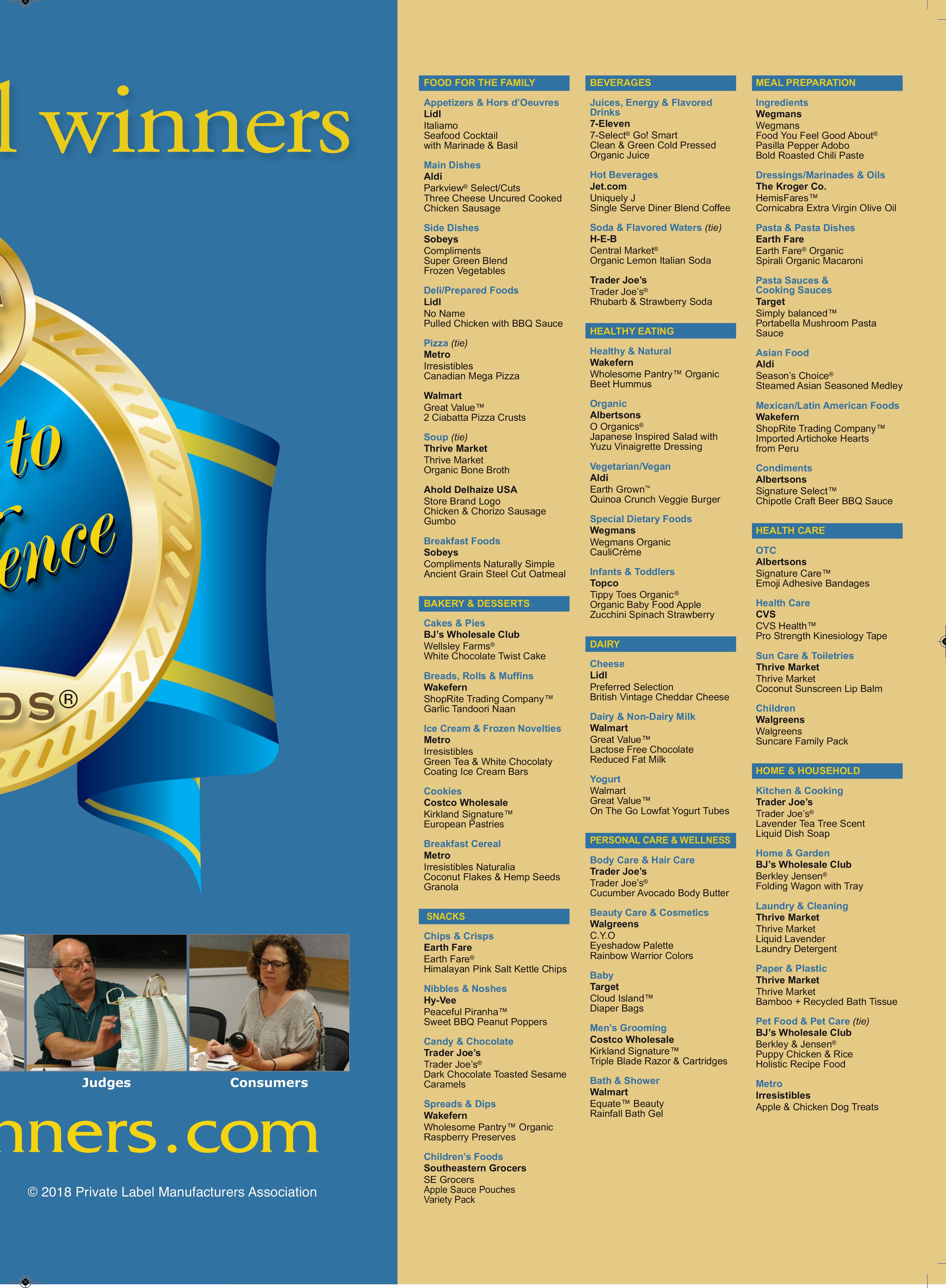
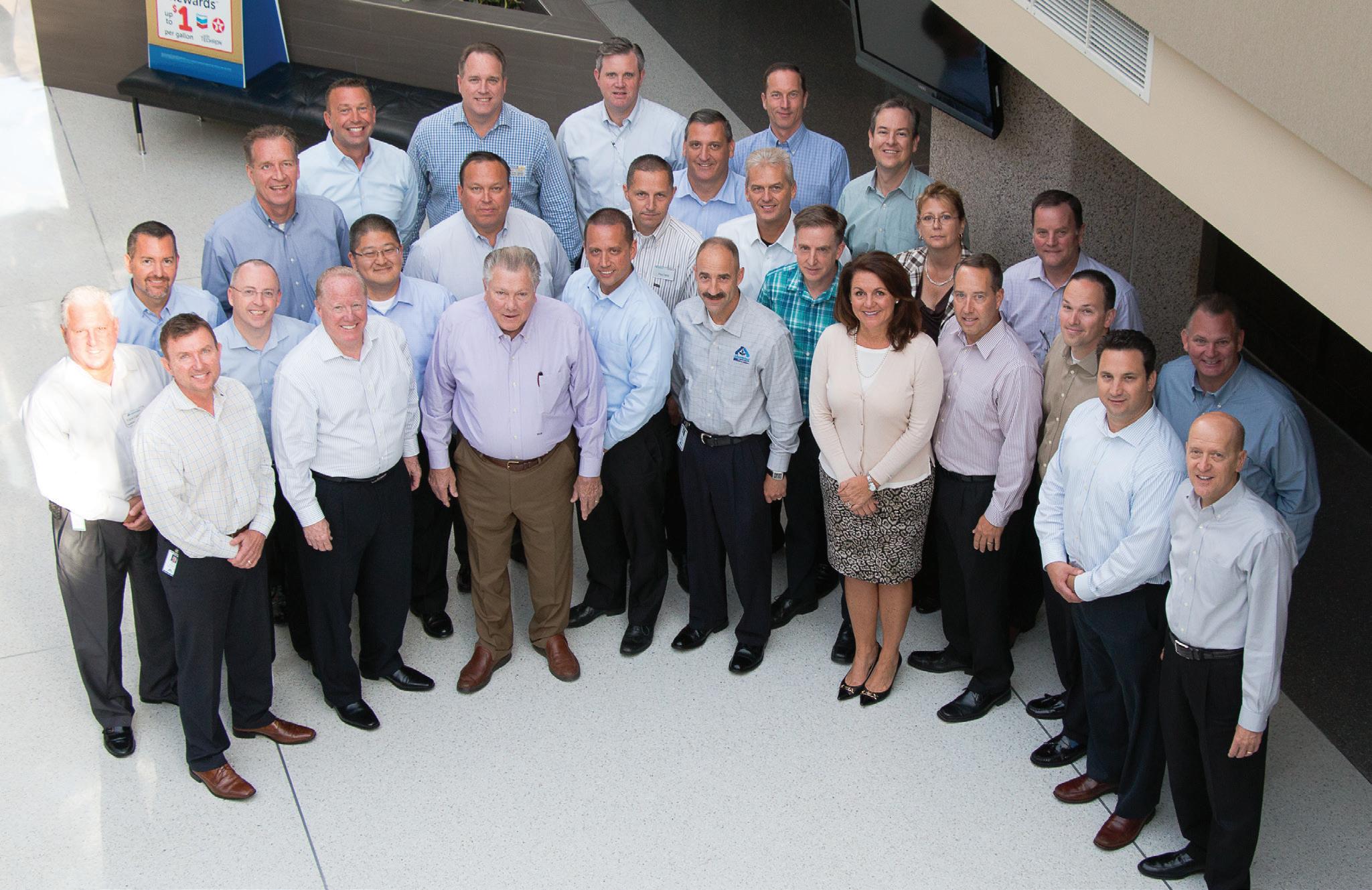
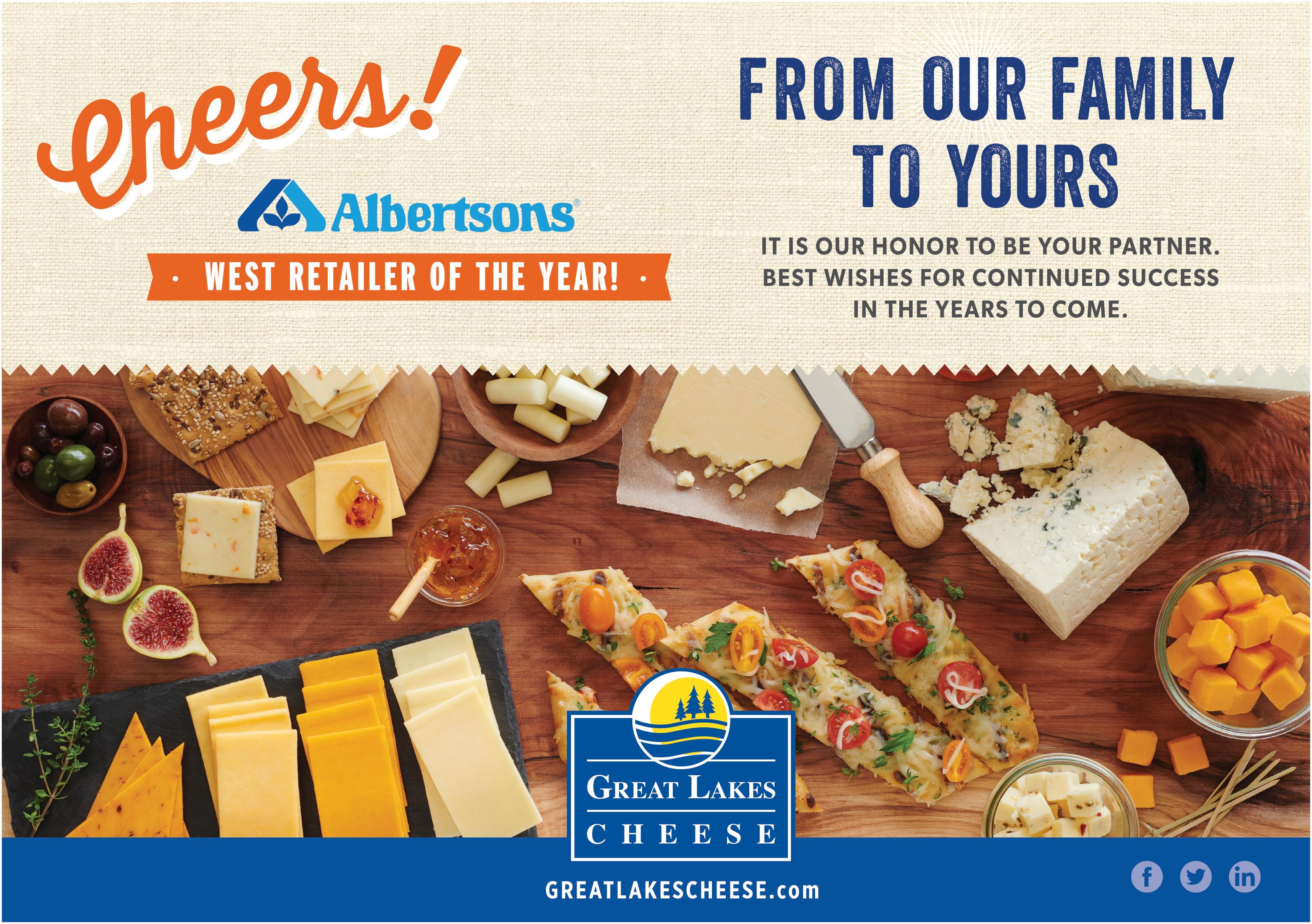
I’d be interested in your comments about the Amazon format, the grab-and-go stores that they have and the delivery systems now that are real popular.
Well, let’s go back to 2002. Safeway started a home delivery business on the West Coast—Seattle through California. Amazon started in about the same time, I don’t know exactly, with their home delivery business. Safeway’s has grown double-digits just about every year since then. So, we know how to run home delivery business and we’ve grown the hell out of it. Now we’ve expanded that business into other cities, and we are in 11 of the top 15 largest food markets in the U.S. with our own home delivery business. It’s a white-glove service; our employees will take your groceries right to your kitchen counter when you order from us. And we have 1,000 refrigerated trucks on the road. Freezers, refrigeration trucks that will deliver your product in really good quality. And we are doing other things now where we can drop it at the door if you want.
We also have Instacart in 2,000 stores, which is growing like crazy. So we are in the delivery business. I think we are well ahead of even Kroger in the delivery business. We are behind them in the drive up-andgo business. They took a different route. We are now ramping that up. We are planning to be in 500 stores by the end of the year.
So even though Amazon is here now, we’ve been developing that business for a long time and we feel good about where we are at. Amazon—people are like “wow, they are going to really be a factor”—well, there are 400 and something Whole Foods, and only 200 of them compete with us. I mean, we are not going to have a Whole Foods in Minot, North Dakota, that’s for sure. So, we have a lot of markets that we are not worrying about Amazon in.

Now, on the other hand, there are things in our stores that people are going to order from other stores just because it’s quick and easy. There’s no way you can ship one item overnight to get there the next day and make money, so I tell my wife, “if you want to order something from Amazon, the only way you can do it is if you order one item, make sure that they pay more shipping costs than the item retailed for.”
But they have unlimited resources. They are a
different animal, so you can’t underestimate them. But I think brick and mortar is here to stay.
I agree.
Our job is to run better brick-and-mortar stores so customers want to shop with us. And segment our stores so we have the right thing in the neighborhood it’s in.
We are excited about El Rancho, a Hispanic format
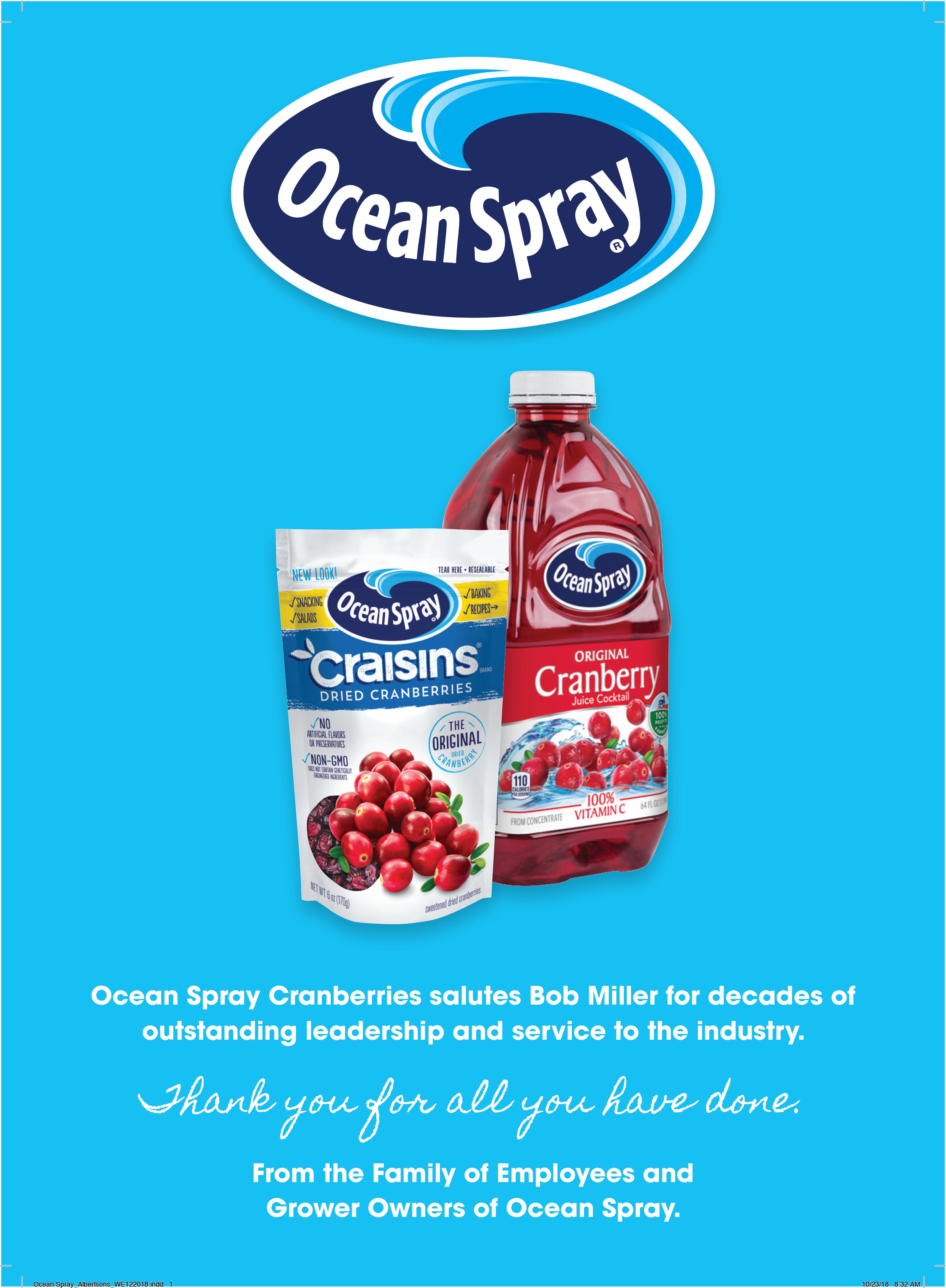
that we own 49 percent of in Texas that’s growing. We are excited about our Lucky banner in Salt Lake that’s a low-priced operation that’s doing really great, and we are going to roll out more of those. So we are not just sticking to conventional stores.
El Rancho is being managed and run by the same people?
Same people.
And that’s what you do with most of your acquisitions; you leave them alone for the most part and they run their own businesses.
Yes, like United (Family of Stores) that we bought— we’ve never put somebody from outside United into that company to help them in four, five years almost. Now, we have taken a couple of people out of there
to go somewhere else, but Robert Taylor was the CEO when we bought it and he’s the president now and he runs that division. We’ve actually given him our West Texas and eastern New Mexico stores, so his company was 50 stores, and it’s 130 or so now.
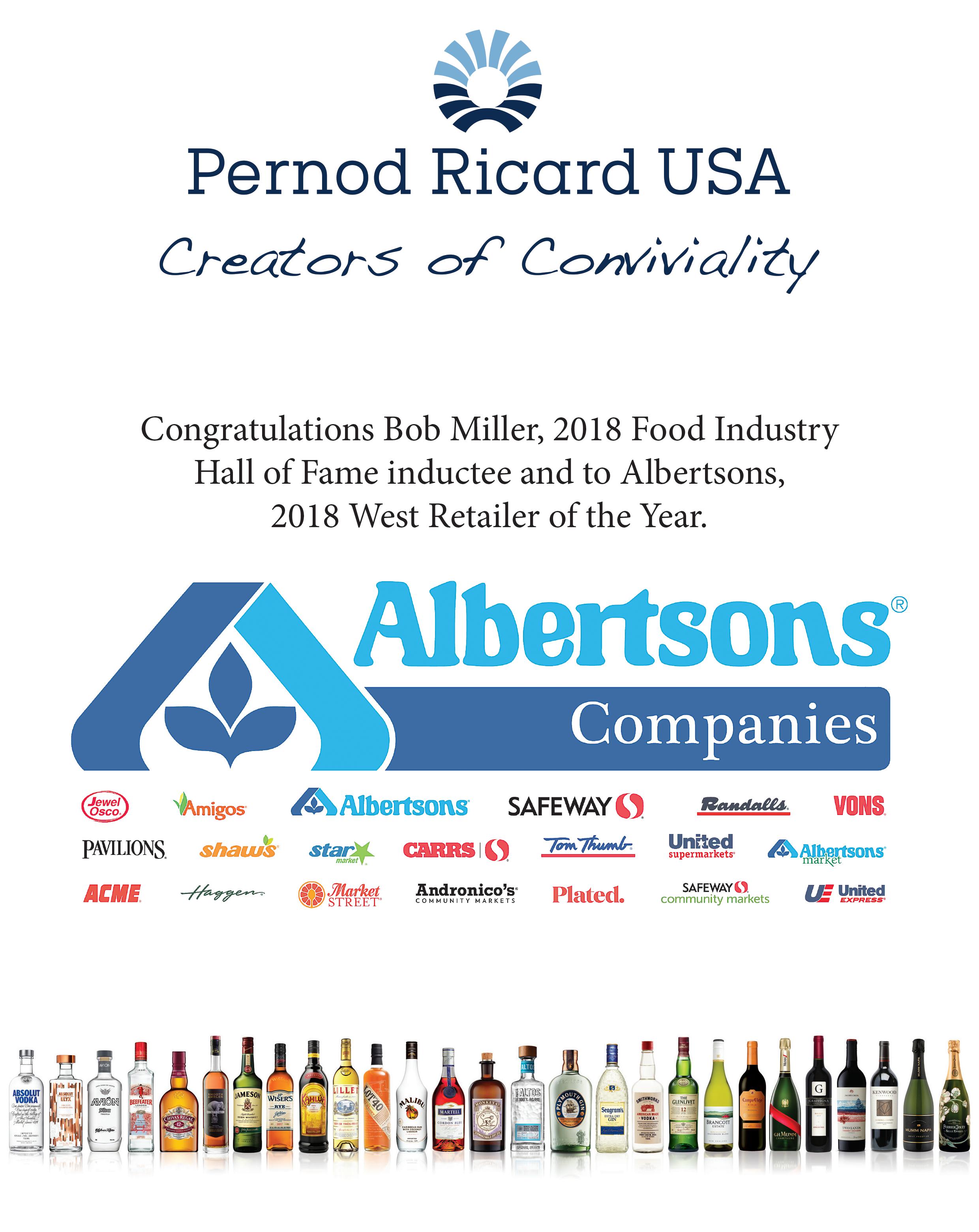

Has that been one of your favorite acquisitions?
It’s been a great one. But there have been a lot of good acquisitions. We bought seven stores in Idaho, Paul’s Markets. We closed two and the other five are hitting the ball out of the park after we remodeled them. We buy a lot of little ones and twos and threes, and a lot of people, a company our size, wouldn’t get excited about those things. We get very excited about them.
Is there anybody that’s coming into the picture
now that you are concerned about?
Well, we talked about home delivery, and you know if that becomes 10 percent of the business, we’d better get our share of that or that would hurt.
You are already investing in that.
Yes…I’m not too worried. I mean, we are doing the right things there.
I think there are other things that worry me more, and one is technology. We are spending lots of money on artificial intelligence. We have seven major projects we are working on, checkout being one of the big ones. What’s the new way to check people out? You are talking about the Amazon Go store–you know it’s got 1,200 items. It’s not going affect many people. It’s going to hurt convenience stores and restaurants. It’s got lots of bells and whistles, it’s fun to talk about, and they’ve got the money to spend on bells and whistles anytime and anywhere they want.
But we want something in our front end that is…we usually don’t want to be ahead of the curve. We want to watch what other people do and then react quickly if it’s working. Here, we are spending lots of money looking at different things in the front end, including things that are not in the U.S. because we have to figure out how to check the customers out more efficiently and faster.
On the other hand, one of our real strengths is a lot of the checkers we have in our stores have been with us a long time. When you visit a lot of stores what you see sometimes is four or five checkstands open and a long line in one of them. And you know right away that that’s somebody who has worked for us a long time and people love. In fact, we have a store in Boise that was featured in the local news here where one of our checkers, a guy, he’s so friendly that people can’t wait to come in and say hi to him in the morning. We gave him a special award for being such a great employee.
TODD BRODERICK
Denver Division President
I first met Bob following the merger of Albertsons and Safeway. I had always heard that Bob was a “people person” as well as a champion of our employees. Bob proves this true whenever we visit stores together or interact with employees in our office, regardless of position. It’s not only the personal interaction and conversations Bob has with our employees but more important, it’s how he makes them feel about the value of what they do and the role they have in our success.
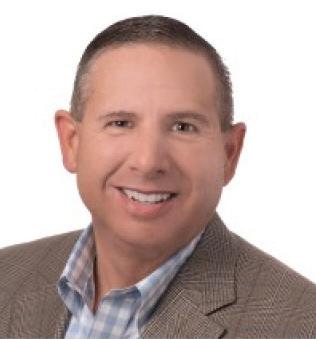
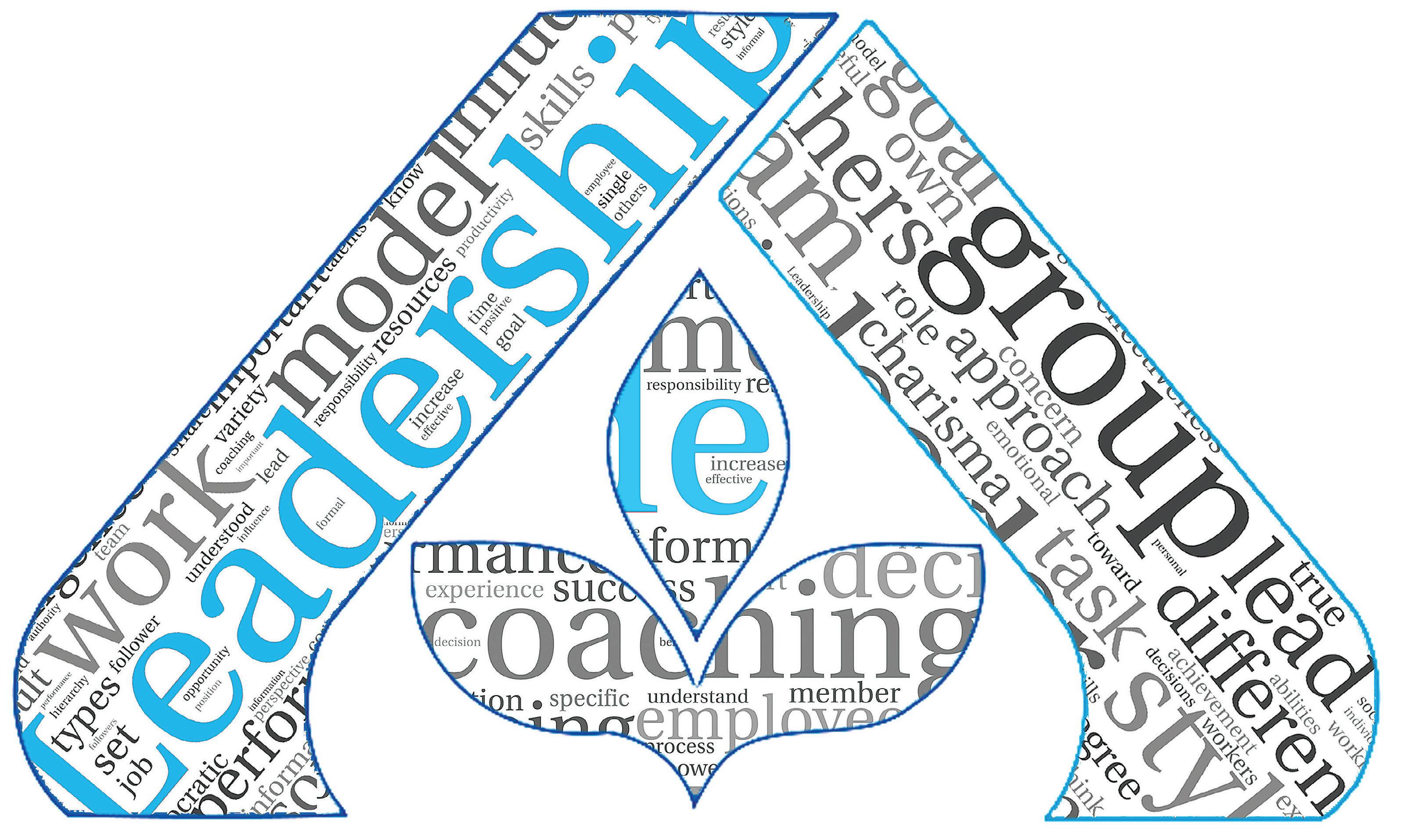
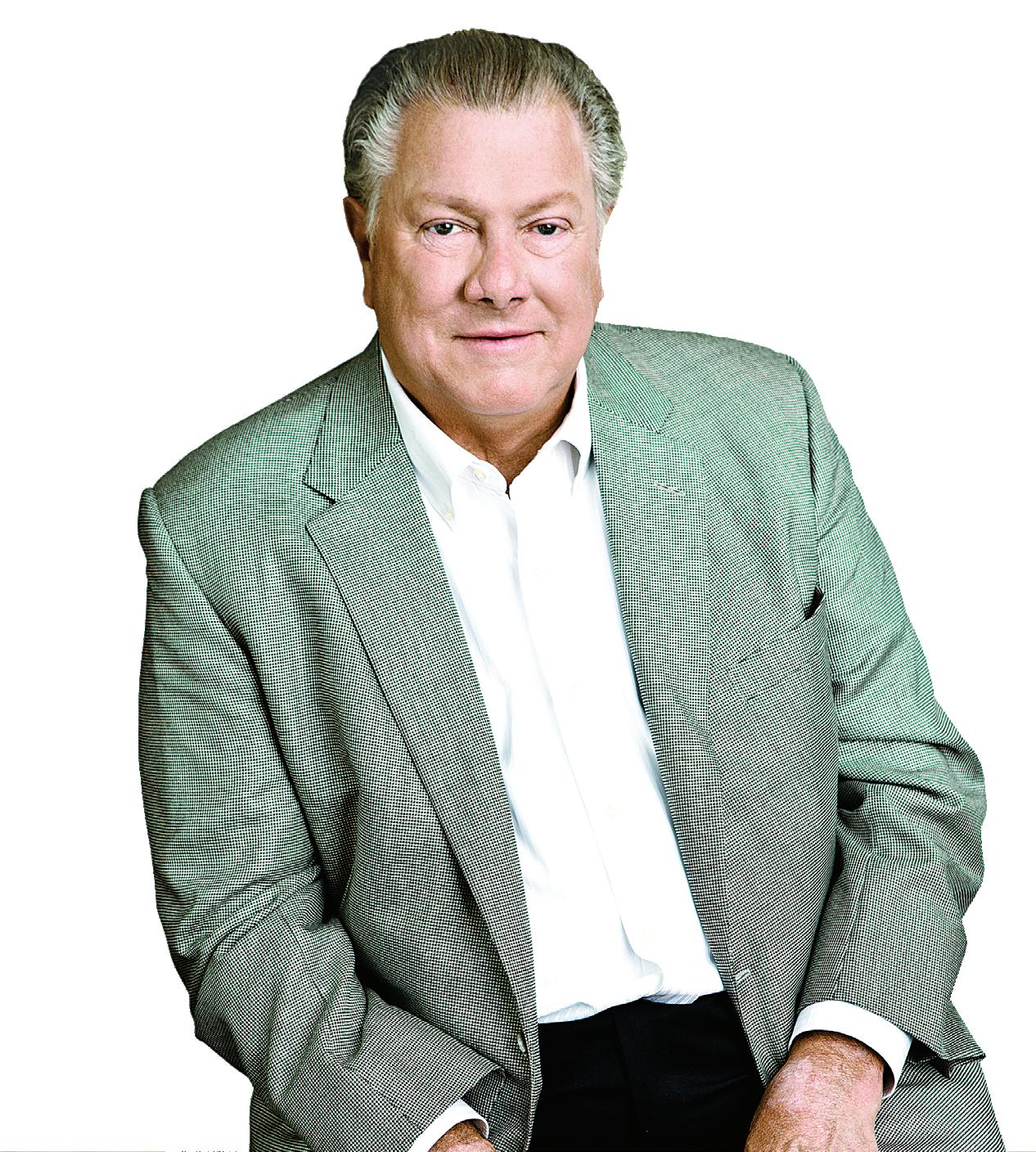

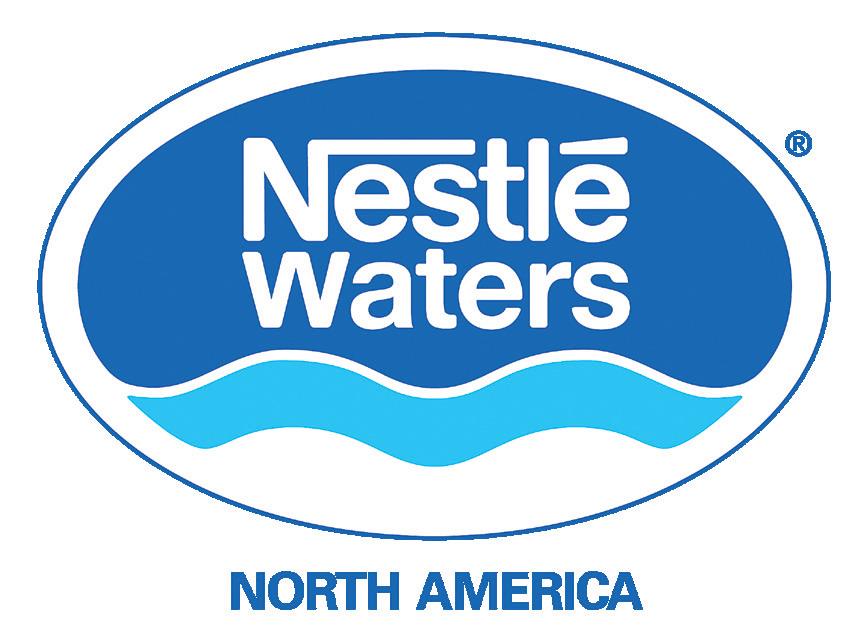

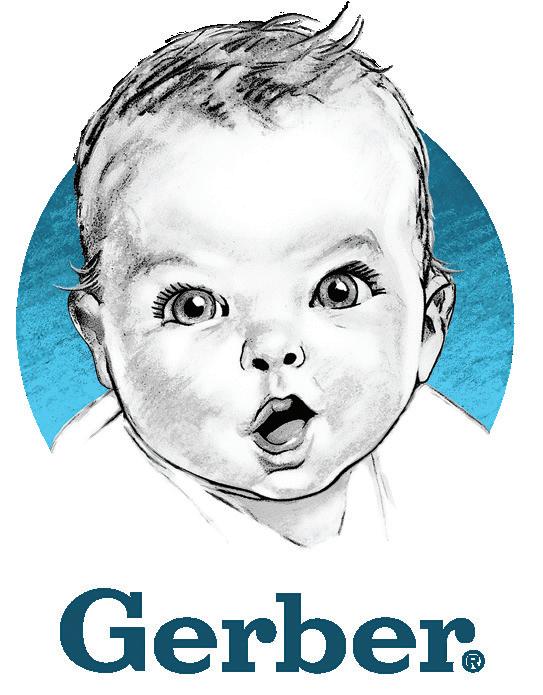
Bob Miller describes the new Albertsons on Broadway store in Boise as “the store we’d like to build in a lot of places.”
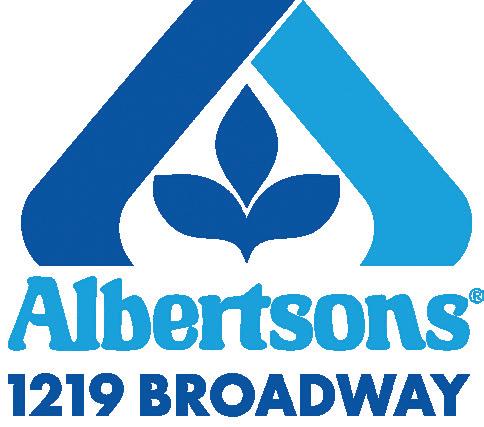
Shane Sampson, EVP and chief marketing and merchandising officer, added that it’s a “kind of next-generation Albertsons.”

The store—which is located just a few miles from where the first Albertsons opened in 1939—has a strong focus on the fresh departments, especially prepared foods, both hot and cold, Sampson added.


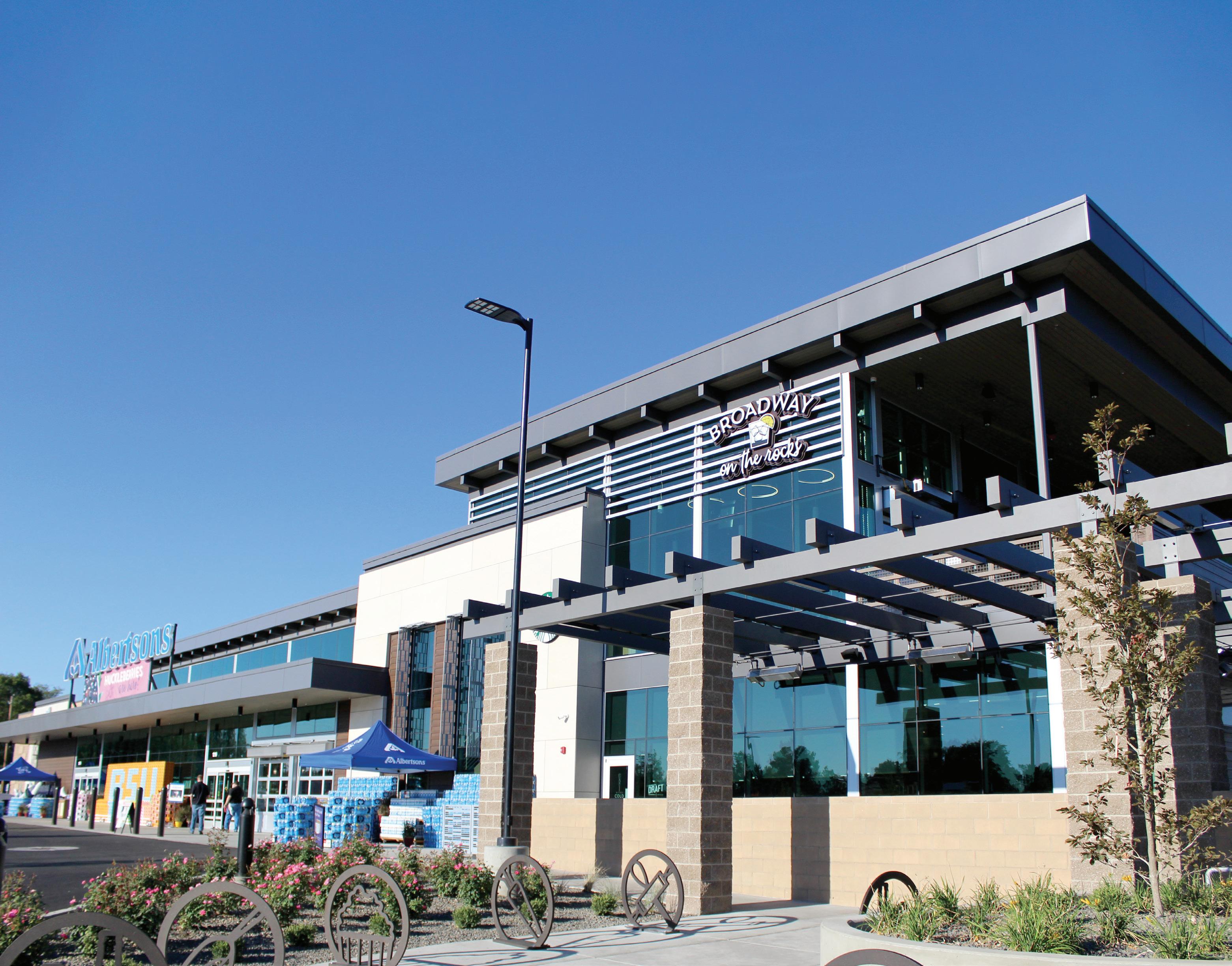
It opened in July this year.
John Colgrove, president of Albertsons Cos.’ Intermountain Division, said, “When we designed this store, we really did it to attract shoppers who were looking for something different that we can provide for them, yet what was most important was to make sure that we also provide them the items that they would buy every day. So, I like to call this store a ‘foodies’ getaway.’”
The store has elements of other Albertsons banners, like Market Street in Texas, Pavilions in California and Haggen in the Northwest. They were scouted for ideas along with the stores of other operators who compete with Albertsons.
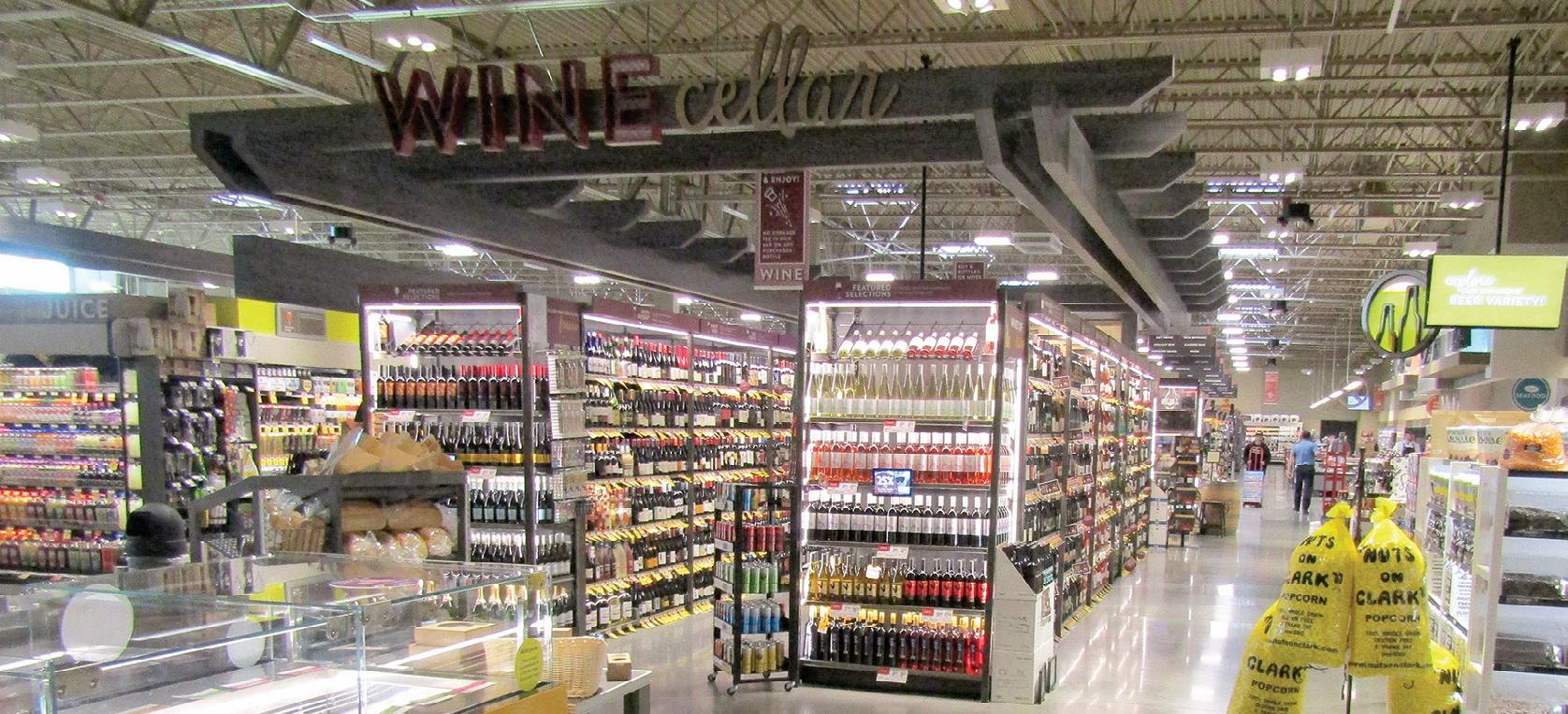

“We were really looking for ideas that we could bring here to Boise that had the ‘surprise and delight’ element,” he said.
A similar store is planned for Meridian.
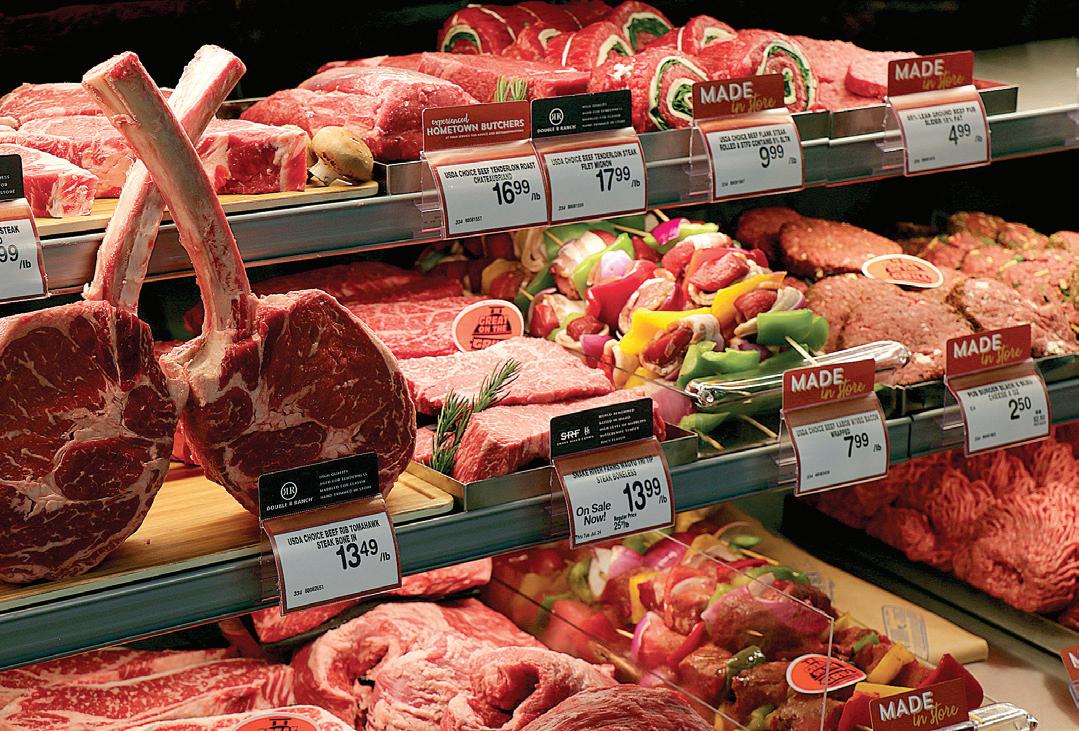



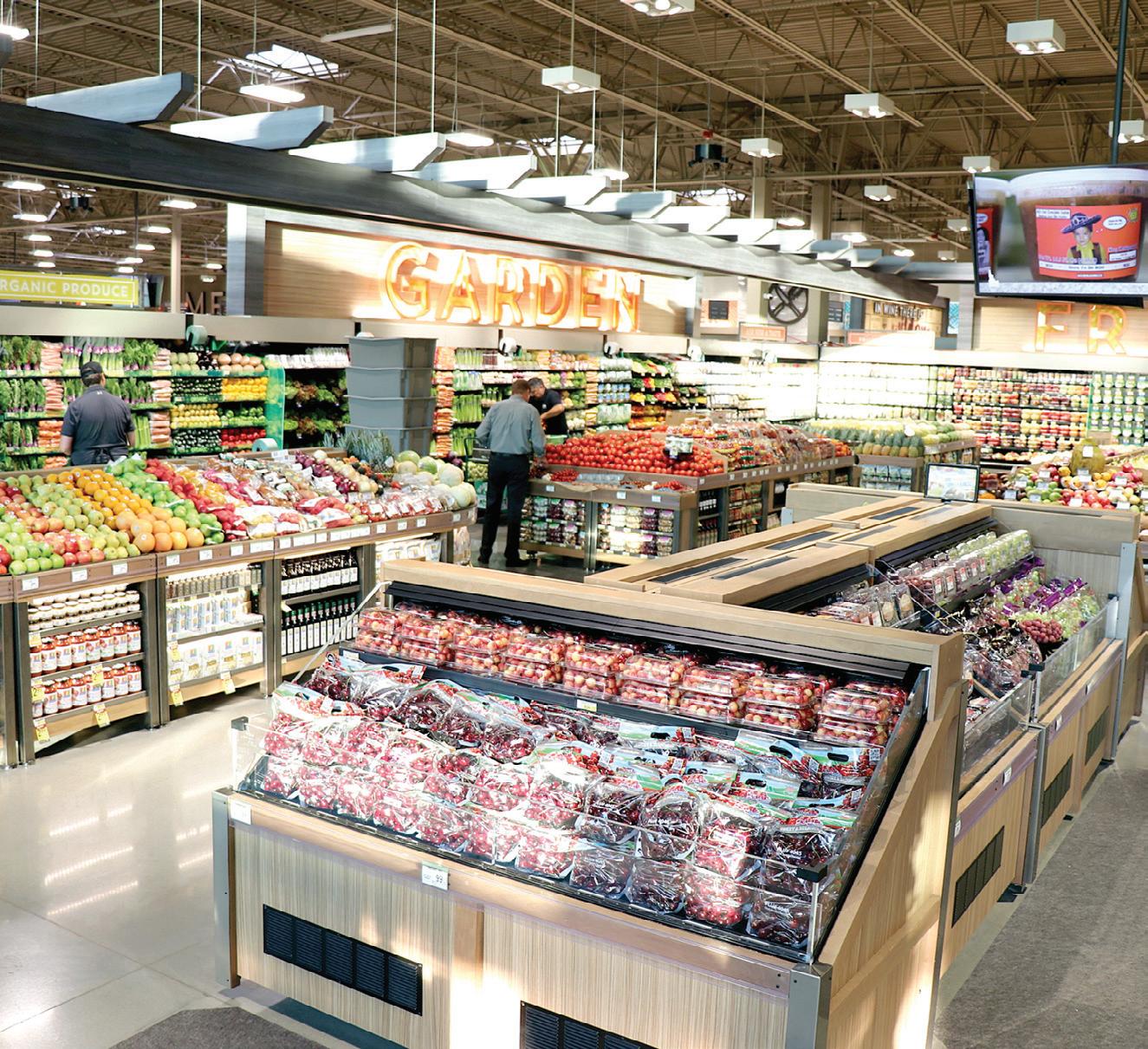

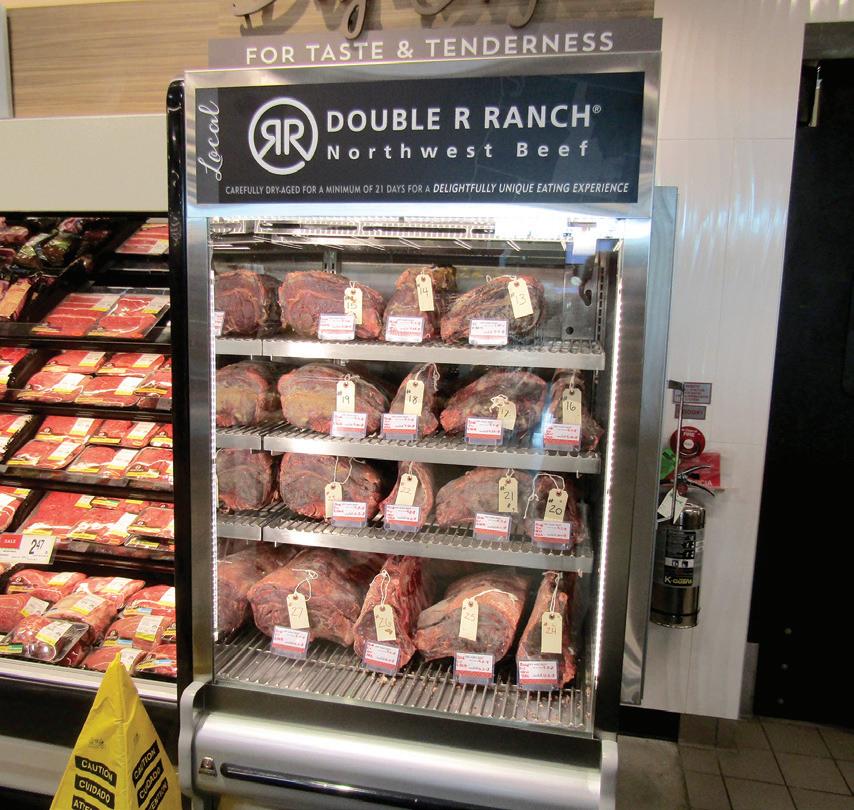
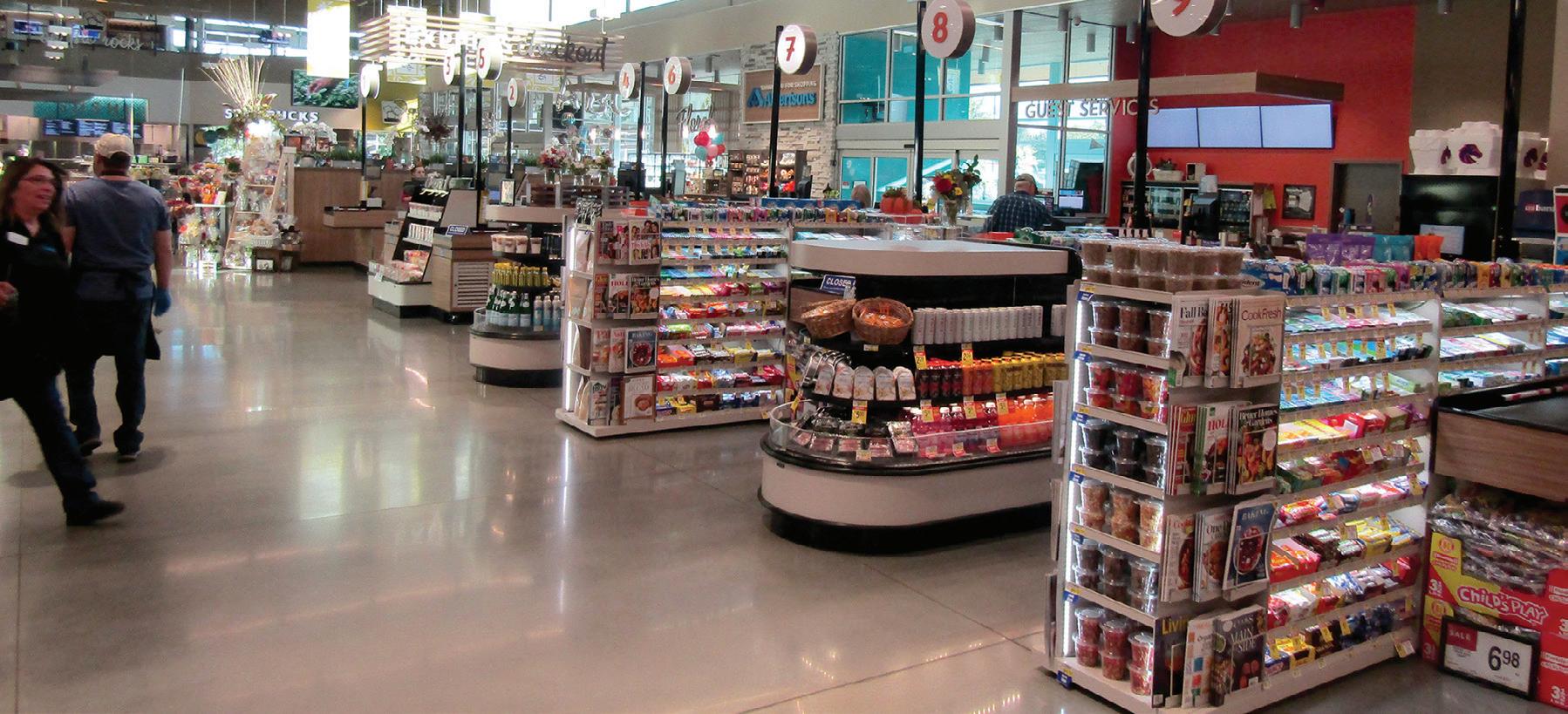

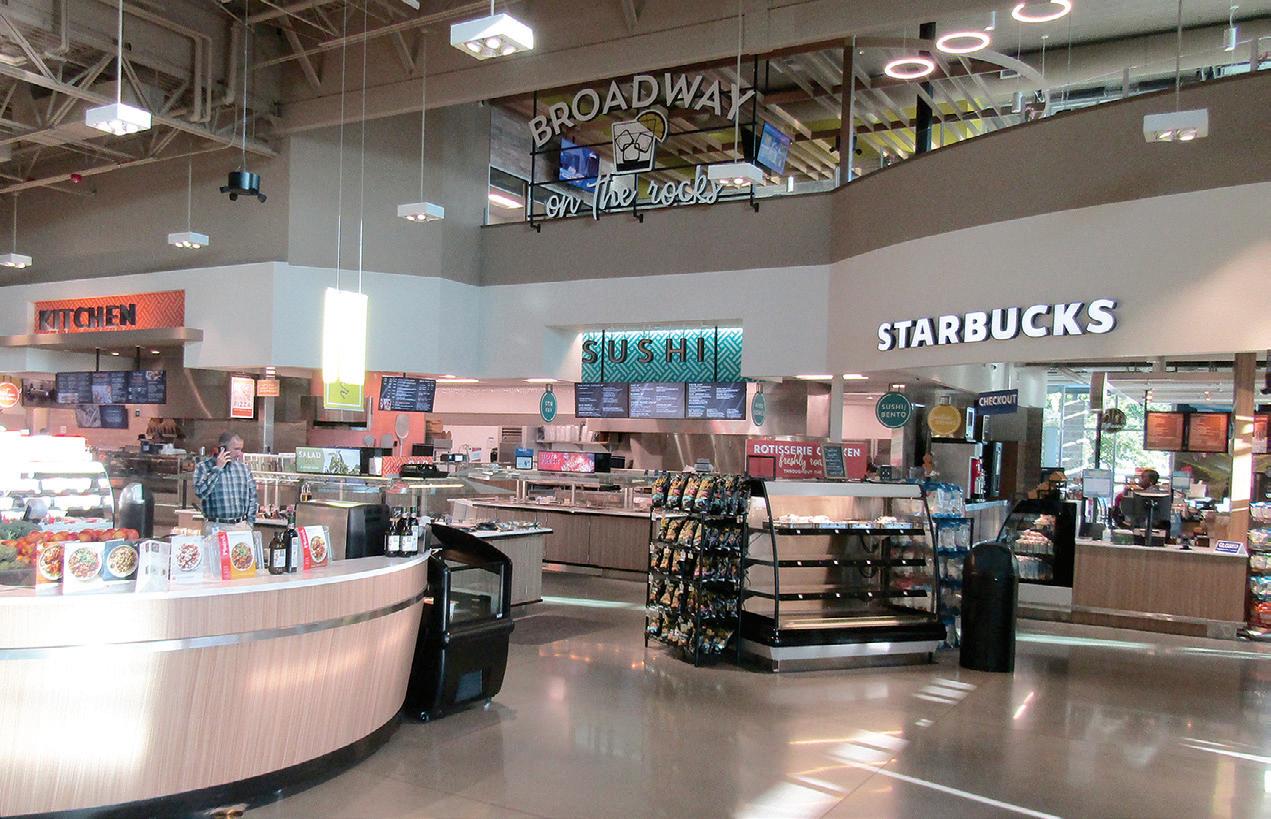
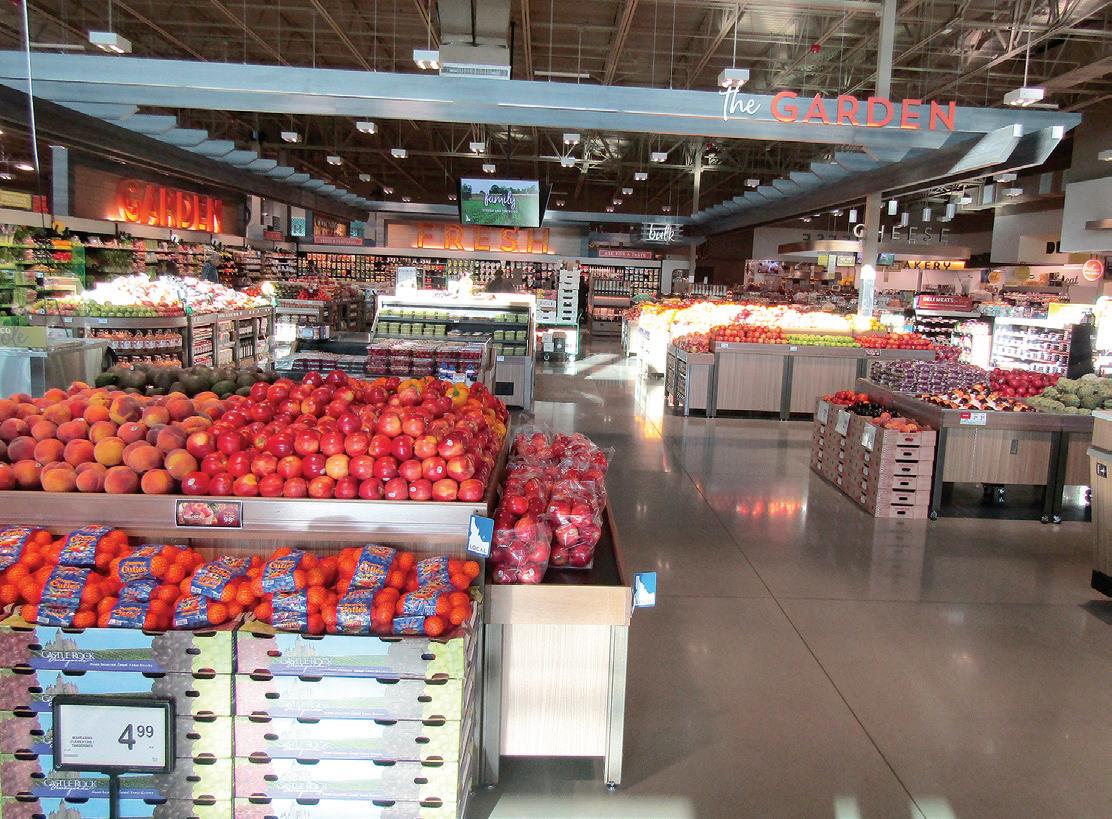



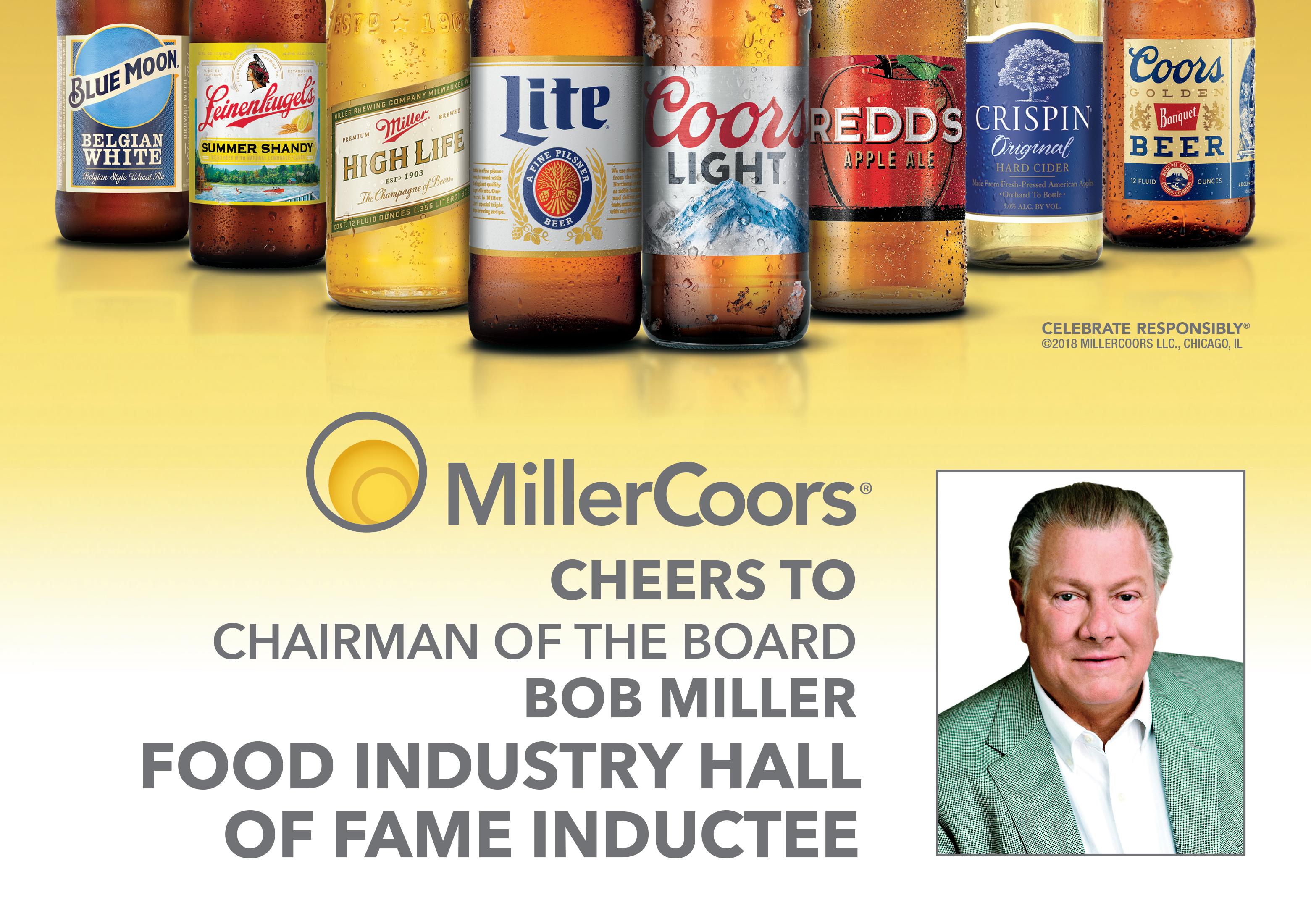
Through the donations of customers, Albertsons Cos. and Albertsons Cos. Foundation’s Hunger Is fundraiser to fight childhood hunger in America raised a record $7.2 million in 30 days.
The 2018 campaign, which engaged communities to support their most vulnerable citizens, raised enough to provide 22 million breakfasts for kids in the 2,300-plus communities in which Albertsons operates.
“I am blown away by the generosity of our customers,” said Albertsons Cos. President and CEO Jim Donald. “Their donations will fund 22 million breakfasts to kids in need and help us ‘Make Every Day a Better Day’ in the communities we serve. Together, through one- and two-dollar donations at a time, we are having a tremendous impact on the lives and the futures of young people.”

Throughout September, many of the company’s stores, including Albertsons, Safeway, Vons, Jewel-Osco, Shaw’s, Acme Markets, Tom Thumb, Randalls, Pavilions, Star Market and others accepted Hunger Is donations at checkout. All donations will benefit hunger relief organizations in the communities in which they were raised and will be extended in the form of grants.

Since the 2014 inception of the Hunger Is campaign, the initiative has had the following impacts on childhood hunger in America:
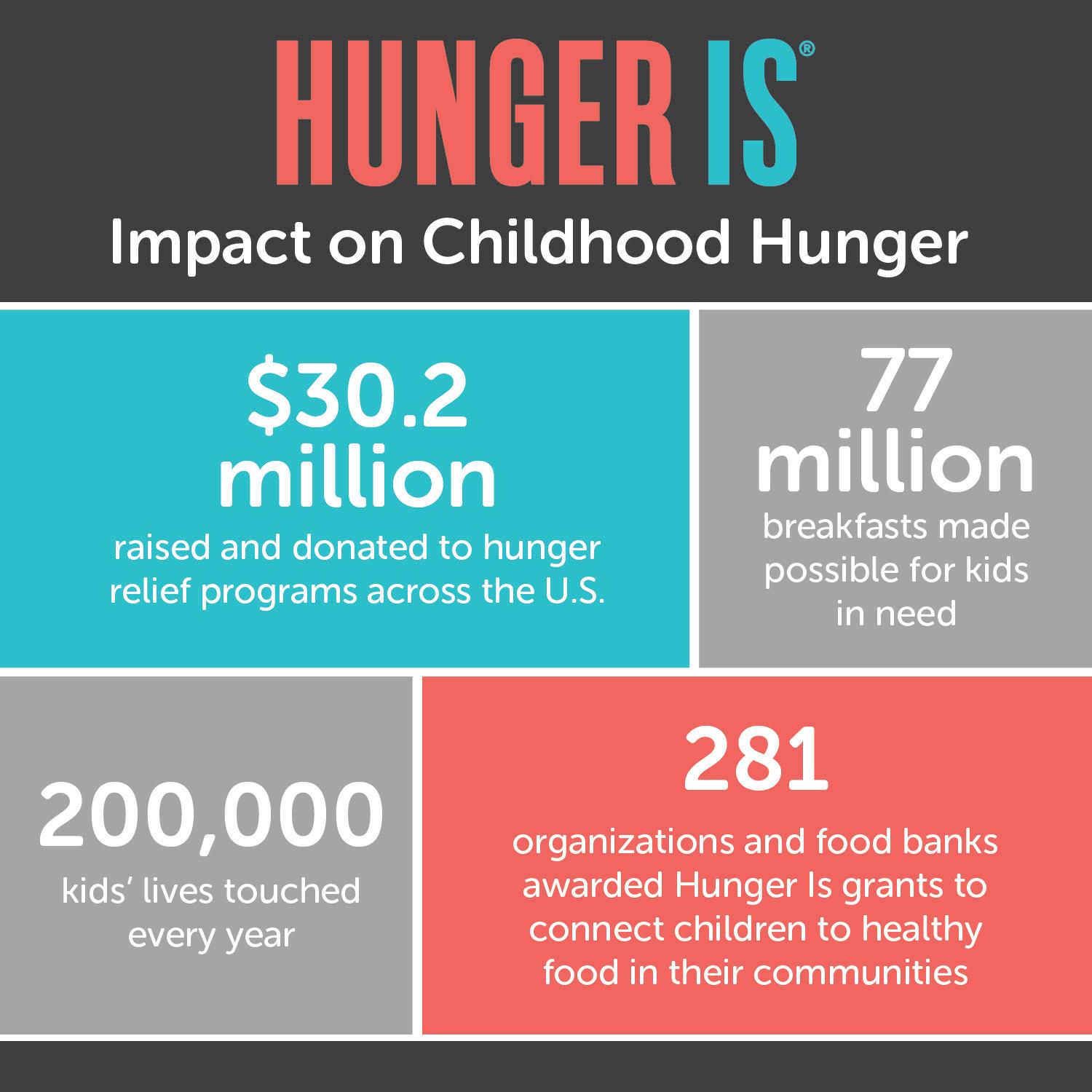
• $30.2 million raised and donated to hunger relief programs across the U.S.;
• 77 million breakfasts made possible for kids in need;
• 200,000 kids’ lives touched each year; and
• 281 organizations and food banks awarded Hunger Is grants to connect children to healthy food in their communities.
Funds from previous campaigns were granted to more than 270 organizations that perform critical work in battling childhood hunger. Organizations receiving Hunger Is funds are chosen by stores in cooperation with the Hunger Is Advisory Committee (HIAC) and Albertsons Cos. Foundation. The HIAC is comprised of leaders from the hunger advocacy organizations including Feeding America, Food Research & Action Center, Hunger Free America, Share Our Strength and WhyHunger.

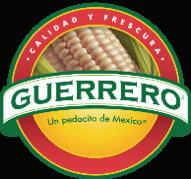
Since Joe Albertson partnered with L.S. Skaggs to open the first Albertsons store on 16th and State Streets in Boise, Idaho, in 1939, the company has been through more than its fair share of transitions, especially since the turn of the century.
The biggest came in 2006, when Albertsons was sold off—for $17.4 billion—to three buyers.
Supervalu picked up 1,124 stores to become the second-largest supermarket company in the U.S. It gained the Acme Markets, Bristol Farms, JewelOsco, Shaw’s and Star Markets banners, as well as all the Albertsons stores in Idaho, Southern Nevada,
Utah, Southern California and the Northwest. Also included were the combo-store pharmacies that operated under the Osco and Sav-on banners.
CVS Corp. acquired the company’s stand-alone drugstores—about 700 of them—as well as a distribution center.
And a consortium led by Cerberus Capital Management acquired 655 stores and their related distribution centers and offices in the Dallas/ Fort Worth, Florida, Northern California, Rocky Mountain and Southwestern regions. These stores would operate as Albertsons LLC.
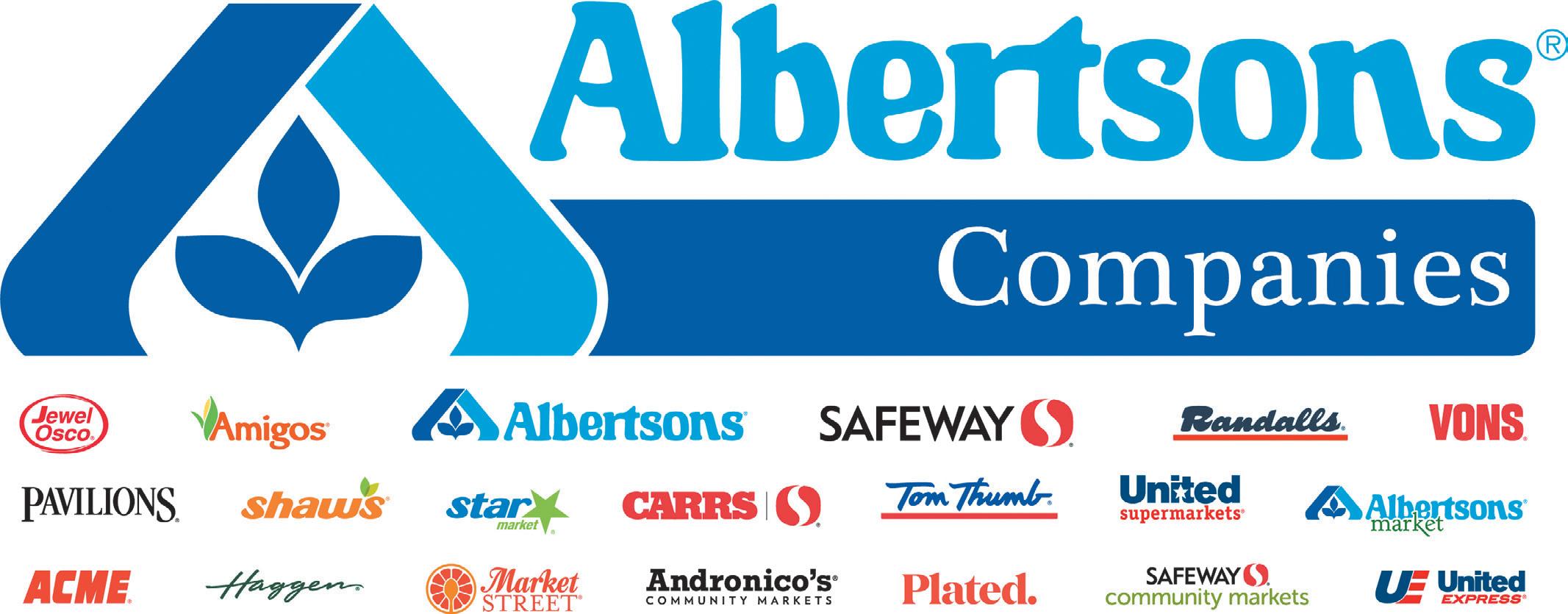
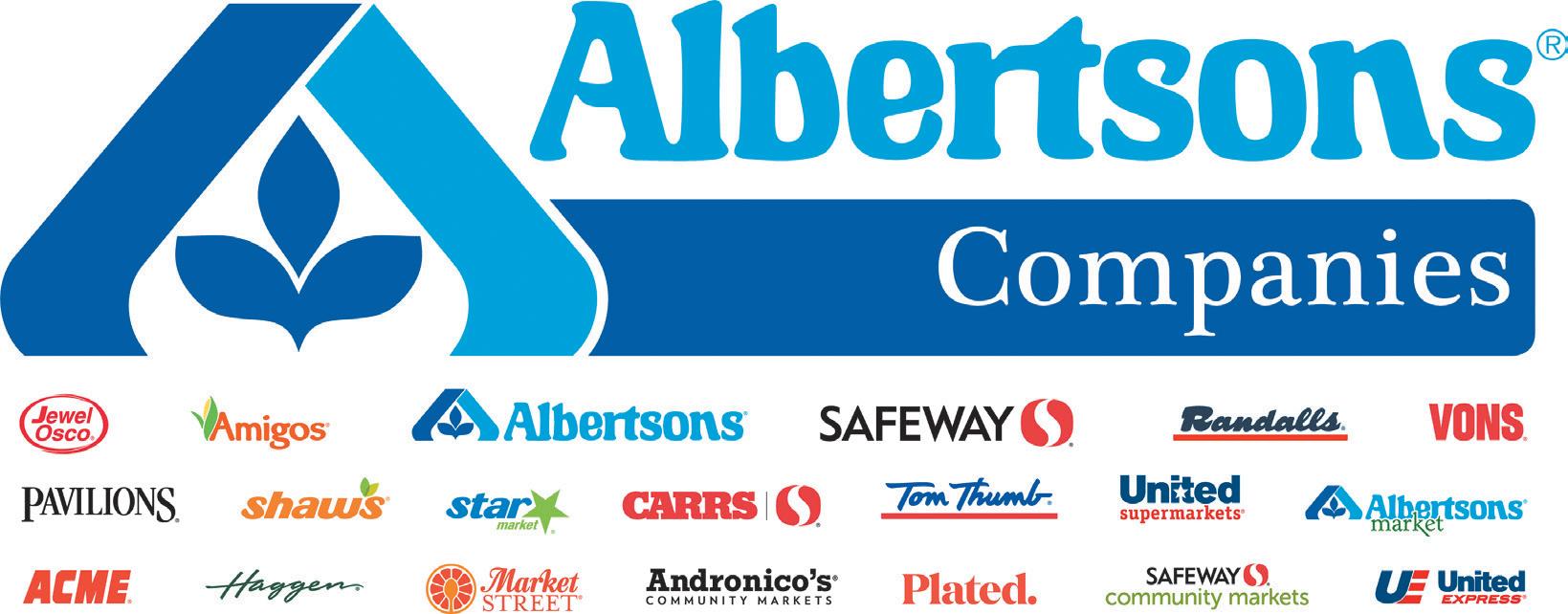
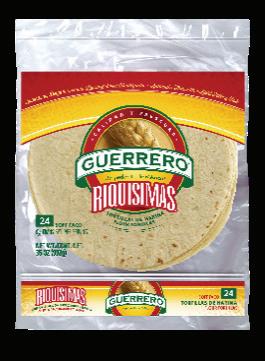
Larry Johnston, who was chairman, CEO and president of Albertsons at the time, said the deals represented a “successful conclusion” to the company’s search for strategic alternatives.


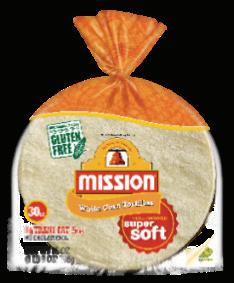
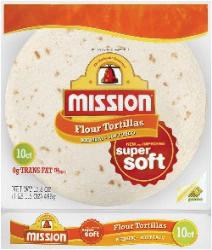
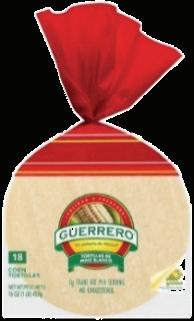

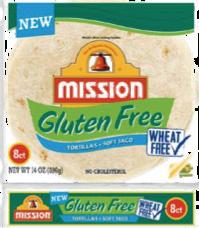
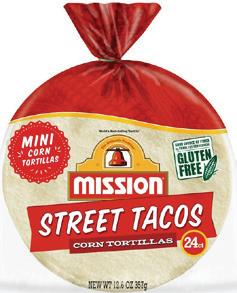

But Albertsons would rise again.
By 2013, Supervalu had decided that retail food stores was not where its focus should be, so it sold 877 retail stores back to Albertsons LLC, as it was known at the time. That would give Albertsons LLC 1,069 stores, 12 distribution centers and about 110,000 associates.
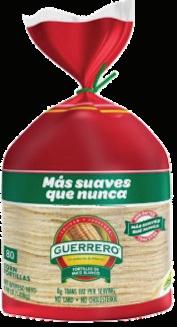
Bob Miller—who today is chairman of Albertsons Cos.— had been tapped by Cerberus to lead Albertsons LLC, and he was pleased to get the stores back, some of which he had helped open during his previous 30-year career with Albertsons.
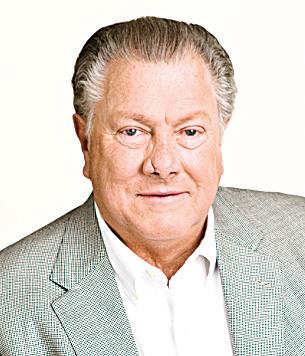
Miller said at the time, “We are very excited about the opportunity to acquire Acme, Albertsons, Jewel-Osco, and Shaw’s and Star Market. We see great potential to improve operations, drive new energy and create a ‘winning attitude’ with our store-level associates, and earn back our customers’ trust and business.
“In 2006, we acquired a set of stores that lacked investment and were in tough shape, but with our great associates taking care of our customers every day
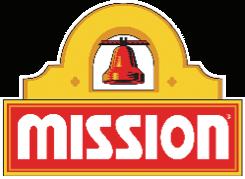

Mancini Sales and Marketing and our valued manufacturers congratulate Albertson’s Companies being named “Retailer of the Year“ and Bob Miller being inducted into the Food Industry Hall of Fame





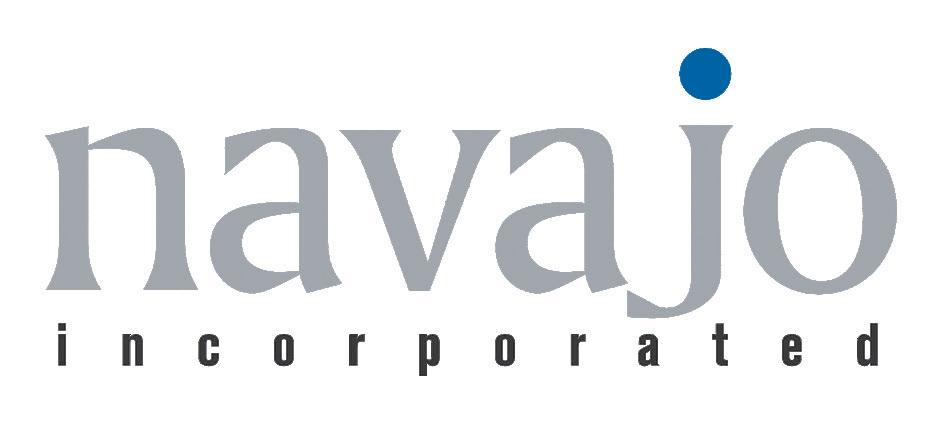

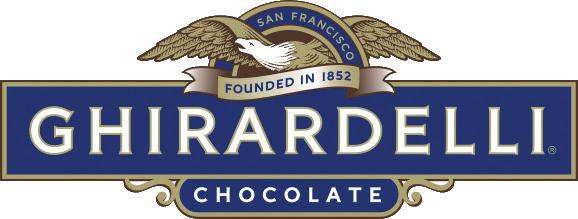
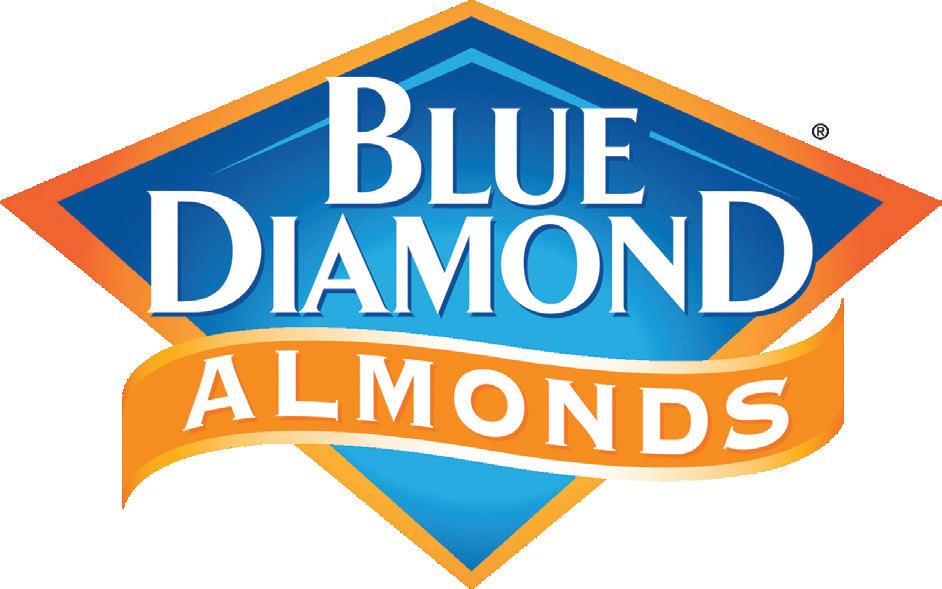
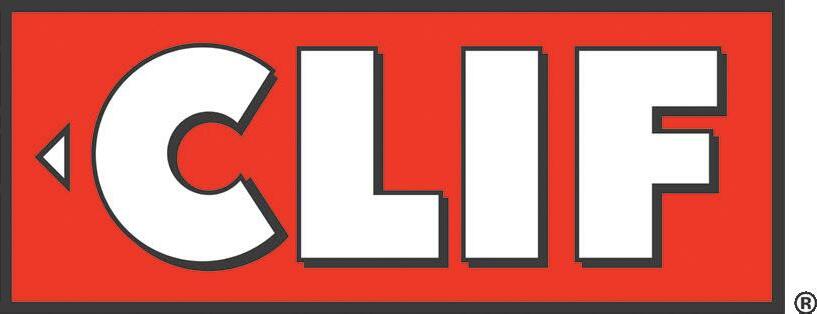



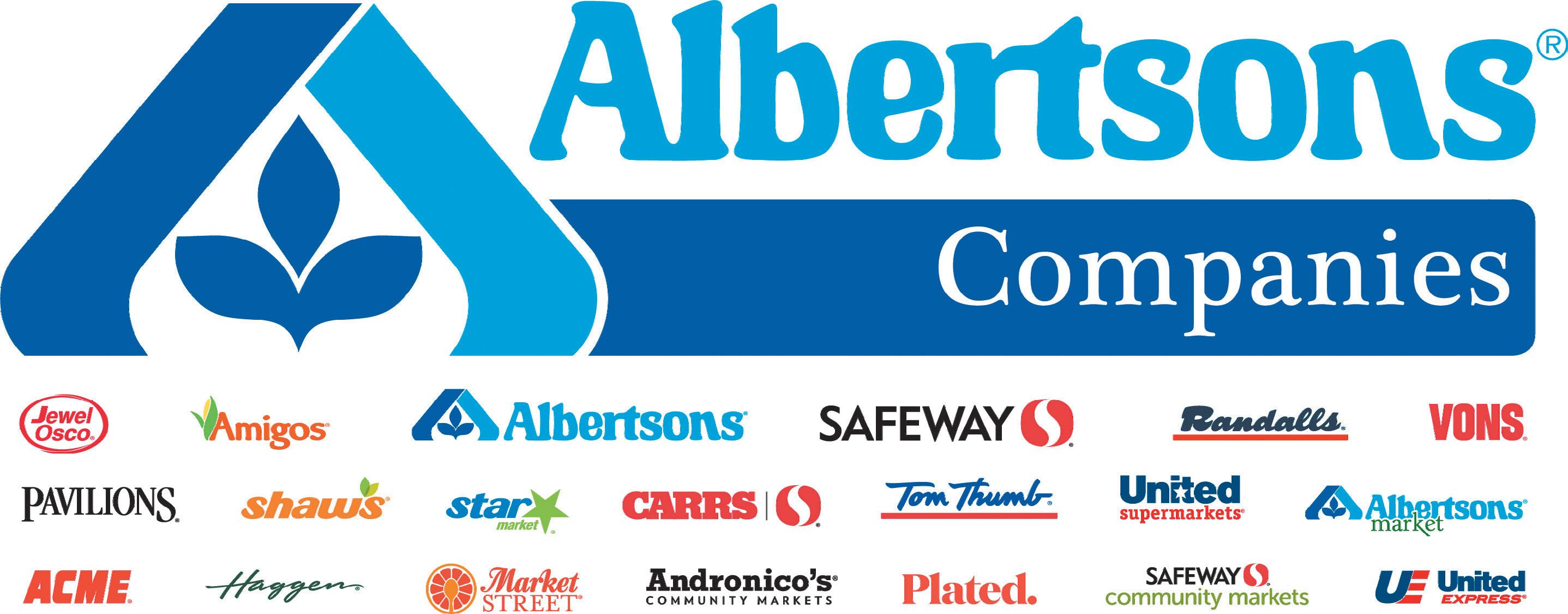


It has been our honor and privilege to be your business partner for the past 57 years.
From page 66
we have grown into a solid regional supermarket chain with growing sales. I believe we can be successful again.”
He was right.
The company has grown from a low of about 200 stores to nearly 2,300 in 35 states and the District of Columbia. It has grown primarily through acquisition in recent years, the biggest being the acquisition of Safeway—where Joe Albertson started his career—that was completed Jan. 30, 2015.
“This is a transformative day for both Albertsons and Safeway,” Miller said. “This merger creates a unified, strong organization that is dedicated to bringing a better shopping experience to more customers across the country. Our combined geographic footprint, vast range of brands and products, and service-oriented staff

will enable us to meet evolving shopping preferences.” The merger created a company with 2,230 stores, 27 distribution facilities, 19 manufacturing plants and more than 250,000 employees.
As Miller explained in his interview for this article, integrating the Safeway stores into the Albertsons organization in terms of store systems and physical plants has been a capital- and labor-intensive process that just came to a conclusion in September. Concurrently, Miller decided to become chairman only, giving Jim Donald—who had been serving in the president and COO role since March—the CEO job. Another “distraction” was removed from Albertsons in August when it and Rite Aid Corp. mutually agreed to end their merger efforts, despite the cost synergies and revenue opportunities that were expected from the combination.
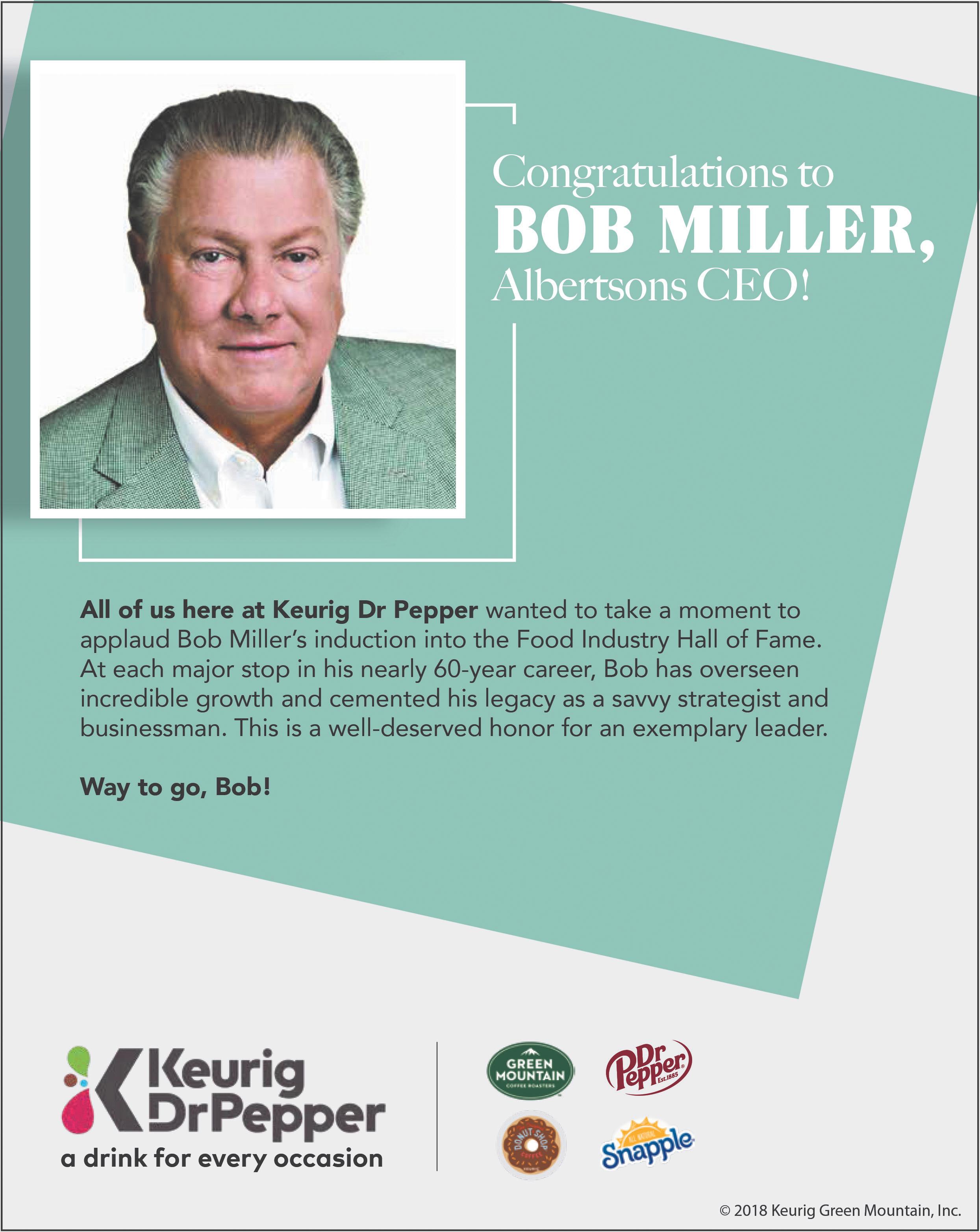
So, Albertsons is hitting on all cylinders now, Miller believes.
The company plans to continue to grow through both acquisition and new store openings.
Miller says prototype stores are planned across the company’s markets. Most will resemble the Market Street format that Albertsons gained when it purchased the United Family of Stores in Texas in 2013 (see an example on page 74). These stores have a strong foodservice component, strong perishables and focus on service.
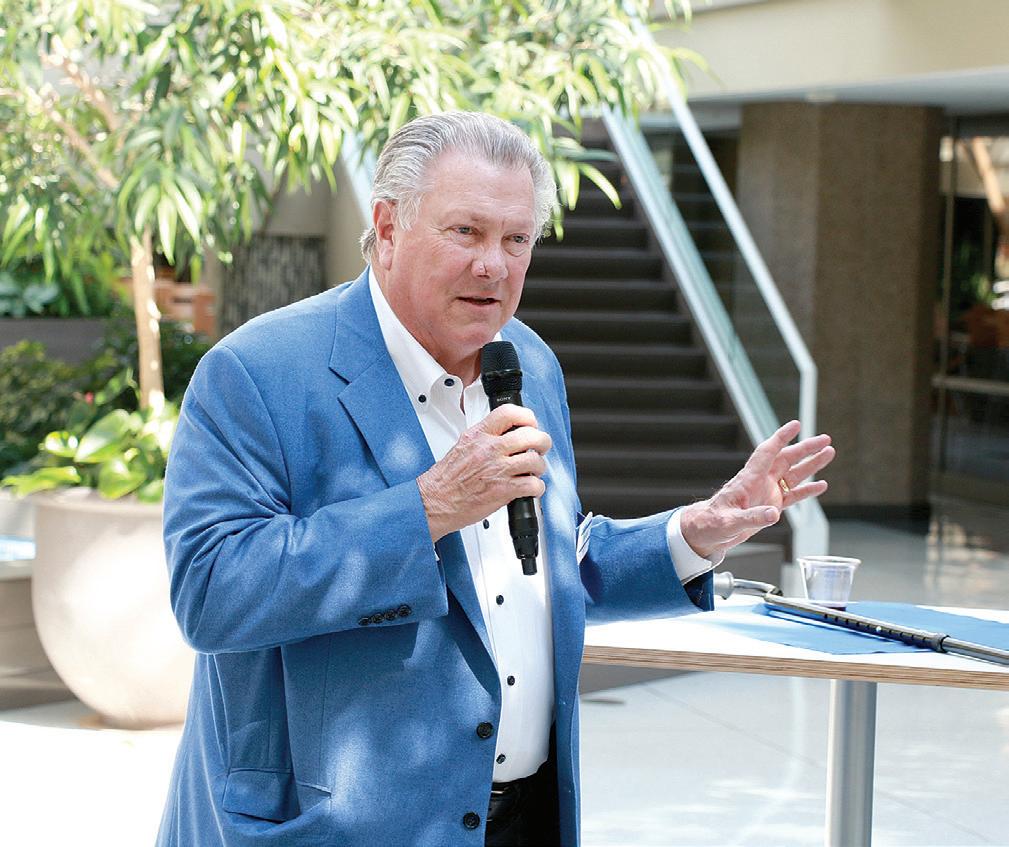
Albertsons also is expending capital and manpower around how to improve the checkout process in its stores, recognizing that it needs to be faster and more efficient.
While its e-commerce grew 108 percent year-over-year in the first quarter and 113 percent YoY in the second quarter, the chain continues to focus on how to do that part of its business better, Miller says.
It’s making sure its Own Brands product lines are a focus, adding more than 1,100 new items this year.
It’s fine-tuning its hiring and training processes to improve turnover and employee satisfaction, too.
All this, in addition to making sure to support its communities through the Albertsons Cos. Foundation, which in 2017 alone gave $300 million toward hunger relief, education, cancer research and treatment, programs for people with disabilities and veterans outreach in the communities where its stores operate.
“The operational improvements we are making to meet our customers’ needs are driving our improved results,” Albertsons said in August when announcing the Rite Aid deal’s end. “We are confident that our 275,000 dedicated employees will continue to execute on our business plan to enhance our customers’ experiences and lead the grocery industry with new innovations.”
Please see page 74
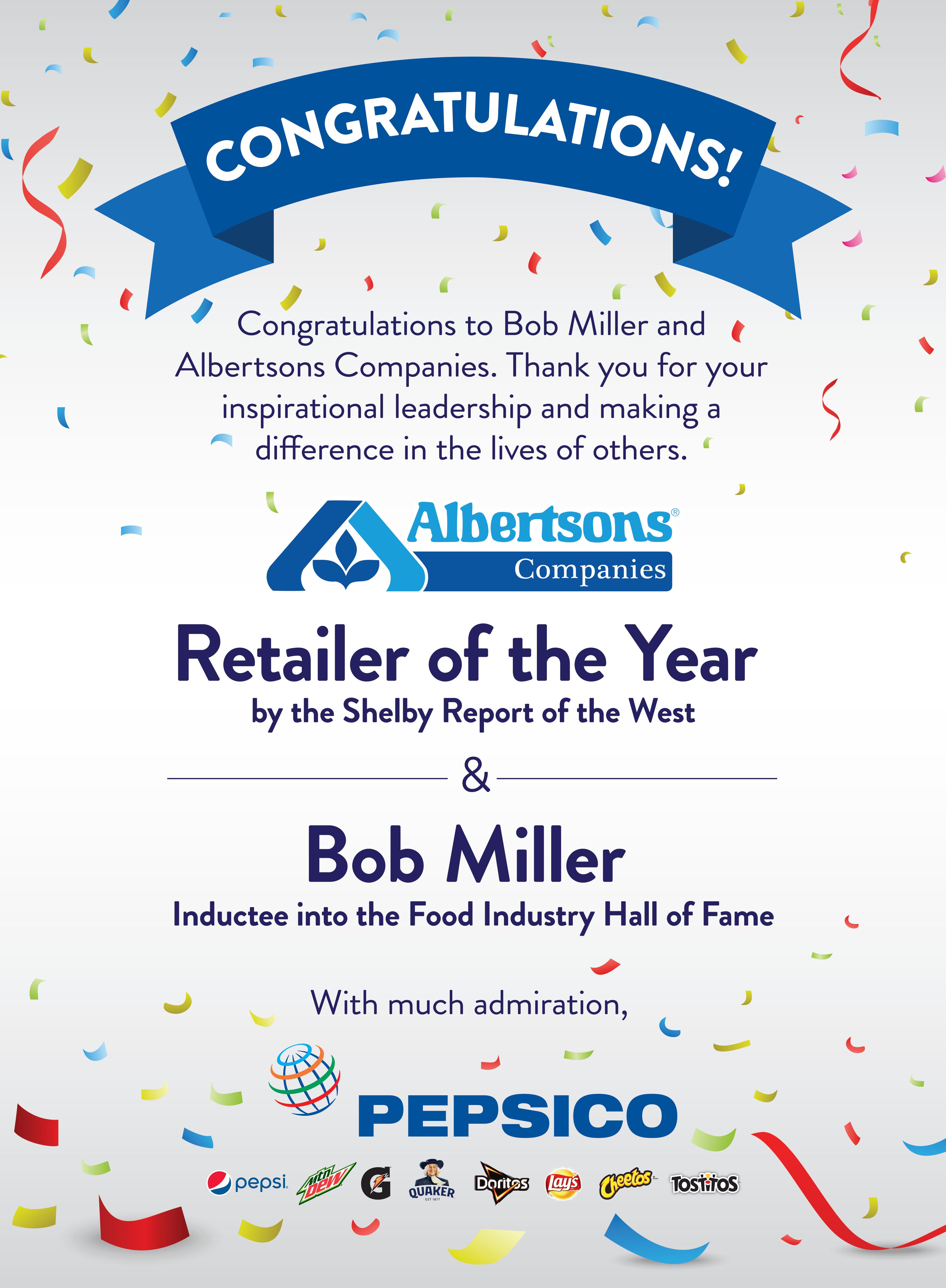
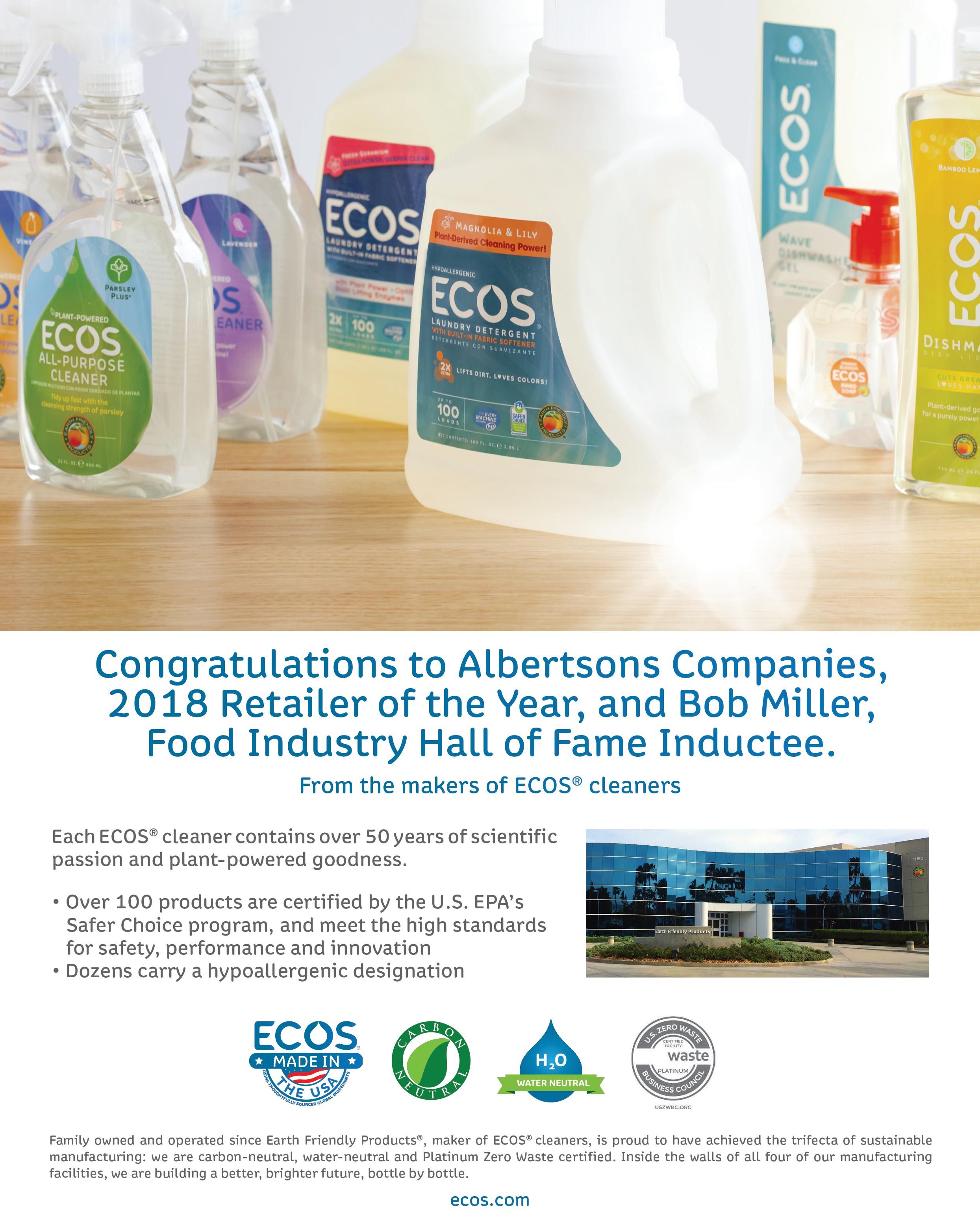

Albertsons Cos. has launched its online marketplace, moreforu.com, powered by Mirakl, a global marketplace solutions provider.
The marketplace will offer customers the ability to discover more specialty food items alongside beauty and wellness products from a network of third-party sellers. With a focus on natural, organic, ethnic and alternative products, Albertsons aims to provide a unique experience that showcases hard-to-find products.
The launch of the marketplace is a central part of Albertsons’ initiative to “accelerate its ability to address trending markets and offer hot new products,” the company says. The data collected from the marketplace will help identify shifting consumer interests, regionally specific shopping needs and new food trends, allow-
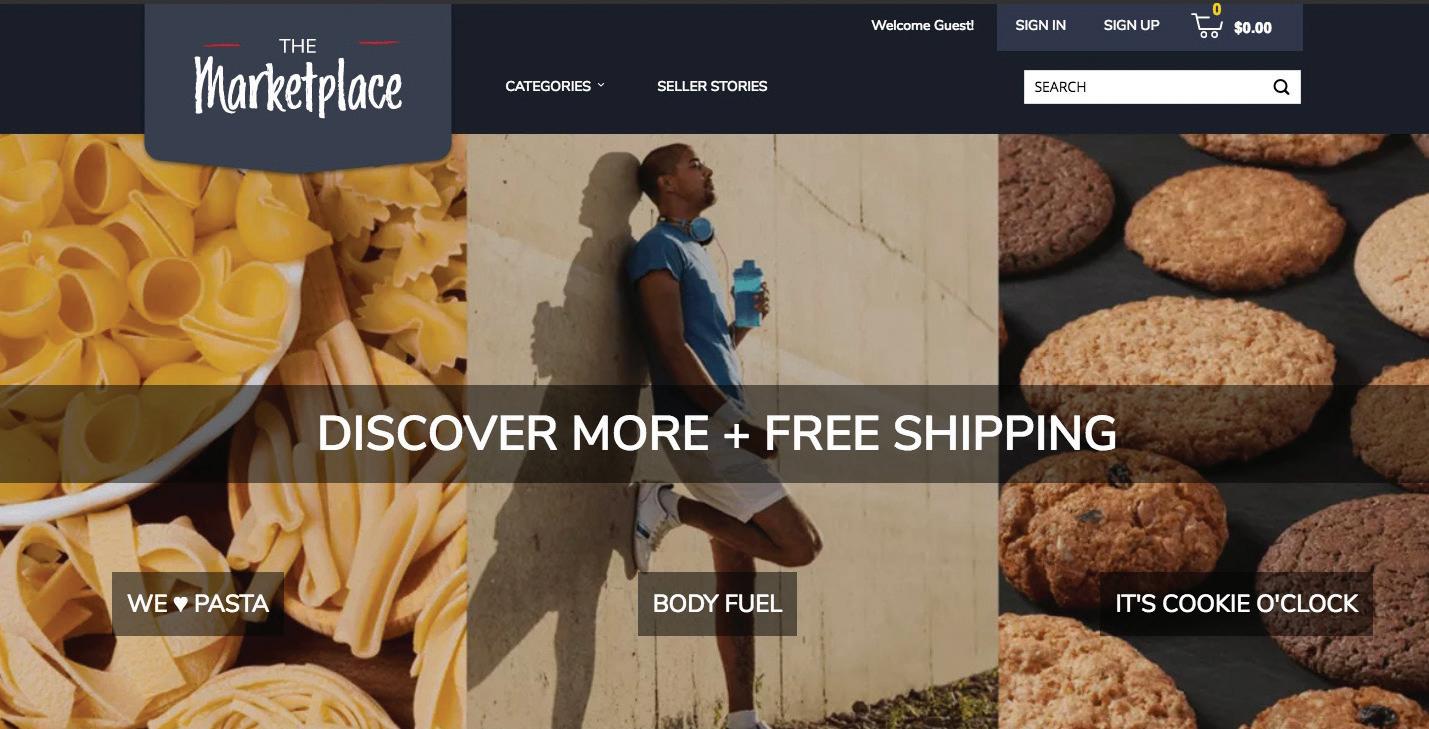
ing the retailer to identify new customer needs and rapidly respond by adding assortment from its network of sellers.
For vendors, this new platform introduces a digital onboarding experience that offers fast access to Albertsons’ customer base. This allows smaller businesses to showcase their products on a wider scale than they could have achieved alone. The proprietary data gathered from the site will not only help Albertsons Cos. evaluate what innovative products to stock in the stores, but also give vendors insight into regions where they may consider investing in building distribution.
“At Albertsons Cos., we’re making rapid strides to build digital capabilities that serve our customers and show our determination to play a prominent role in the digital food and wellness ecosystem,” said Narayan Iyengar, SVP of digital marketing and e-commerce. “The online marketplace provides our customers access to hardto-find items, increases exposure for partner products, and gives us critical data regarding demand for emerging food and wellness trends. We selected Mirakl for its superior technology and marketplace expertise. The Mirakl team, and McFadyen Digital’s team, have been instrumental in achieving our launch goals.”
“By choosing the online marketplace model, Albertsons Cos. is truly distinguishing itself from the competition, and Mirakl is honored to be working alongside Albertsons on this journey,” said Adrien Nussenbaum, co-founder and U.S. CEO of Mirakl.



Where Albertsons Cos. finds itself now is especially satisfying for those executives who have been with Albertsons since the days when it was building from that base of neglected stores.
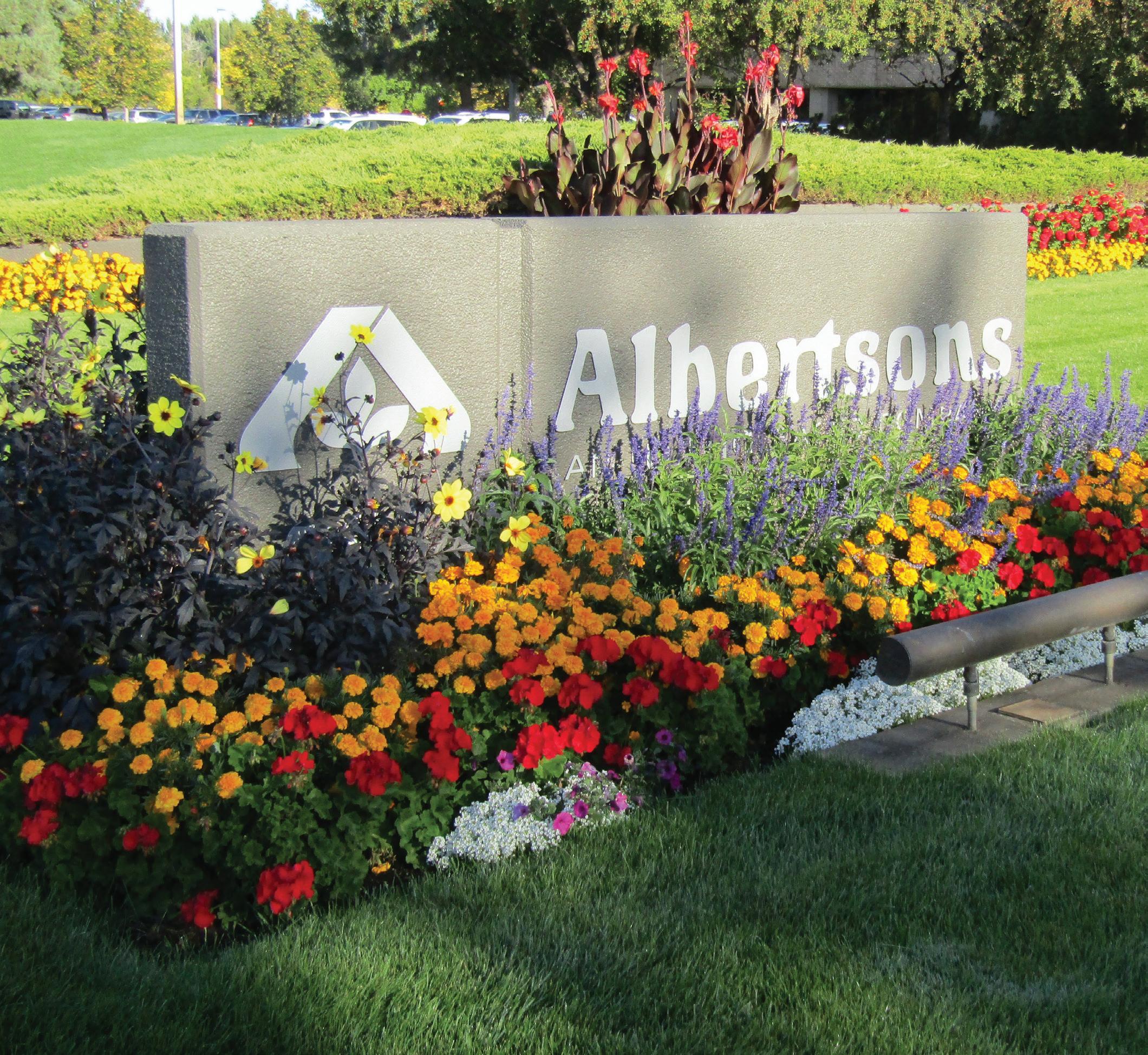

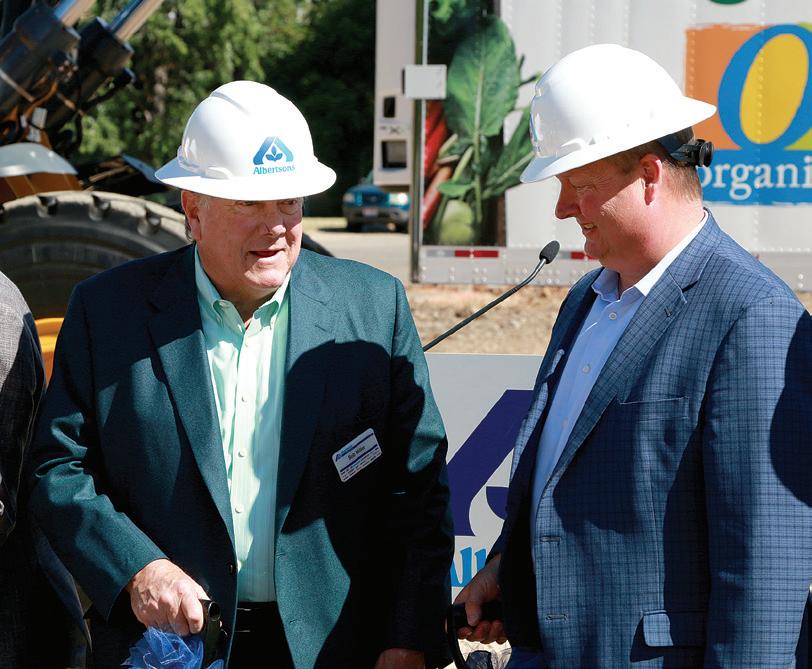

Mike Withers, EVP of retail operations, says Miller was key in creating that strong foundation from which to grow.

“There’s no way in hell we would have made it without Bob’s leadership; the odds were stacked against us,” Withers says.
“When we came together with the old company (from Supervalu), the naysayers were saying that’s not going to work, it’ll never work. With Safeway, they said it’s not going to work, it’ll never work. Well, guess what? It’s working. Our future’s bright; it’s been a great run for all of us.
“There’s no way we’d be here were it not for Bob—his vision and his commitment to not going from ditch to ditch, not changing course. We’ve stayed pretty true to what brought us to the dance and what’s going to take us home.”
Susan Morris, EVP and chief operations officer, remembers the days of the “non-core stores that nobody thought were going to succeed. They called them ‘Albertsons AARP’ and ‘Late Last Century’—that’s what the LLC stood for. There were just a lot of derogatory remarks—just tough times.”
But Miller had a plan. He “handpicked every single one of the leaders he brought in to help run the company,” she said, and “the magic of bringing those guys together—even though they thought it was short term—they couldn’t help themselves. And, under Bob’s leadership, under his vision, they couldn’t help themselves but run really great stores and drive incredible amounts of sales. The culture matters.”
Morris says that the Albertsons culture is diversifying to include more women and minorities, which is important for any business that directly deals with the public, she says.
“You need to make sure that your team, your leadership, truly reflects the customers you are trying to serve,” Morris says. “And we have an opportunity there. What I’m proud of is while we’re not where we want to be yet, we’re making great gains.”
“We are confident that our 275,000 dedicated employees will continue to execute on our business plan to enhance our customers’ experiences and lead the grocery industry with new innovations.”
Albertsons Cos., August 2018